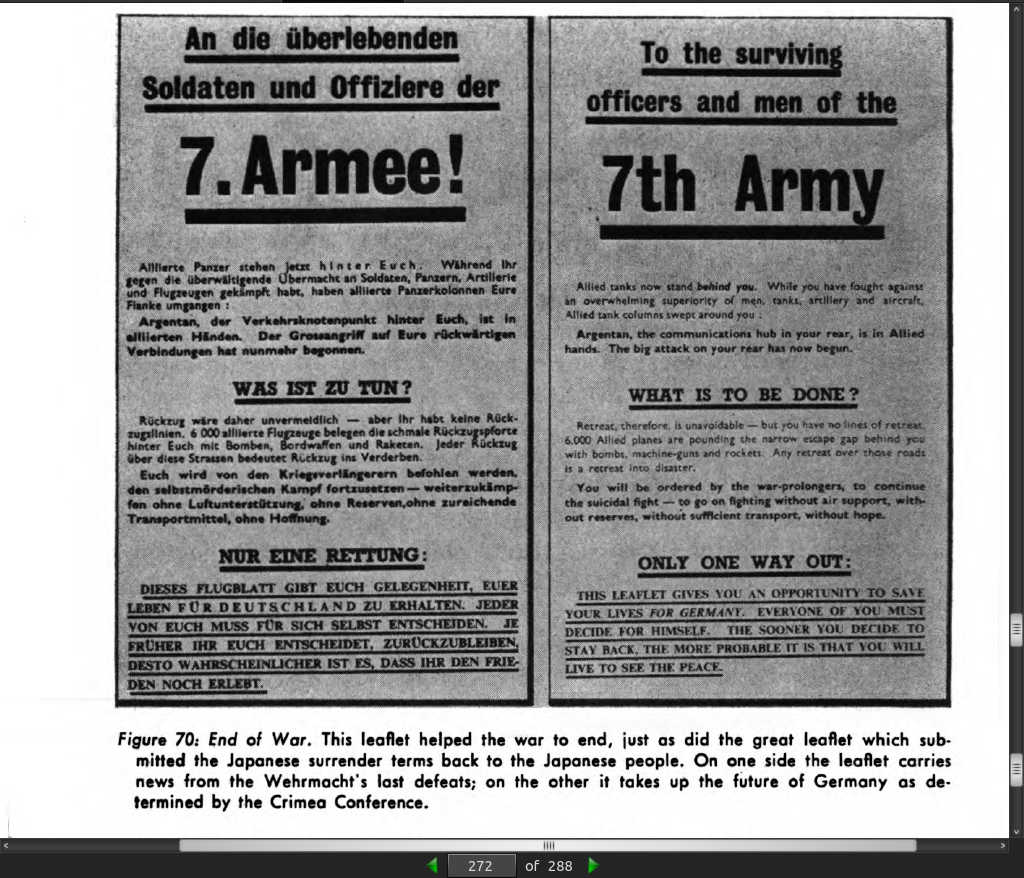Home · Book Reports · 2017 · Psychological Warfare

- Author :: Paul Myron Anthony Linebarger
- Publication Year :: 1948
- Read Date :: 2017-08-08
- Source :: Psychological_warfare.pdf
designates my notes. / designates important.
Thoughts
Education is an extremely effective, albeit slow, method of propaganda to capture a population.
Money as propaganda. Captured notes can be printed on and redeployed. Counterfeit notes can be employed similarly and to weaken enemy economies.
Propaganda must be true. If you outright lie the enemy will be able to tear you apart with counter-propaganda. When you have no truth that can be used as a weapon, remain silent.
Consider your target sympathetically. How can you appeal to them through their beliefs? Telling them they are dogs would only steel their conviction while methodically explaining how their livelihood is eroding under rations and curfews will hit home.
Avoid “trash talking”. While analyzing enemy propaganda it is easy to fall into the habit of taking things personally. If you lash out at the enemy propagandist you are missing you true target, the enemy population.
Remember that much of the population won’t be tuning in to your broadcasts or reading all of your pamphlets. While the message may seem tired to you, it will often be the first time the enemy population is exposed to it. Repetition drilling home one point is better than a plethora of points that never reach critical mass in the enemy’s camp.
Coordinate your propaganda with other events that may be taking place. Piggy-back onto prominent topics.
Know who and where you are targeting. It would do no good to deliver a message that would not reach an appropriate audience. Internet forums like 4chan should be approached differently than a suburban neighborhood.
· Books referenced that may be of interest
-
Subversive and clandestine pro-Confederate propaganda in the North is outlined in George Port Milton’s engrossing Abraham Lincoln and the Fifth Column, New York and Washington, D. C., 1942. but no comparable study covering all forms of propaganda on either side is yet available.
-
The general history of psychology is described in readable terms in Gregory Zilboorg and George W. Henry,A History of Medical Psychology, New York, 1941, and in Lowell S. Selling, Men Against Madness, New .York, 1940, cheap edition, 1942.)
Exceptional Experts
- "Non-violent persuation
- "Educate, agitate, regulate
- "Media as an instrument
- "Speak the enemy's language
- "Assault on vocabulary
- "Use existing media
- "Birth of the OSS
- "Good propaganda is true
- "News as a weapon
- "Counterfeit currency
- "Use motion pictures
- "Create domestic confusion
- "National morale counters propaganda
- "Shocked into passivity
Table of Contents
- Chapter 1: Historic Examples of Psychological Warfare
- Chapter 2: The Function of Psychological Warfare
- Chapter 3: Definition of Psychological Warfare
- Chapter 4: The Limitations of Psychological Warfare
- Chapter 5: Psychological Warfare in World War I
- Chapter 6: Psychological Warfare in World War II
- Chapter 7: Propaganda Analysis
- Chapter 8: Propaganda Intelligence
- Chapter 9: Estimate of the Situation
- Chapter 10: Organization for Psychological Warfare
- Chapter 11: Plans and Planning
- Chapter 12: Operations for Civilians
- Chapter 13: Operations Against Troops
- Chapter 14: Psychological Readiness and Disarmament
- Page numbers listed are from the pdf. For actual page numbers, subtract 22.
page 17:
-
This book is the product of experience rather than research, of consultation rather than reading. It is based on my five years of work, both as civilian expert and as Army officer, in American psychological war fare facilities — at every level from the Joint and Combined Chiefs of Staff planning phase down to the preparing of spot leaflets for the American forces in China.
-
There is no better way to learn the propaganda job than to be whipped thoroughly by someone else’s propaganda.
· PART ONE: DEFINITION AND HISTORY
· Chapter 1: Historic Examples of Psychological Warfare
page 23:
-
…it [psychological warfare] is not controlled by the laws, usages, and customs of war…
-
Psychological warfare, by the nature of its instruments and its mission, begins long before the declaration of war. Psychological warfare continues after overt hostilities have stopped. The enemy often avoids identifying himself in psychological warfare; much of the time, he is disguised as the voice of home, of God, of the church, of the friendly press.
page 24:
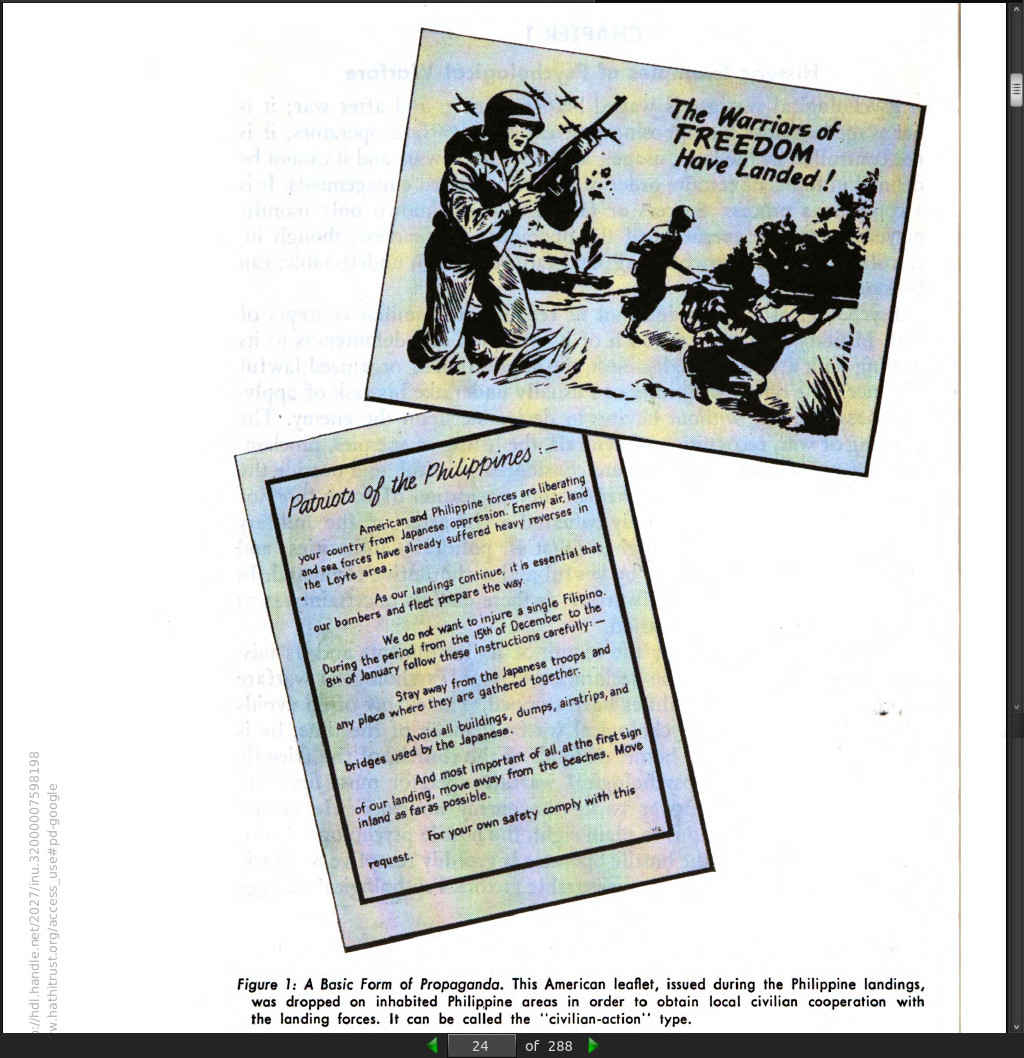
page 25:
-
Some of the sociologists and anthropologists, such as Karl Mannheim, Max Weber, Talcott Parsons, Geoffrey Gorer, Ruth Benedict (to mention a few at random) have presented approaches which would justify re- evaluations of history in a way useful to propaganda students; but they have not yet persuaded the historians to do the work.
-
A history of propaganda would provide not only a new light on many otherwise odd or trivial historical events; it would throw genuine illumination on the process of history itself.
page 26:
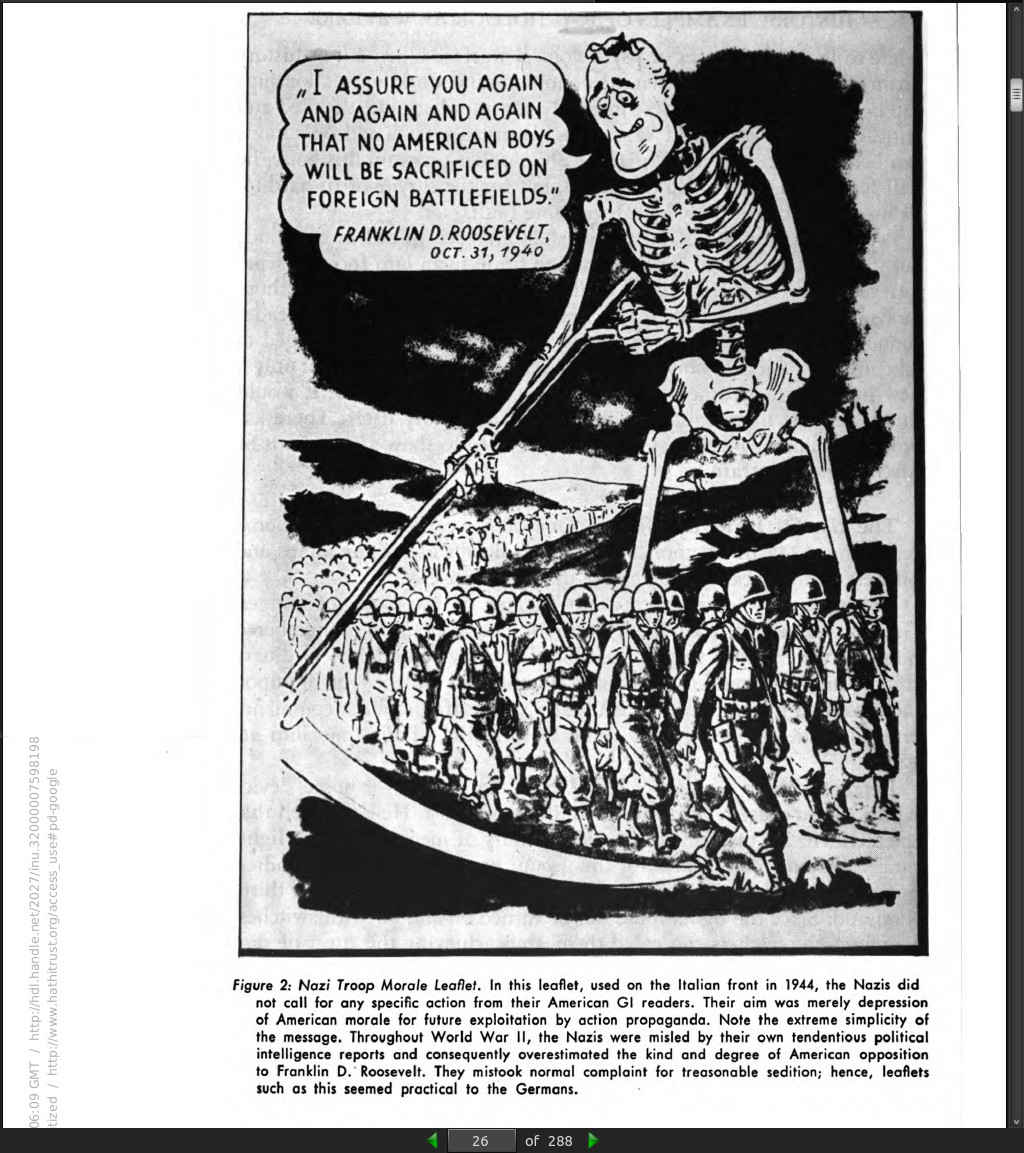
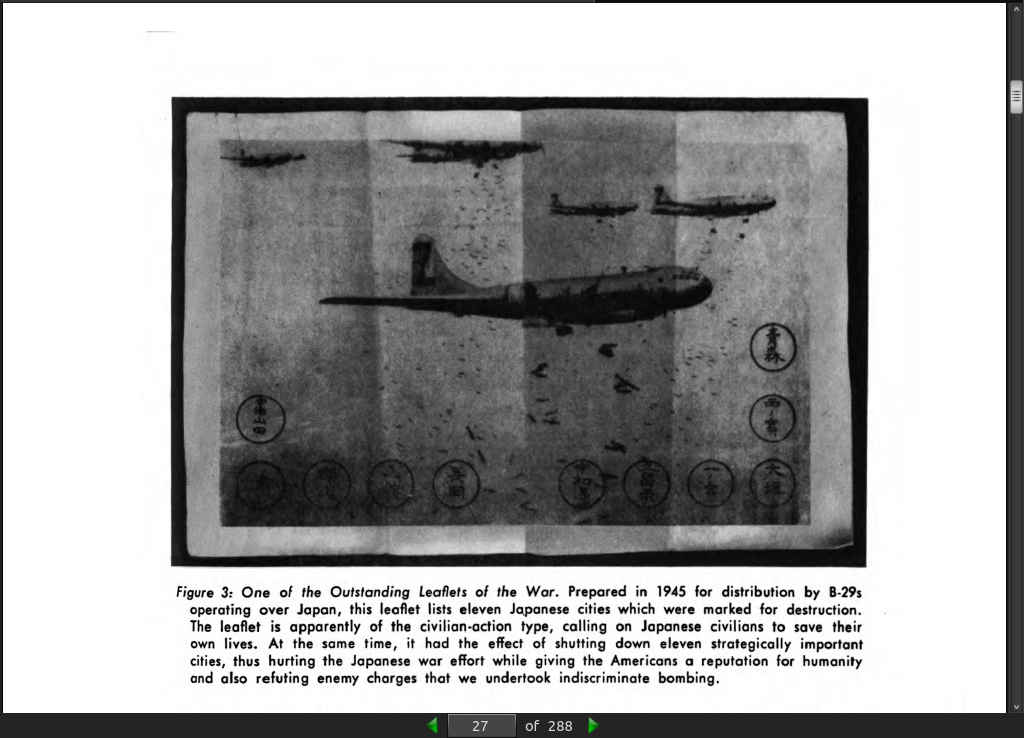
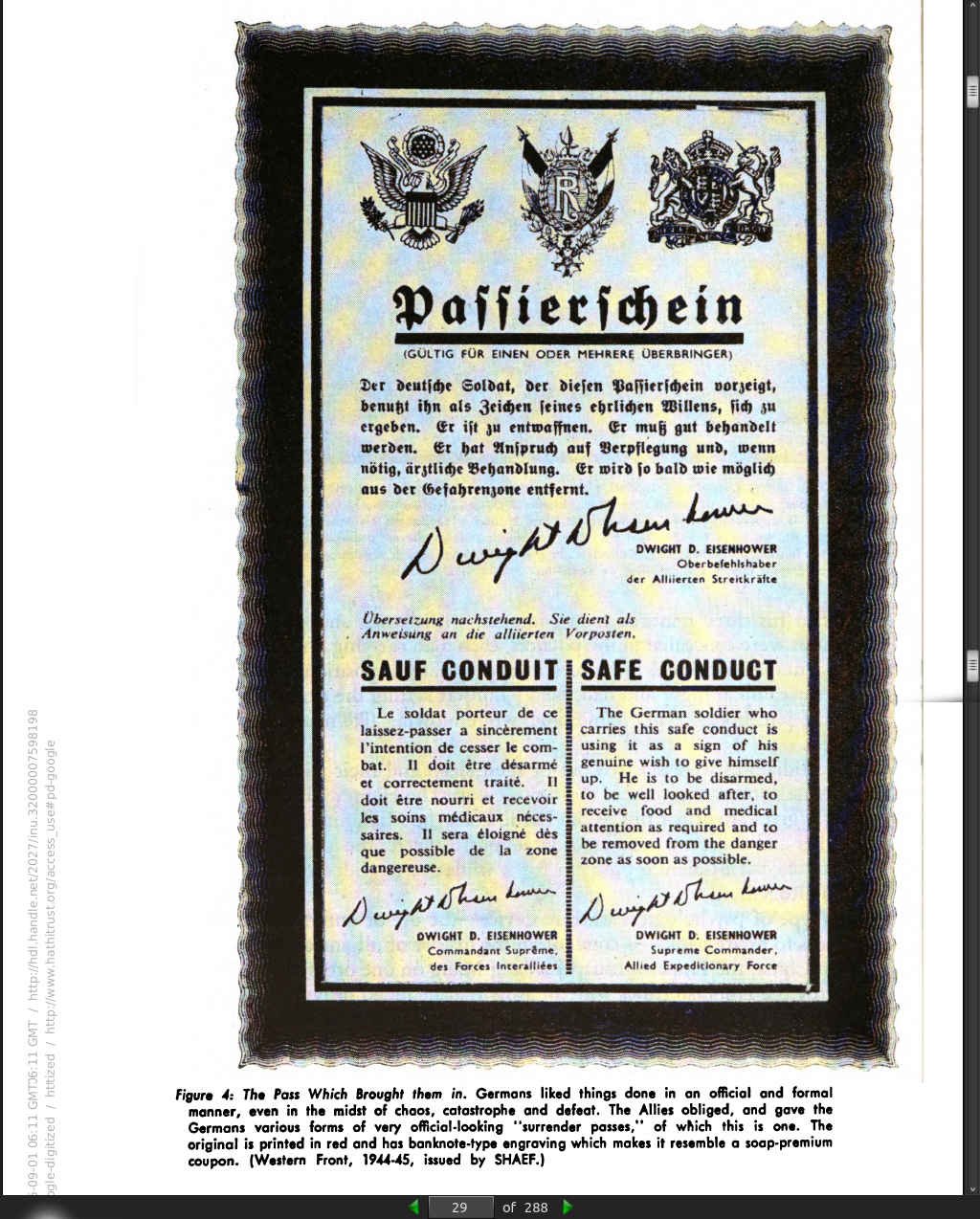
page 29:
-
…the propagandist tries to see things from the viewpoint of his audience.
-
Herodotus, the Greek historian:
Themistocles, having selected the best sailing ships of the Athenians, went to the place where there was water fit for drinking, and engraved upon the stones inscriptions, which the Ionians, upon arriving the next day at Artemisium, read. The inscriptions were to this effect, ‘Men of Ionia, you do wrong in" fighting against your fathers and helping to enslave Greece. Rather, therefore, come over to us or if you cannot do that, withdraw your forces from the contest and entreat the Carians to do the same. But if neither of these things is possible, and you are bound by too strong a necessity, yet in action, when we are engaged, behave ill on purpose, remembering that you are descended from us and that the enmity of the barbarians against us originally sprang from you.’
-
by suggesting that the Ionians should behave badly in combat, he lays the beginning of another line — the propaganda to the Persians, “black” propaganda making the Persians think that any Ionian who was less than perfect was a secret Athenian sympathizer.
-
- naming the specific enemy; 2) appeal to the “better people”; 3) sympathy for the common people; 4) claim of support for the legitimate government; 5) affirmation of one’s own strength and high morale; 6) invocation of unity; 7) appeal to religion.
page 30:
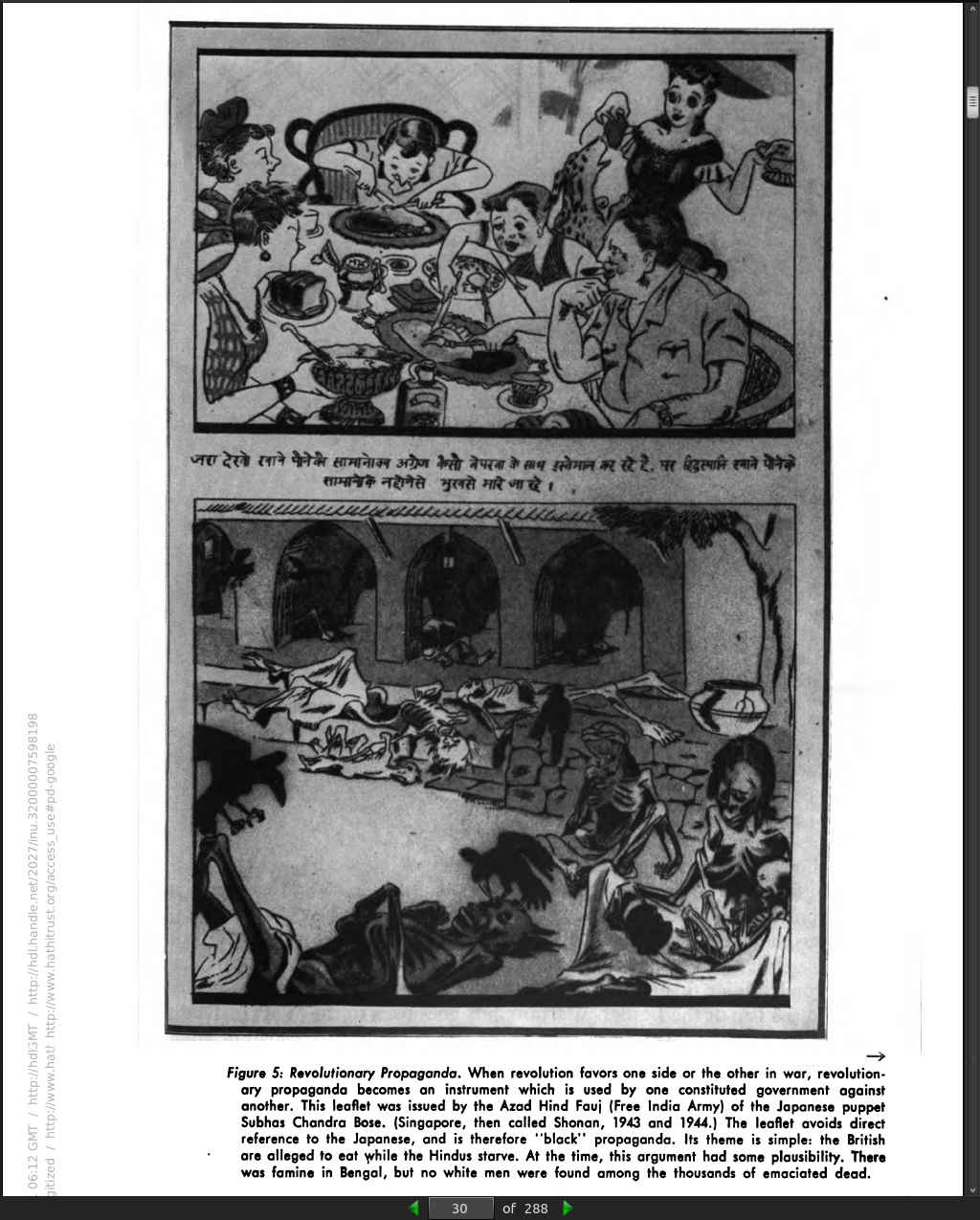
page 32:
- …an increasing emphasis on ideology or political faith (see definition, below) as driving forces behind warfare, rather than the considerations of coldly calculated diplomacy. Wars become more serious, and less gentlemanly; the enemy must be taken into account not merely as a man, but as a fanatic. To the normal group-loyalty of any good soldier to his army, right or wrong, there is added the loyalty to the Ism or the Leader. Warfare thus goes back to the Wars of Faith.
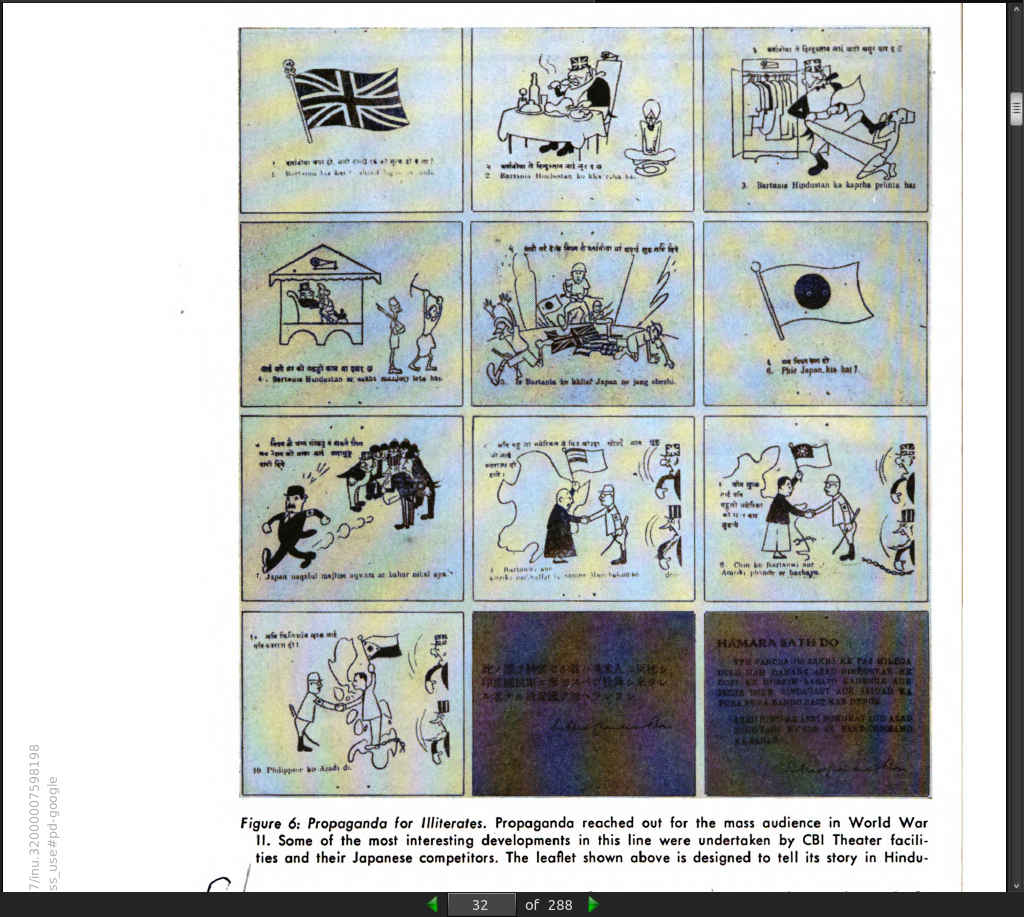
page 33:
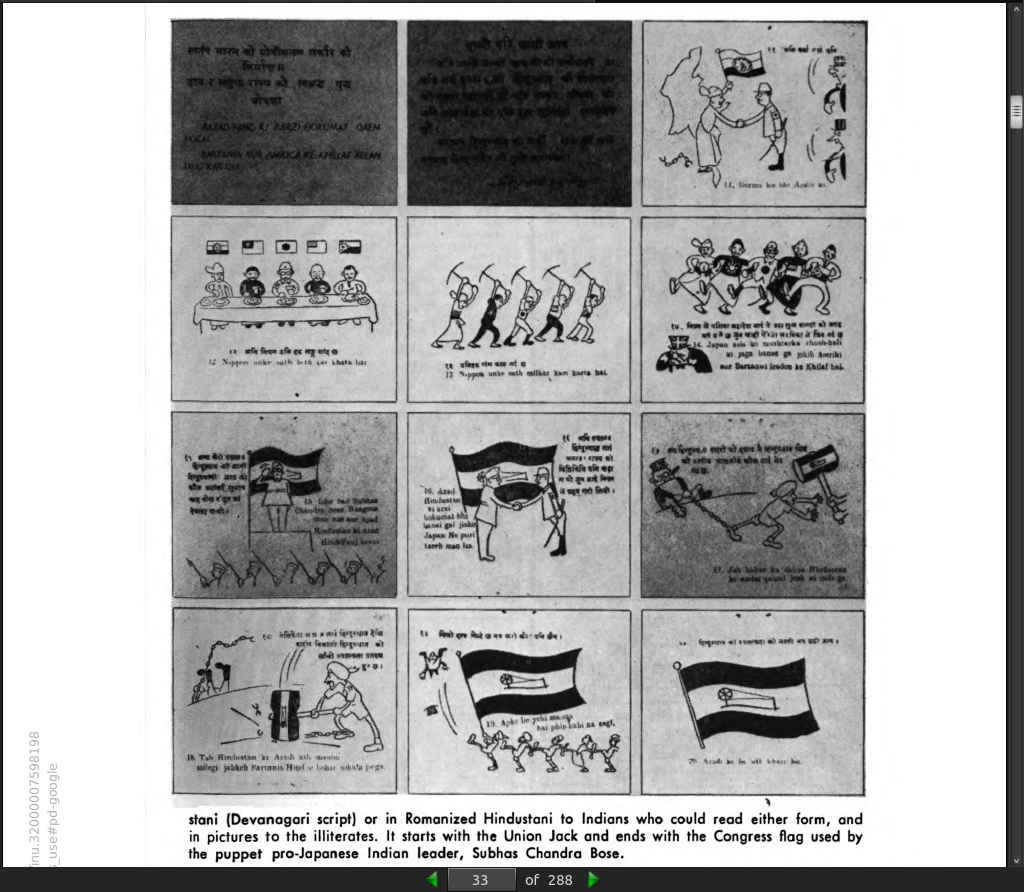
page 34:
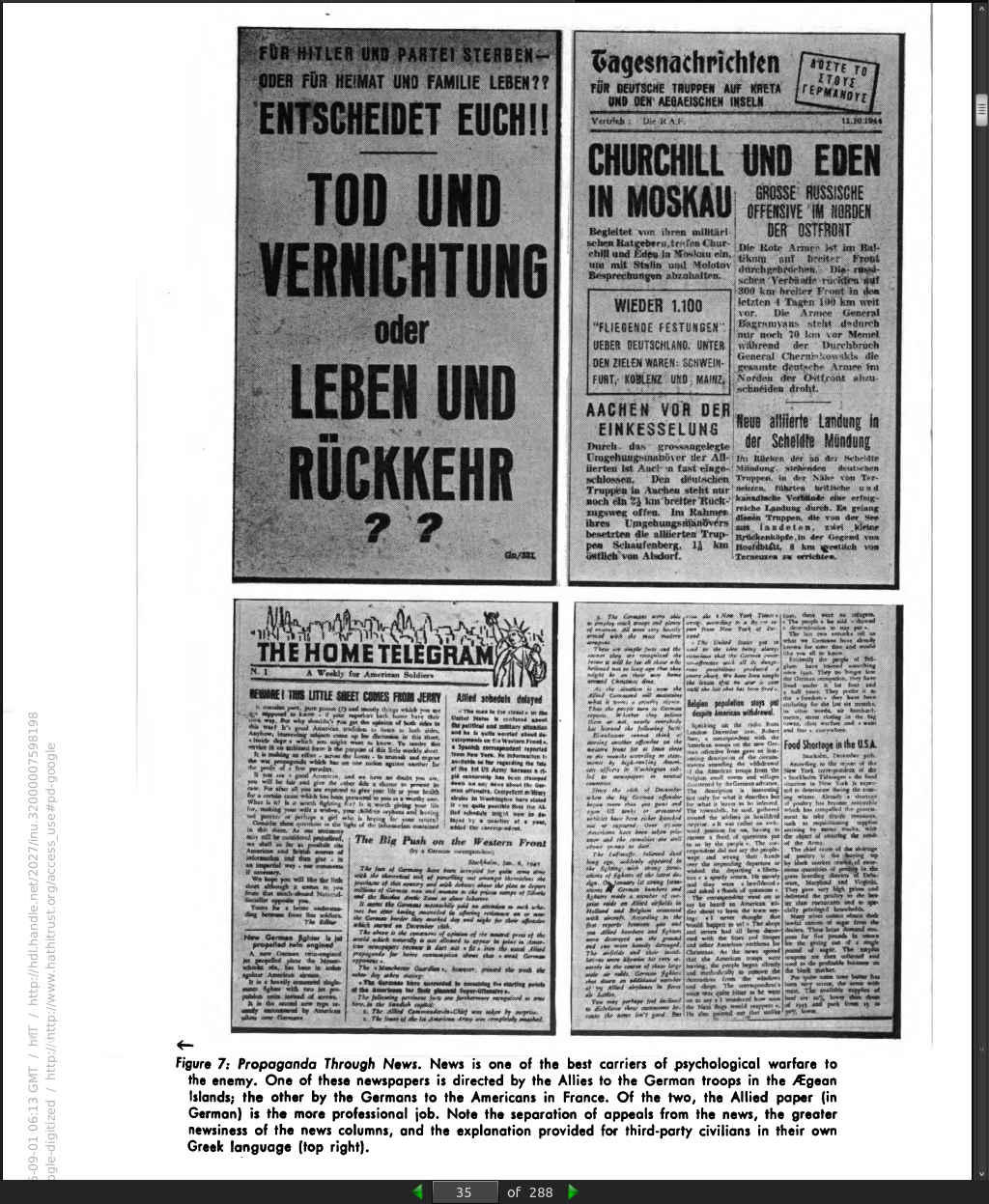
page 35:
-
A people can be converted from one faith to the other if given the’ choice between conversion and extermination, stubborn individuals being rooted out. To effect the initial conversion, participation in the public ceremonies and formal language of the new faith must be required". Sustained counterintelligence must remain on the alert against back sliders, but formal acceptance will become genuine acceptance if_all public media of expression are denied the vanquished faith.
-
If immediate wholesale conversion would require military operations that were too extensive or severe, the same result can be effected by toleration of the objectionable faith, combined with the issuance of genuine privileges to the new, preferred faith. The conquered people are left in the private, humble enjoyment of their old beliefs and folkways; but all participation in public life, whether political, cultural or economic, is conditioned on acceptance of the new faith. In this manner, all up-rising members of the society will move in a few generations over to the new faith in the process of becoming rich, powerful, or learned; what is left of the old faith will be a gutter superstition, posses sing neither power nor majesty.
-
Changing an ideology via introduction of material rewards. This is discussed at length in Cultural Patterns and Technical Change and mentioned as an effective way to combat decentralized organizations in The Starfish and the Spider.
-
If Christians, or democrats, or progressives— whatever free men may be called — are put in a position of underprivilege and shame for their beliefs, and if the door is left open to voluntary conversion, so that anyone who wants to can come over to the winning side, the winning side will sooner or later convert almost everyone who is capable of making trouble.
page 36:
- (In the language of Vilfredo Pareto, this would probably be termed “capture of the rising elite”; in the language of present-day Marxists, this would be described as “utilization of potential leadership cadres from historically superseded classes”; in the language of practical politics, it means “cut in the smart boys from the opposition, so that they can’t set up a racket of their own."
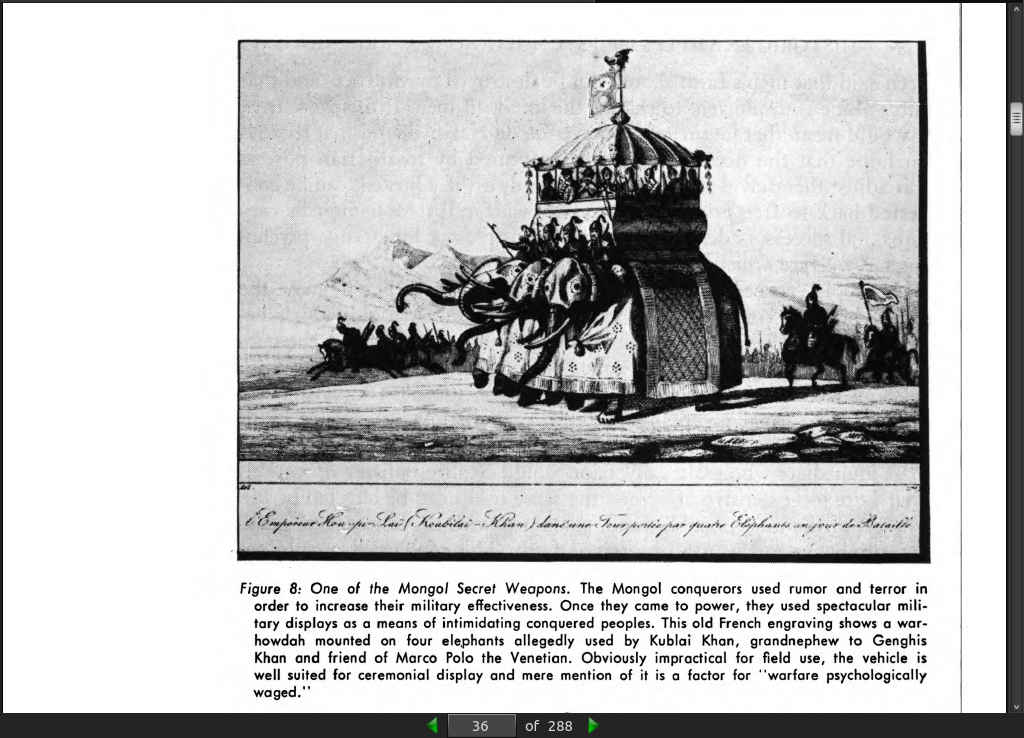
page 37:
-
H.G. Wells’ simple but compelling description of the Mongols in his Outline of History is worth re-reading in this connection.
-
Claims that the Mongols had fewer numbers than originally thought and were much more intelligent in tactics and propaganda to spread rumors of their heightened numbers and ferocity.
page 38:
-
Believers in monarchy could call the English murderous king-killers (a charge as serious in those times as the charge of anarchism or free love in this); believers in order and liberty could call the British slaves of a tyrant.
-
Interesting that anarchism and free love, in the late 1940s was seen as equal to king-killing while today free love is widely accepted.
page 40:
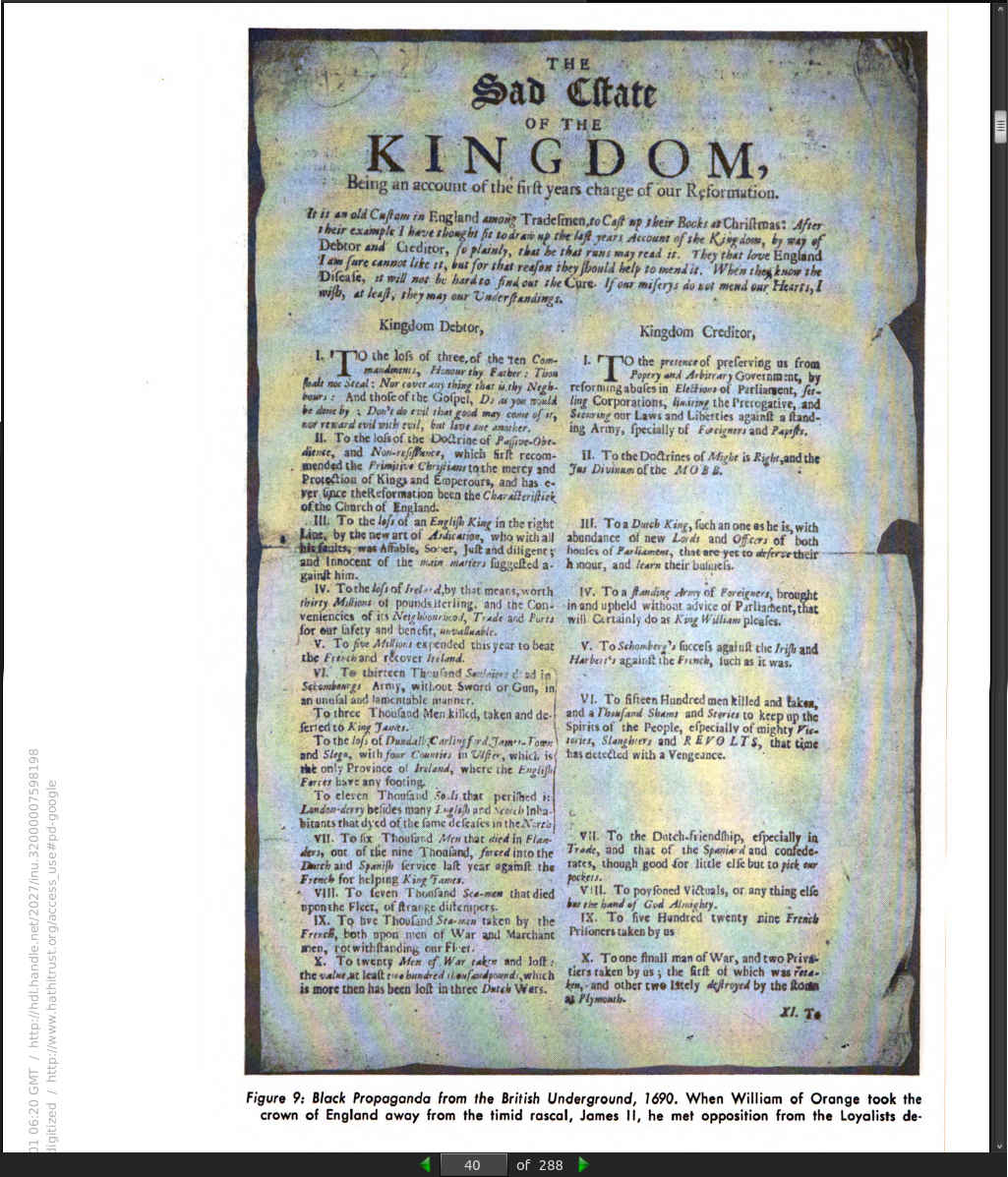
page 41:
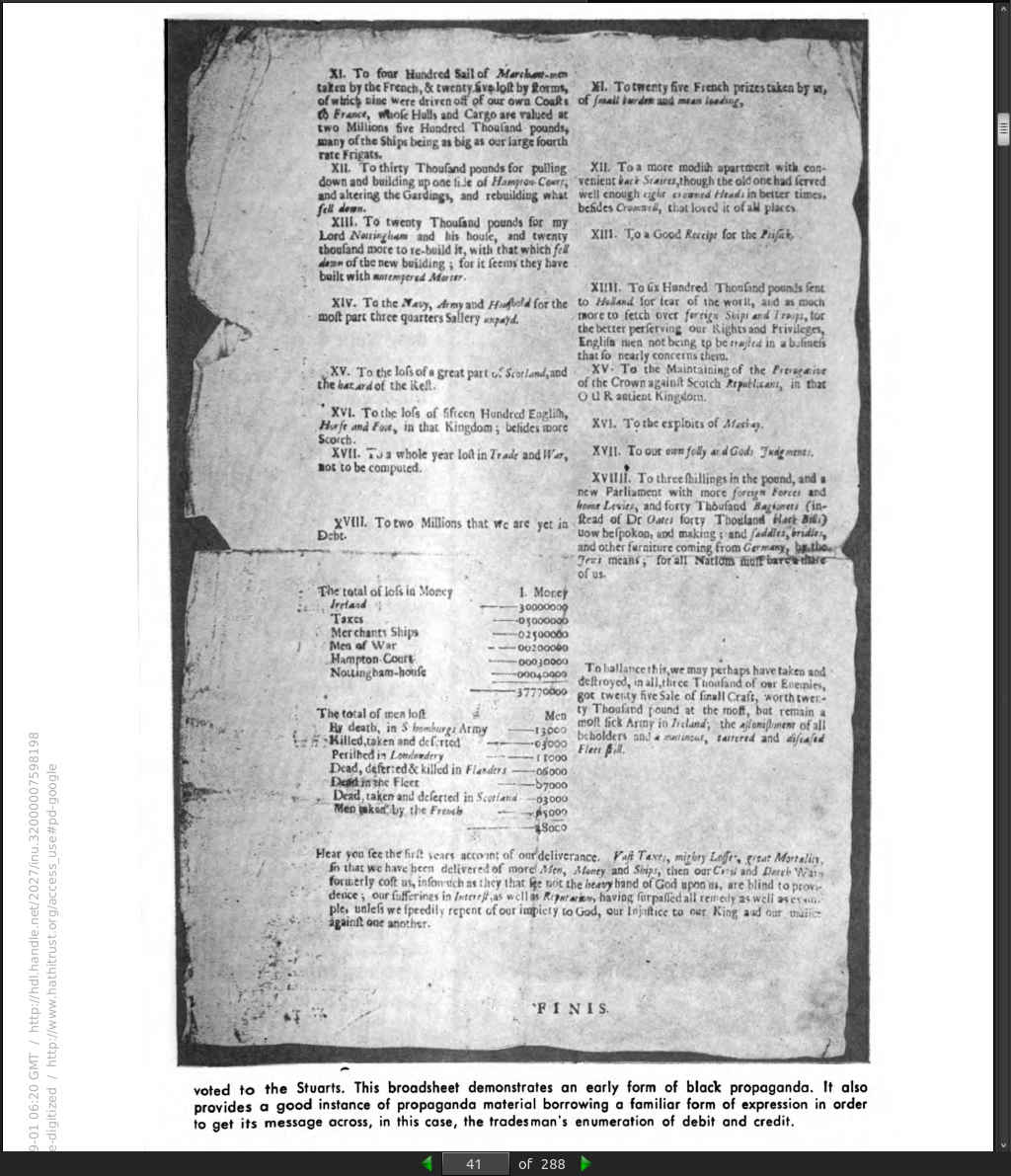
page 42:
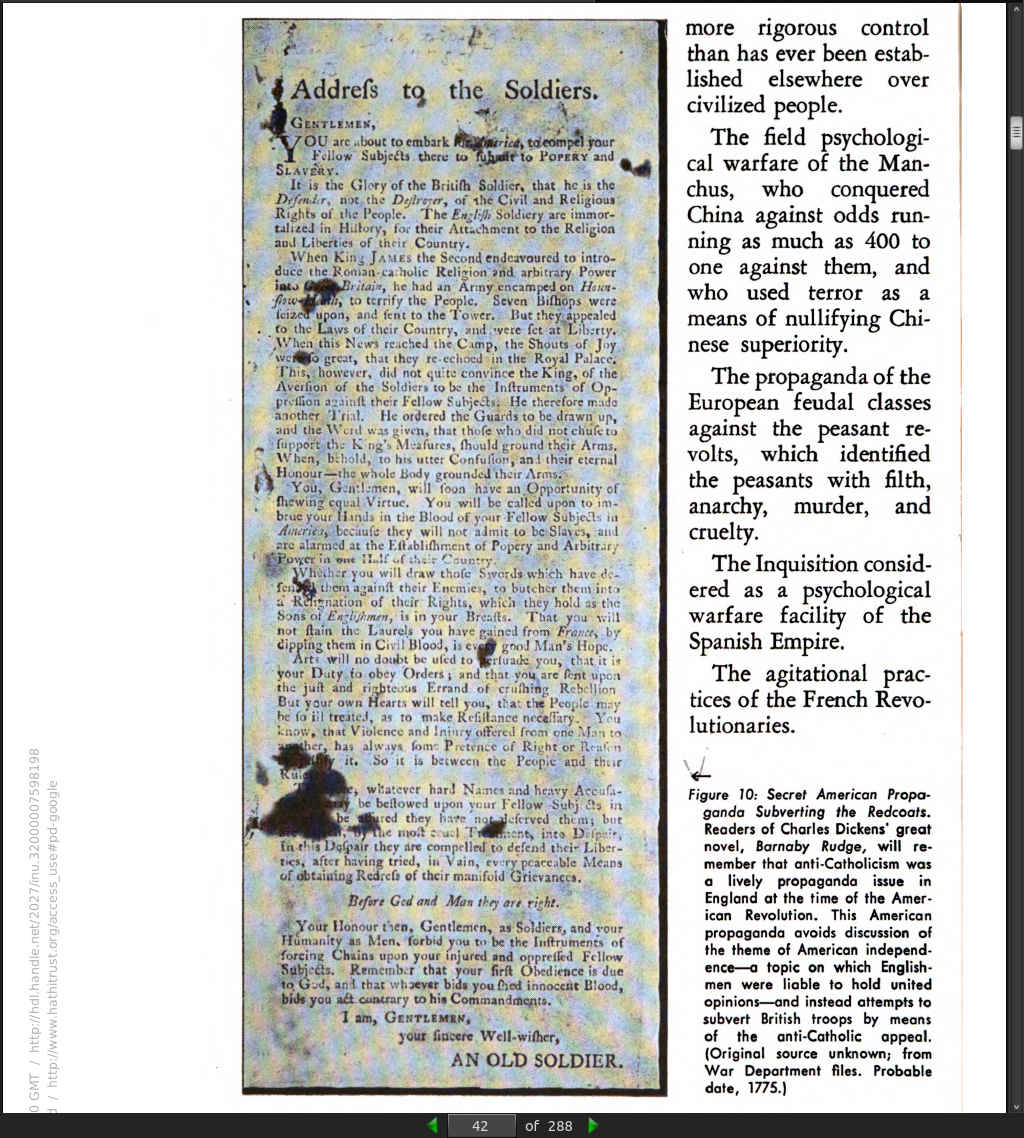
page 43:
-
The Americans made extensive use of the press.9 When the news paper proprietors veered too far to the Loyalist side, they were warned , to keep to a more Patriotic line.
-
9 Philip Davidson’s Propaganda and the American Revolution, Chapel Hill, 1941, is a careful scholarly study of this period. Comparable studies have not yet been written concerning other American wars. Military and civilian historians have a fascinating piece of research awaiting them in the material concerning Confederate and Federal psychological warfare. Each participant in the Civil War was vulnerable to the propaganda of the other. Subversive and clandestine pro-Confederate propaganda in the North is outlined in George Port Milton’s engrossing Abraham Lincoln and the Fifth Column, New York and Washington, D. C., 1942. but no comparable study covering all forms of propaganda on either side is yet available.
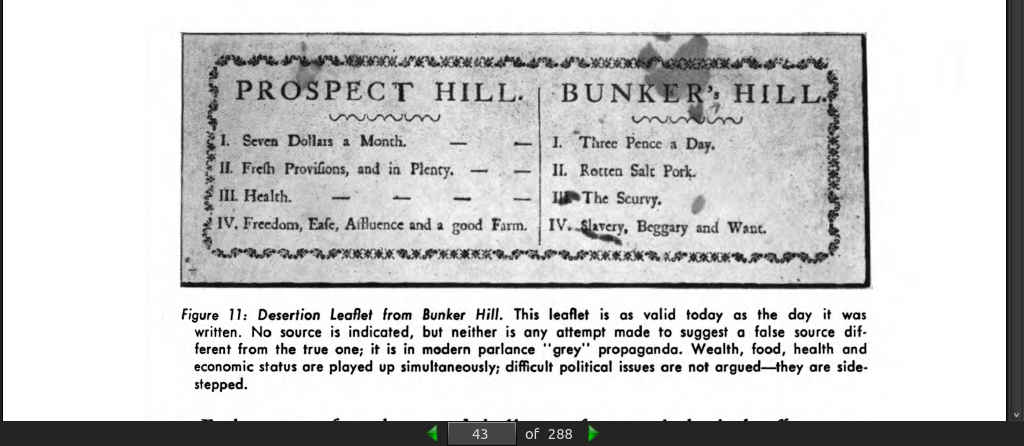
page 45:
- 10 Various new editions of [Thomas] Paine’s chief works are available in popular and inexpensive form They are worth study as good propaganda.
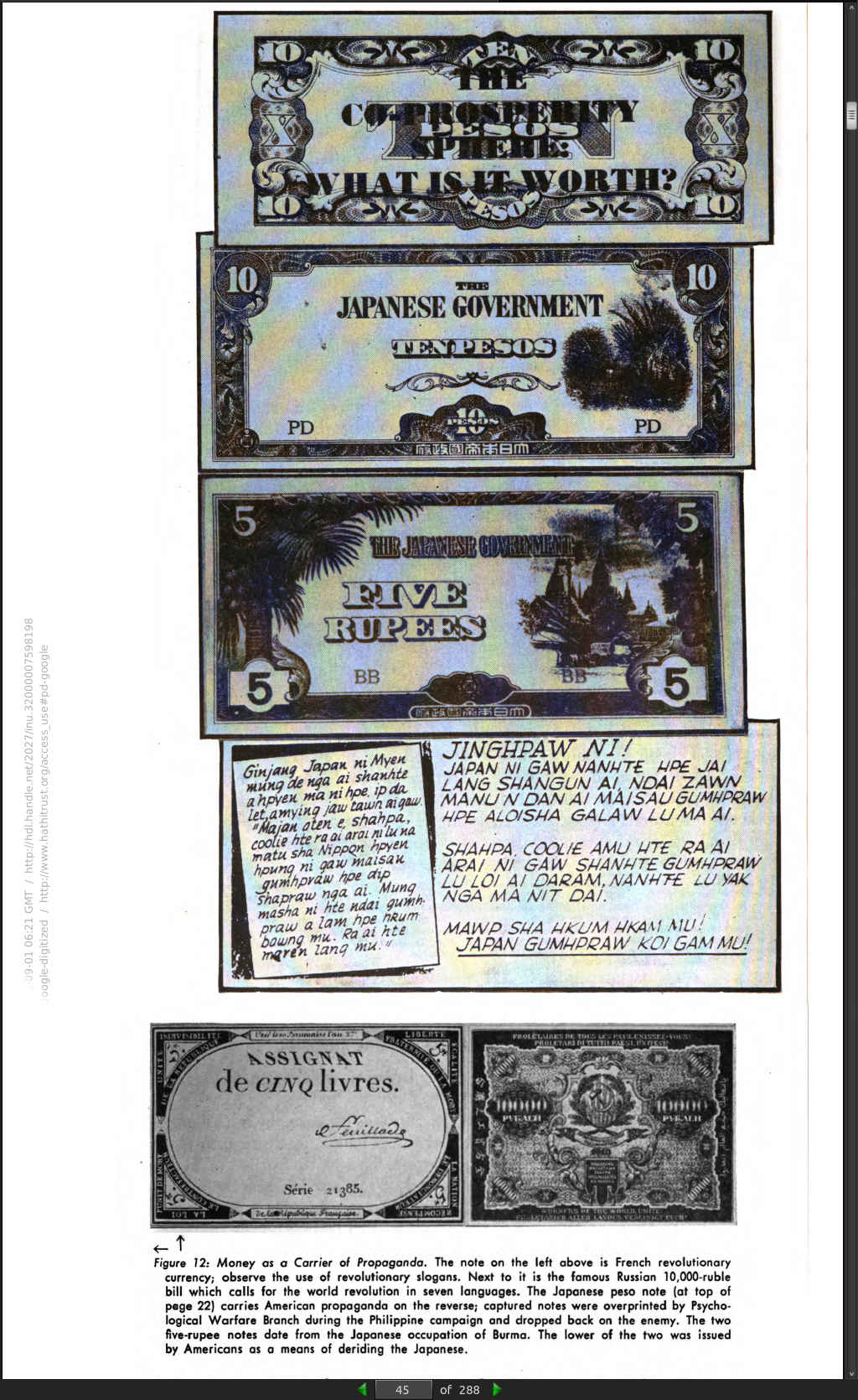
· Chapter 2: The Function of Psychological Warfare
page 47:
-
Psychological warfare, in the broad sense, consists of the application of parts of the science called psychology to the conduct of war; in the narrow sense, psychological warfare comprises the use of propaganda against an enemy, together with such military operational measures as may supplement the propaganda. Propaganda may be described, in turn, as organized persuasion by non-violent means.
-
…much of what is now called psychology was formerly studied under the heading of religion, ethics, literature, politics, or medicine.
page 48:
-
does so by going down to the unconscious mind for his source materials.
-
…the psychologist can quiz a small cross section of enemy prisoners and from the results estimate the mentality of an entire enemy…
-
This reminds me of all those quizzes that would tell you about yourself or “what color/animal/character are you?” in the earlier days of the internet. It is also reminiscent of similar quizzes on mTurk. Could those things been an early attempt to gather intel?
page 49:
-
The propagandist must tell the enemy those things which the enemy will heed; he must keep his private emotionalism out of the operation.
-
Of all the sciences, psychology is the nearest [tp propaganda], though anthropology, sociology, political science, economics, area studies and other specialties all have something to contribute; but it is psychology which indicates the need of the others.
page 50:
-
The motives and weaknesses within war remain ancient and human, however novel and dreadful the mechanical expedients adopted to express them.
-
Not so much anymore with algorithms masquerading as A.I.
-
[Psychological warfare] has become a pervasive element in the military and security situation of every power on earth.
page 53:
-
Freedom cannot be accorded to persons outside the ideological pale, if an antagonist is not going to respect your freedom of speech, your property, and your personal safety, then you are not obliged to respect his.
-
So freedoms are only for people I agree with in “major” terms?
page 54:
-
In the states which are ideologically self-conscious and anxious to promote a fixed mentality, the process of education is combined with agitation and regulation, so that the entire population lives under conditions approximating the psychological side of war. Heretics are put to death or are otherwise silenced.
-
Education and propaganda merge into ever lasting indoctrination.
-
Education is to psychological warfare what a glacier is to an avalanche. The mind is to be in both cases captured, but the speed and techniques differ.
page 55:
- Before the political propagandist can get the public attention, he must edge his media past the soap operas, the soft drink advertisements, the bathing beauties advertising Pennsylvania crude or bright-leaf tobacco. The consequence is that outside propaganda either fails to get much public attention, or else camouflages itself to resemble and to exploit existing media.
page 56:
- It is not possible to separate public relations form psychological warfare when they use the same media.
page 57:
-
…conviction of the propagandist that he is not a propagandist can be a real asset.
-
News becomes propaganda when the person issuing it has some purpose in doing so. Even if the reporters, editors, writers involved do not have propaganda aims, the original source of the news (the person giving the interview; the friends of the correspondents, etc.) may give the news to the press with definite purposes in mind.
page 58:
- psychological warfare output must be a part of the everyday living…
· Chapter 3: Definition of Psychological Warfare
page 60:
-
Among Americans, Walter Lippmann, Harold Lasswell and Leonard W. Doob have done some of the most valuable critical, analytical, and historical writing, but a host of other scholars have also made contributions, some of them works of very real importance.4
-
3 … the smart propagandist attributes plenty of rich, ripe, silly quotations to his opponent. How many people actually know what the Communists have said on any given topic! Or bother to check on the actual claims of the Zionist organization? Or the statements of the Arabs in Palestine!
-
4 The literature in this field is carefully described in two volumes by a three-man team consisting of Harold D. Lasswell, Ralph D. Casey and Bruce Lannes Smith, the first being Propaganda and Promotional Activities, An Annotated Bibliography, Minneapolis, 1935, and the sequel being Propaganda, Communication and Public Opinion, A Comprehensive Reference Guide, Princeton,
- The booklists provide material in plenty for any academic-minded inquirer. The essays in the two volumes are well worth reading, although the authors have undergone the professorial delight of inventing a private language of their own. Parts of the latter book, especially, read like proceedings out of an unfamiliar lodge meeting; but there is sound sense and acute observation behind the vocabulary. It must, however, be parenthetically noted that during World War II the key propaganda jobs were held by a radio commentator, a dramatist, a newspaperman, a New York banker, and an absolutely astonishing number of men from commercial radio — along, of course, with a sprinkling of Army and Navy officers in Washington, and a heavy majority of non-specialist officers in the field. The propaganda experts were Hot, in most instances, called in to do the actual chore of propaganda. Among the exceptions were Leonard W. Doob, author of Propaganda, Its Psychology and Technique, New York, 1935, who served in the War Department’s Psychological Warfare Branch and in the Washington propaganda center at OWI; C.A.H. Thomson, who served as a propaganda staff officer both in Washington and overseas after being a collaborator with the Lasswell group; and Drs. Edwin Guthrie and A. L. Edwards, whose chapter “Psychological Warfare” in (E. G. Boring, editor) Psychology for the Fighting Man, Washington, 1943, pp. 430-447, is a lucid epitome of the topic.
page 61:
- …what this book is about, propaganda may be defined as follows: Propaganda consists of the planned use of any form of communication designed to affect the minds, emotions, and action of a given group for a specific purpose.
page 62:
-
…make the definition read: Propaganda consists of the planned use of any form of public or mass- produced communication designed to affect the minds and emotions of a given group for a specific public purpose, whether military, economic, or political.
-
applying it strictly against the enemy and making it read: Military propaganda consists of the planned use of any form of communication designed to affect the minds and emotions of a given enemy, neutral or friendly foreign group for a specific strategic or tactical purpose.
page 63:
- …purposes of war, as in the following definition: Psychological warfare comprises the use of propaganda against an enemy, together with such other operational measures of a military, economic, or political nature as may be required to supplement propaganda.
page 65:
- propaganda can be distinguished by the consideration of five elements:7
- Source (including Media)
- Time
- Audience
- Subject
- Mission
- 7 See the bibliographies by Harold Lasswell and others, mentioned above, for a wealth of literature giving more technical and scientific breakdowns than this. The formula STASM represents what was actually used in preparation of up-to-the-minute propaganda spot analysis for the War Department General Staff by Propaganda Branch during World War II. Some further aspects of this formula are presented in my article, “Stasm: Psychological Warfare and Literary Criticism” in The South Atlantic Quarterly, Vol. 46, No. 3, July 1947, pp. 344-348.
page 66:
-
Source is the most important.
-
Overt propaganda (also called white propaganda) is issued from an acknowledged source, usually a government or an agency of a government, including military commands at various levels.
-
Covert propaganda (also called black propaganda) has an ostensible source other than the real source and normally involves utterances or acts which are unlawful under the domestic law of the attacked area.
page 67:
-
In terms of the timing, propaganda can be subdivided into two further categories, strategic and tactical. Strategic propaganda is conducted with no immediate effect in view. Its purpose is to wear down the enemy by psychological changes that may extend over months.
-
Tactical propaganda is operated to accomplish an immediate short-range purpose,
page 68:
-
Defensive propaganda is designed to maintain an accepted and operating form of social or other public action. (Soviet propaganda for the Five Year Plans is a conspicuous instance.)
-
Offensive propaganda is designed to interrupt social action not desired by the propagandist, or to predispose to social action which he desires, either through revolutionary means (within the same society) or international, either diplomatic or belligerent (between different societies).
-
Conversionary propaganda is designed to change the emotional or practical allegiance of individuals from one group to another.
-
Divisive propaganda is designed to split apart the component subgroups of the enemy and thereby reduce the effectiveness of the enemy group considered as a single unit. (An instance is provided by the Allied effort to make German Catholics think first as Catholics, then as Germans.)
-
Consolidation propaganda is directed toward civil populations in areas occupied by a military force and is designed to insure compliance with the commands or policies promulgated by the commander of the occupying force.
-
Counterpropaganda is designed to refute a specific point or theme of enemy propaganda. (Japanese charges of American atrocities usually followed American charges of Japanese atrocities.)
page 69:
-
All six of the distinctions last mentioned can be forgotten, except for the fact that in exercises or research the terms will be found to crop up; the basic working distinctions are those determined by the task involved.
-
Political warfare consists of the framing of national policy in such a way as to assist propaganda or military operations, whether with respect to the direct political relations of governments with one another or in relation to groups of people possessing a political character.
-
8 See Harold Lasswell’s Propaganda Technique in the World War, New York, reissue 1938, Chapter II, “Propaganda Organization," for a description of the attempts to coordinate policy and propaganda in World War I.
· Chapter 4: The Limitations of Psychological Warfare
page 70:
- Media - that is the actual instrumentalities by which propaganda is conveyed - are the ordnance of psychological warfare.
page 71:
- Unfortunately the phrase that is successful against the enemy on the battle front may prove to be an irritant to the home public, with the sure consequence that the enemy will pick it up and send it back to do harm. Similarly, home- front propaganda can get out to do the theaters of operation harm
page 73:
- For psychological warfare purposes, it is useful to define the enemy as:
(1) the ruler;
(2) or the ruling group;
(3) or unspecified manipulators;
(4) or any definite minority.
-
It is thoroughly unsound to define the enemy too widely. On the other hand, too narrow a definition will leave the enemy the opening for a peace offensive if the ruler dies, or if the ruling group changes part of its composition.
-
He[the propagandist] can say complimentary things about the enemy leaders or groups who might come over (though he should avoid giving them the kiss of death which the Nazis gave certain prominent American isolationists, by praising them too much).
page 74:
- The New York banker, James Warburg, has written a book, Unwritten Treaty, pointing out that the United States promised just about everything to everybody during the war (he was in OWI and he ought to know),
page 79:
- Media consist simply of the facilities possessed. These are, most commonly:
(1) Standard-wave radio;
(2) Short-wave radio;
(3) Loudspeakers;
(4) Leaflets;
(5) Pamphlets;
(6) Books;
(7) Novelties.
page 80:
- There is no point in trying to establish rapport with the enemy unless you talk his language with effortless perfection on the one end of the scale — or else admit that you really are a foreigner, on the other end of the scale. It is easier to build up the image of a trustworthy enemy than it is to create trust in a traitor. Frequently the attempt to talk the enemy’s own language is less successful than a frank acceptance of handicaps. In actual practice this means that either:
(a) the speaker should be authentically perfect in use of the enemy language,
whether spoken or written as script; or
(b) the speaker should make no effort to conceal his foreign accent.
page 82:
- …using the enemy as part of the background to your own advantage. The moment you start letting him take the initiative, your propaganda wags along behind his. Tell his people something he can’t deny. Let him sit up nights worrying about how he will counteract you.
page 83:
- …never assumes that the enemy propagandist is a gentle man: he is by definition a liar. Your listeners and you are the only gentlemen left on earth.
· Chapter 5: Psychological Warfare in World War I
page 85:
- The American psychological warfare effort of 1917-1919 also drew heavily on familiar skills: the American press, second only to that of the British at the time; the church, Y.M.C.A., and Chautauqua groups; and the wealth of private clubs which flourish under our liberal system of laws and usages.
page 86:
- 1 On World War I, see Harold Lasswell’s Propaganda, Technique in the World War, previously cited; George Creel’s How We Advertised America, New York and London, 1920, the very title of which is an indication of its chief shortcoming; Lt. Col. W. Nicolai, Nachrichtendiemt, Presse und Volksstimmung im Weltkrieg, Berlin, 1920, by the German general staff officer chiefly re sponsible for staff work on propaganda and public opinion, a very thoughtful though prejudiced book; Heber Blankenhorn’s enjoyable little classic, Adventures in Propaganda, Boston, 1919 (Blankenhorn was the only American officer to see field service in propaganda in both wan, as a Captain in I and a Lieutenant Colonel in II) ; and George G. Bruntz* scholarly monograph Allied Propaganda and the Collapse of the German Empire in 1918, Stanford, 1938. Readers desiring farther references should consult the bibliographies by Lasswell, Casey and Smith, cited above.
page 89:
- The fabulous American propaganda, of which the Germans expressed such dread, was the work of two agencies. The civilian agency was the Committee on Public Information, universally known as the “Creel Committee” after its chairman, Mr. George Creel. The military agency was the Propaganda Section (or Psychologic Section) , G-2D, General Headquarters, American Expeditionary Forces, under Captain Heber Blankenhorn.
page 90:
- In one instance Creel got the American producers to threaten Swiss exhibitors with a boycott unless they showed American propaganda film along with the features.
page 92:
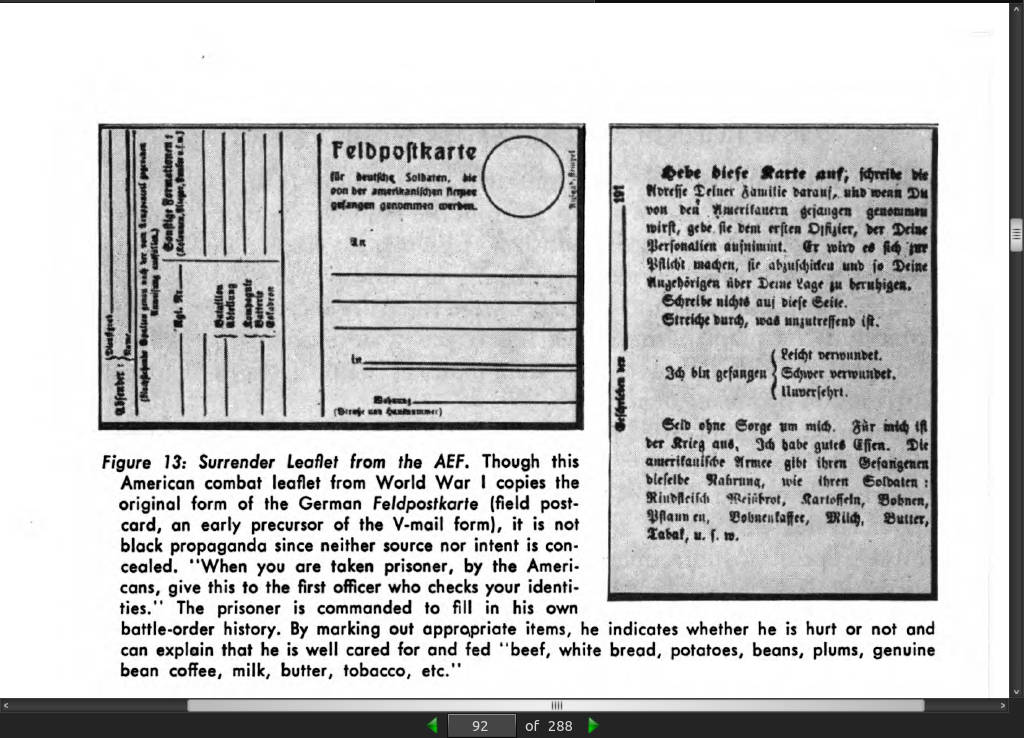
page 94:
- The Bolshevik propaganda was probably the finest propaganda effort ever known in history down to that time—down, perhaps, all the way to our own time.
page 95:
-
When the war ended, and conditions went back to normal, many people in the world did not consider “normalcy” the fulfillment of that better world.
-
I call bullshit. WW1 began the world changing and it never “went back to normal”. WW2 furthered these changes. The changes being industrial expansionist, economic, and social in nature.
page 96:
-
The Communists invented an entirely new vocabulary, which the Soviet and other Communist papers still use, with meanings that have the same emotional value (plus-value, or, “that’s good!”’) as in America or Britain, but which have entirely different meanings in concrete practice. “Democracy” means “free elections”; “free elections” mean that the people elect “democratic leaders”; but “democratic leaders” are not the people who are elected in non-Communist countries. Non- Communist leaders are usually dubbed “tools” or “stooges” of some thing; they are “servile” or “reactionary.” Real “democratic leaders” are only those people approved by the international Communist movement. It knows. By science.
-
Is this not exactly what the USA does today? Iran, Guatemala, Ukraine, Libya, and Syria don’t have real democratic elections so we need to impose our superior scientific elections? Propaganda surrounding terrorists to climate change is all framed as scientific. The modern capitalistic model (read: give a few people control to manipulate currency) is sold as THE way. LGBT’s redefine words like gender and sex. Racism is now anything you don’t agree with. Freedom and (sexual) liberation leads to the destruction of the family. The war on drugs leads to drug epidemics. No child left behind leads to unheard of functional illiteracy. Again, I see our modern world as no different than what the communists were doing. This is probably why so many people are starting to “wake up” to the “cultural Marxism” facing the world today.
-
…Communist propaganda is self-defeating. It can succeed only in situations of desperation, anarchy, or terror.
-
…Communist propaganda sacrifices all other values to the propaganda.
-
This strengthens my points. We have desperation, anarchy ( there is no rule of law, there is the connected “elite” and the rest of us. The “law” is only for one group and only when it runs counter to the narrative.), terror, and the sacrifice of values today.
-
The book keeps referencing “science” as justification for communism. “Science” is the modern religion and used exactly the same way today as it was 100 years ago.
-
…Communist psychological warfare is continuous.
-
Like with 24/7 news and entertainment delivered via a screen in every room and a “smart” phone in every hand?
-
Communist propaganda is therefore seasoned and professional, dependent on a powerful police- state at home and on uneducated or emotionally ill fanatics abroad…
page 97:
- Modern Communism is permanent psychological warfare in action.
page 98:
-
…Communist propaganda; it can keep control only with heavy military pressure behind it. But in the far past, it has been capable of winning — as in Russia and China —without outside military aid. With a renovation of techniques, doctrines, and personnel, it may do so again.
-
No connection to the USA military might backing “democracy” though.
· Chapter 6: Psychological Warfare in World War II
page 99:
- 1 For a pro-Hitler view of the world, see Wyndham Lewis’ Hitler, London, 1931, if & copy is to bo found. The author would probably prefer for the book to disappear. It is an eloquent, very pro-Nazi book, putting the Hitlerite terminology into the English language and — what is more important— infusing into the clumsy German pattern of thinking-and-feeling a lightness of touch which makes Naziism more palatable. The book converted no one in its time, and is not apt to do harm at this late date; but it will make the English-reading reader understand some of the novelty, the revolutionary freshness, the bold unorthodoxy which made millions of people turn to Hitlerism as an escape from the humdrum heartbreak of Weimar Germany. Much of the book is devoted to the problem of power —street-fighting, mass demonstrations, slogans, symbolisms — which so fascinated the Nazis.
page 100:
- The propaganda addict takes everything with a ton of salt; what he does believe is lost in what he doesn’t believe. The ordinary controls of civilized life — regard for truth, regard for law, respect for neighbors, obedience to good manners, love of God — cease to operate effectively, because the propaganda-dizzy man sees in everything its propaganda content and nothing else.
page 102:
-
Pre-belligerent operations required extensive use of “black” propaganda.
-
Financial groups were contacted to preserve the fiction of normal international relations. Cultural groups were employed to preserve friendliness for their respective nationalities as such.
page 104:
- When the Germans wanted to build the British up for a let-down, they withheld military news favorable to themselves. During the fight for Norway, they even spread rumors of British successes, knowing that if British morale went up for a day or two, it would come down all the harder when authentic bad news came through the War Office.
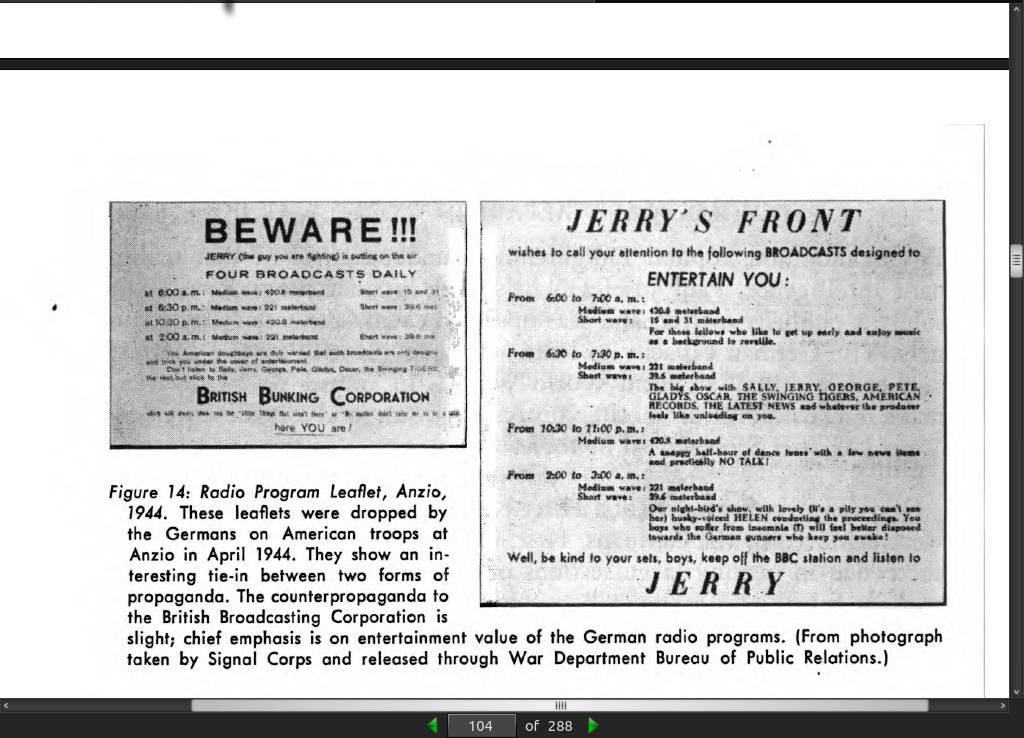
- The Germans thus had the advantage of not needing to make much distinction between news, publicity, and propaganda. All three served the same purpose, the immediate needs of the Reich.
page 105:
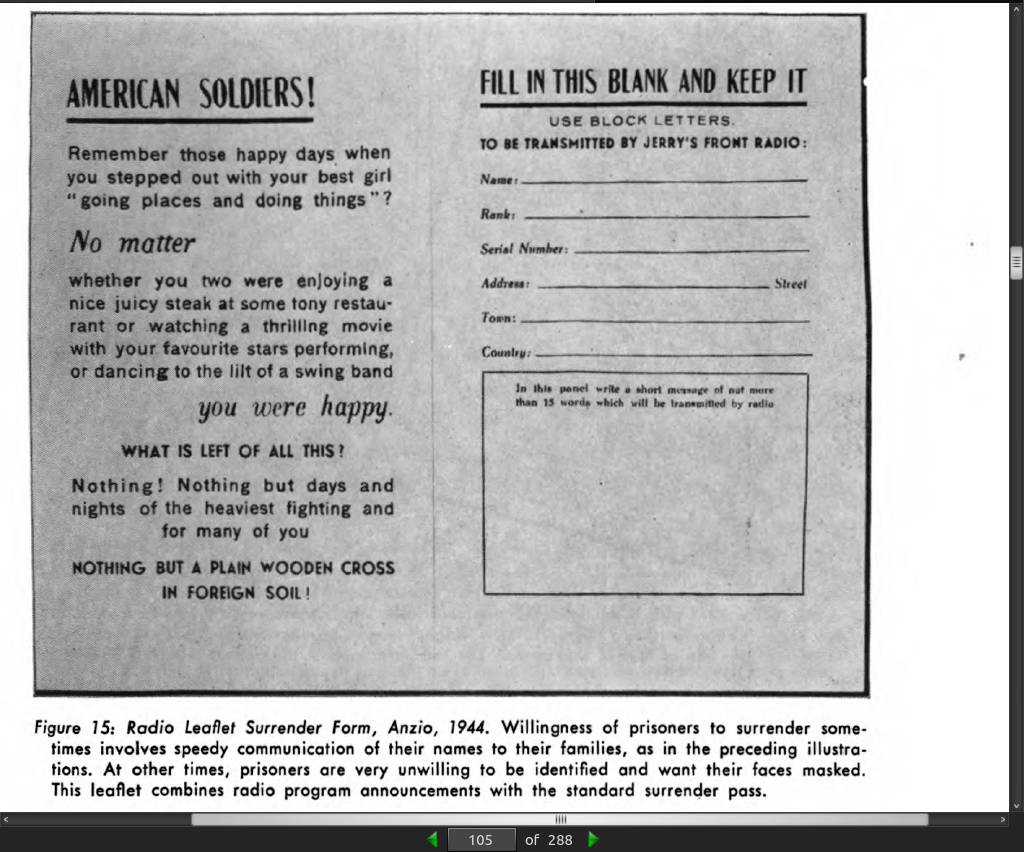
page 106:
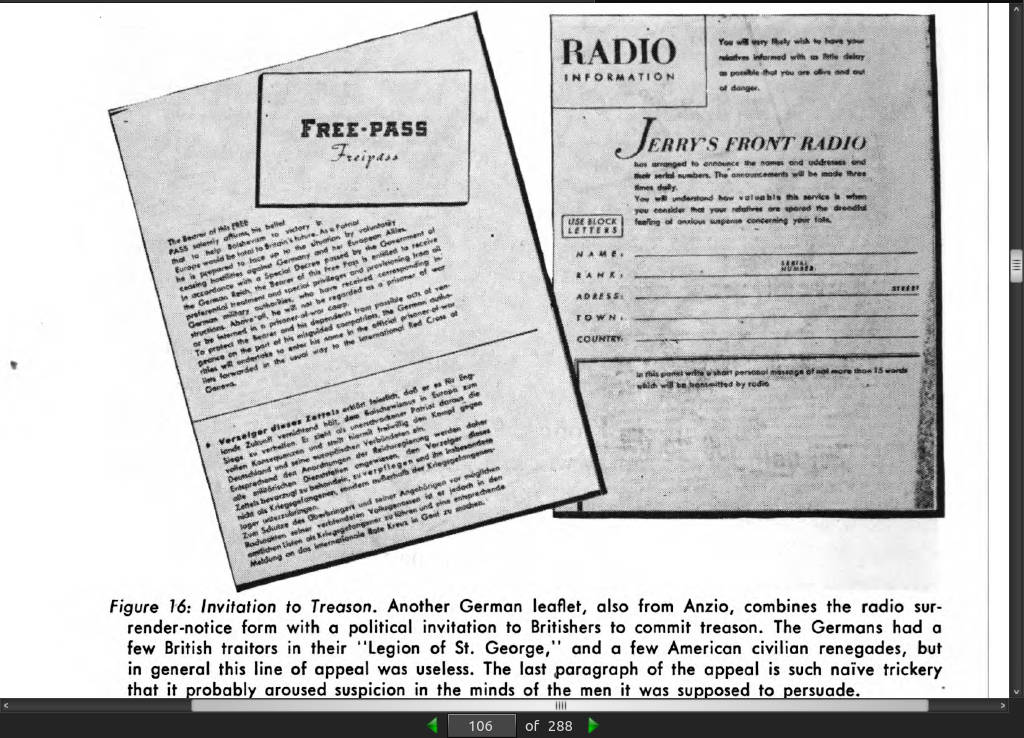
page 108:
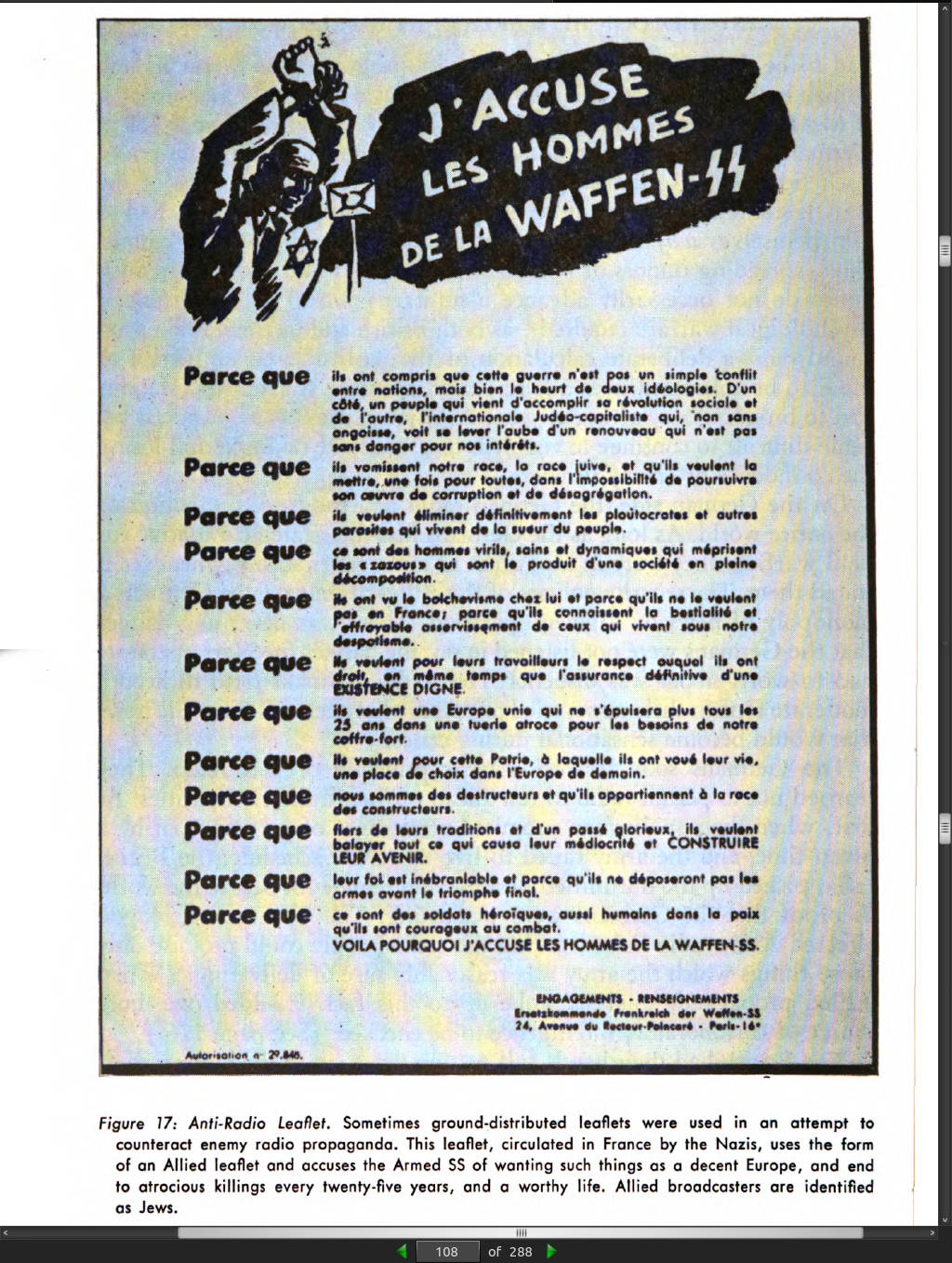
page 112:
-
OWI at its most vigorous could scarcely have reached the audience that had been built up by the Time- Life-Fortune group, not to mention the Reader’s Digest, both of which became truly global in coverage during the war years. American movies already had a world-wide audience. The propaganda turned out unwittingly by such agencies may not have had the gloss and political smooth ness of Dr. Paul Josef Gobbels’ best productions but it had something no government propaganda had — the possession of a readership all of which was unmistakably voluntary, obtained by the appeal of authentic interest and entertainment — and proved by an ability to charm money out of people’s pockets.
-
The American problem of propaganda was thus not a simple one. Total psychological warfare was out of reach if we were to remain a free people. Otherwise the simple-seeming thing to have done would have been to put a government supervisor in every newspaper, radio station and magazine in the country, and coordinate the whole bunch of them together in the national interest. Simple-seeming. Actually, such an attempt would have been utter madness, touching off a furious political fight within the country and meeting legal obstacles which would have remained insurmountable as long as there was a Constitution with courts to enforce it.
-
So instead of doing it officially, said organizations were infiltrated in Operation Mockingbird.
-
The then Mr. or Colonel, later General, William Donovan had tasted the delights of political warfare when President Roosevelt sent him to Belgrade to talk the Serbs into fighting instead of surrendering. He was successful; the Serbs fought. He came back to the United States with a practical knowledge of what political warfare could do if qualified personnel operated on the spot.
-
On 11 July, 1941 President Roosevelt issued an order appointing Colonel Donovan as Coordinator of Information. The agency became known by the initials COI.4
-
The primary mission of COI was the collection of information and its processing for immediate use. Large numbers of experts were brought into its Research and Analysis Branch, designed to do for the United States in weeks what the research facilities of the Germans and Japanese had done for them over a matter of years.
-
4 This document establishing the COI, along with the other major documents pertaining to American psychological warfare, may be found in J. P. Warburg’s book cited above, Unwritten Treaty.
page 113:
-
Radio work was first done by an agency within COI called FIS — Foreign Information Service.
-
Colonel Donovan had moved into this work with out written and exclusive authorization from the White House; hence there followed a lamentable interval of almost two years’ internal struggle-between American agencies …
-
Military Intelligence Division had created an extremely secret psycho logical warfare office at about the time that the COI was established; this had broad intelligence and policy functions, but no operational facilities. It was headed by Lieutenant Colonel Percy Black, who began auspiciously by putting Dr. Edwin Guthrie in office as his senior psycho logical adviser. This ultra-quiet office was called Special Study Group …
-
Meanwhile, the Rockefeller Office was conducting independent broadcasts to Latin America;…
page 114:
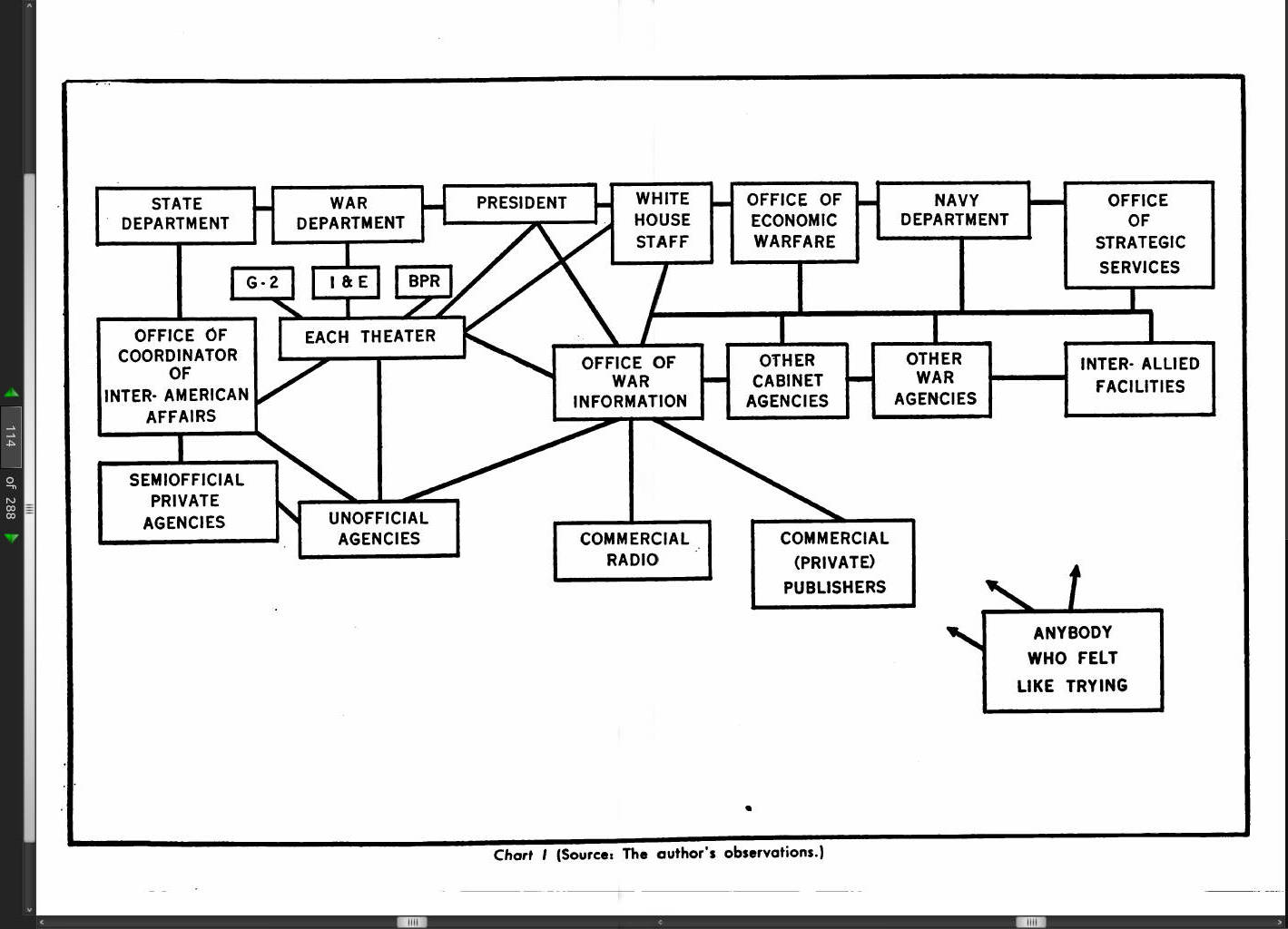
page 115:
- On 13 June, 1942 the President created the Office of War Information. This agency was given control directly or indirectly over all domestic propaganda, and over white propaganda abroad, except for the Western Hemisphere, which remained under the Rockefeller Committee in the State Department. The FIS was taken from the COI, and the COI took on the new name of OSS — Office of Strategic Services — under which it retained three major functions:
(1) continuation of scholastic and informal intelligence;
(2) BLACK PROPAGANDA OPERATIONS (given explicit authority only in March, ;
1943)
(3) subversive operations, in collaboration with regular military authority.
- The OWI was placed under Mr. Elmer Davis, a Rhodes scholar and novelist who had become one of the nation’s most popular radio commentators. The FIS was perpetuated under the control of Mr. Robert Sherwood,…
page 116:
- Highly classified plans for psychological warfare were being drafted for both the Joint and Combined Chiefs of Staff. These were discussed at various meetings and then classified a little higher, whereupon they were locked up, lest the propaganda writers and broadcasters see them and break security on them by obeying and applying them. Broadcasts — thousands of words in dozens of languages — were transmitted to everyone on earth. They were written by persons who had little if any contact with Federal policy, and none with the military establishment, except for formal security. The plans at the top bore no observable relation to the operations at the bottom.
page 117:
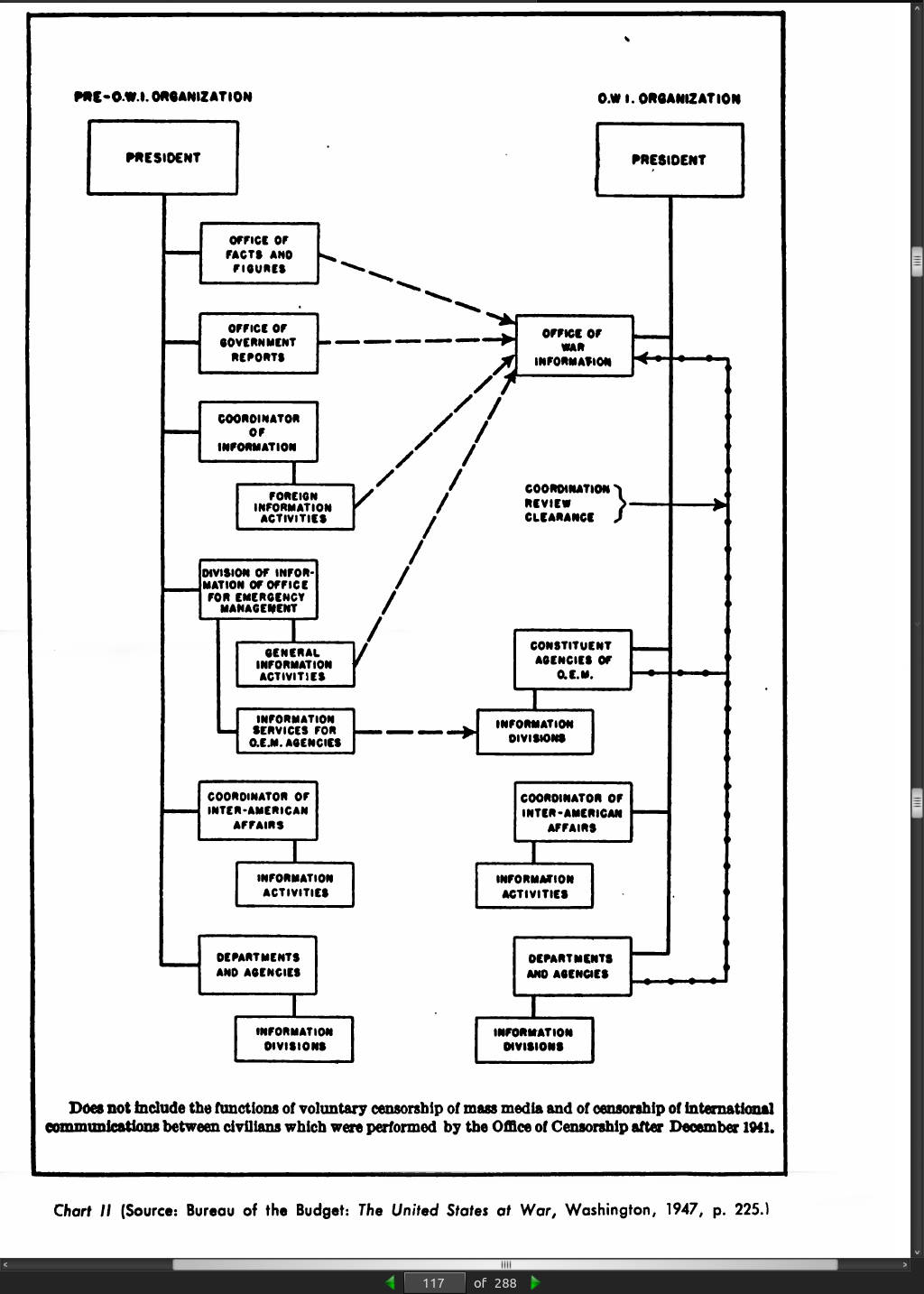
page 118:
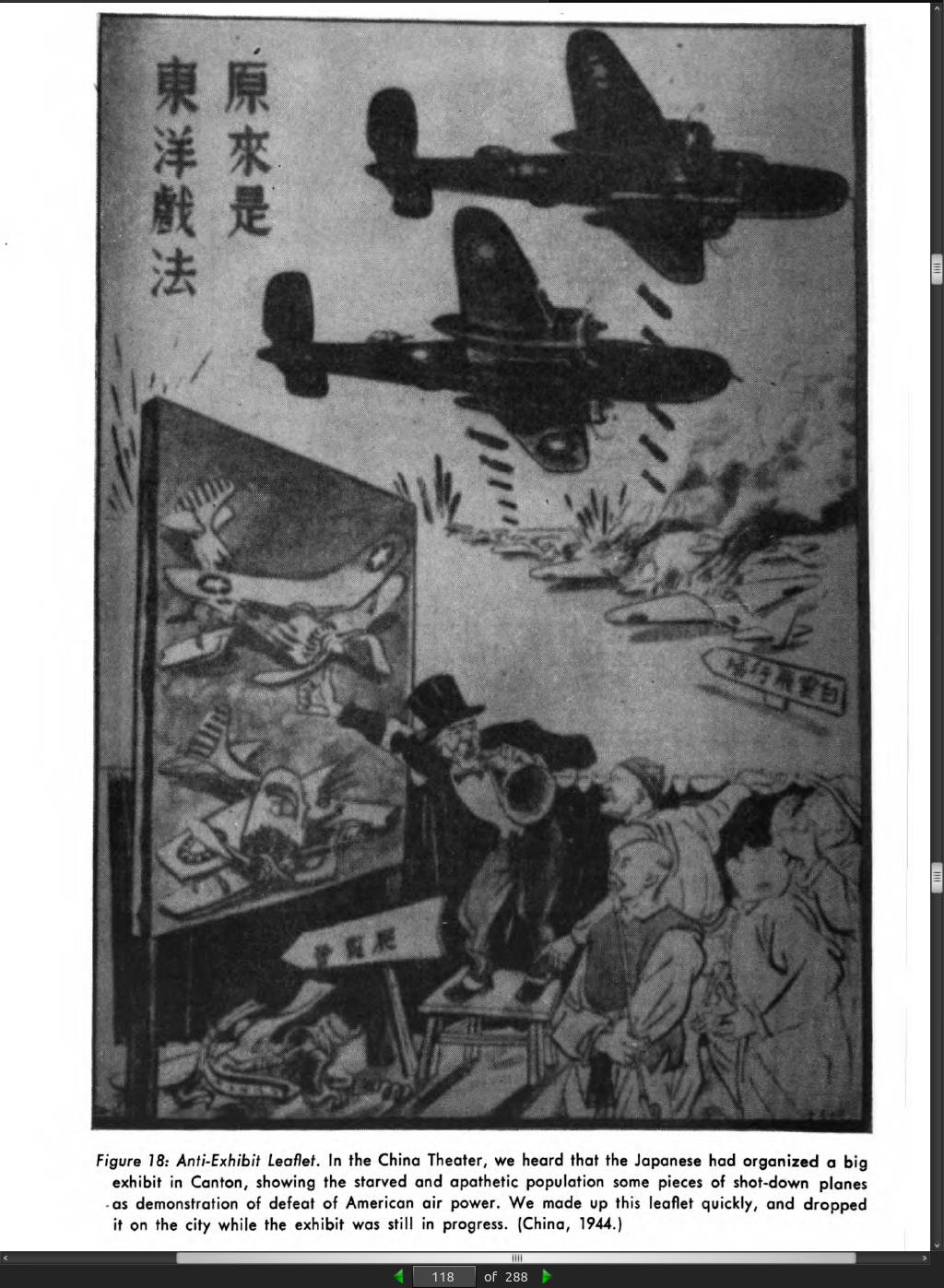
page 119:
-
By 1945, this had all become transformed into a large, well run, well integrated organization.
-
Under the command of Lieutenant Commander Alexander Leighton, an M.D. who was also a psychiatrist and anthropologist, careful techniques were devised for the analysis of Japanese and German morale. Comparable though dissimilar work on Europe had been done by a staff associated with Harold Lasswell. The propaganda expert Leonard W. Doob had been appointed controlling and certifying officer for every single order of importance.
page 121:
-
Qualifications for Psychological Warfare. Effective psychological warfare requires the for combination of four skills in a single individual:
-
(1) An effective working knowledge of U.S. government administration and policy, so that the purposes and plans of the government may be correctly interpreted.
-
(2) An effective knowledge of correct military and naval procedure and of staff operations, together with enough understanding of the arts of warfare, whether naval or military, to adjust propaganda utterance to military situations and to practical propaganda operations in forms which will dovetail.
-
(3) Professional knowledge of the media of information, or of at least one of them (book-publishing, magazines, newspapers, radio, advertising in its various branches) , or of some closely related field (practical political canvassing, visual or adult education, etc.).
-
(4) Intimate, professional-level understanding of a given area (Italy, Japan, New Guinea, Kwangtung, Algeria) , based on first-hand acquaintance, knowledge of the language, traditions, history, practical politics, and customs.
-
(5) Professional scientific understanding of psychology, anthropology, sociology, history, political science, or a comparable field.
page 123:
- The psychological soldier deals with enemy troops in their civilian capacity; he addresses them as men, he appeals to their non-military characteristics in most instances, and he does not follow sportsmanship,
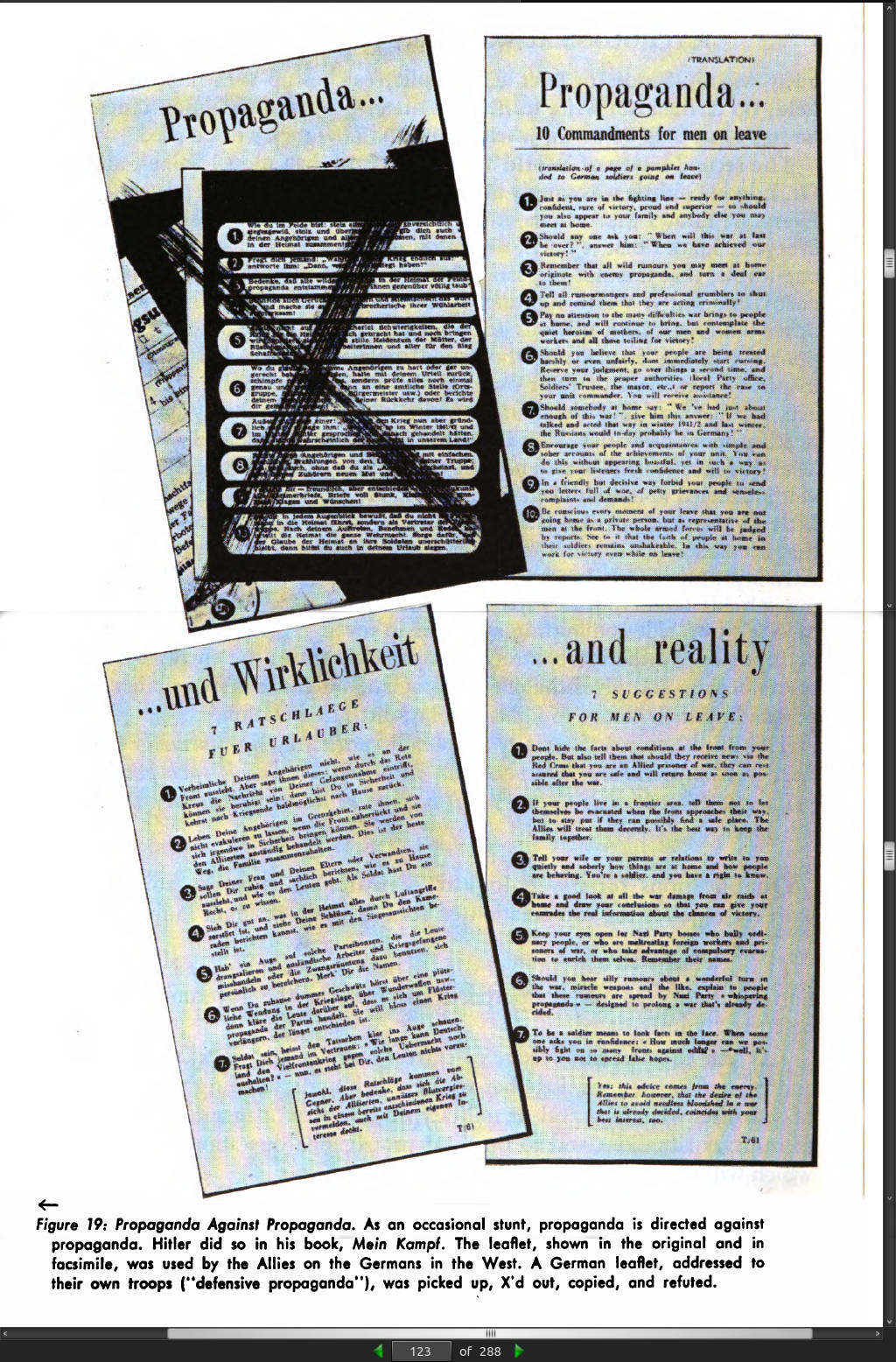
page 125:
- James Mock and Cedric Larson’s account of the Creel Committee, Words That Won the War (Princeton, 1939)
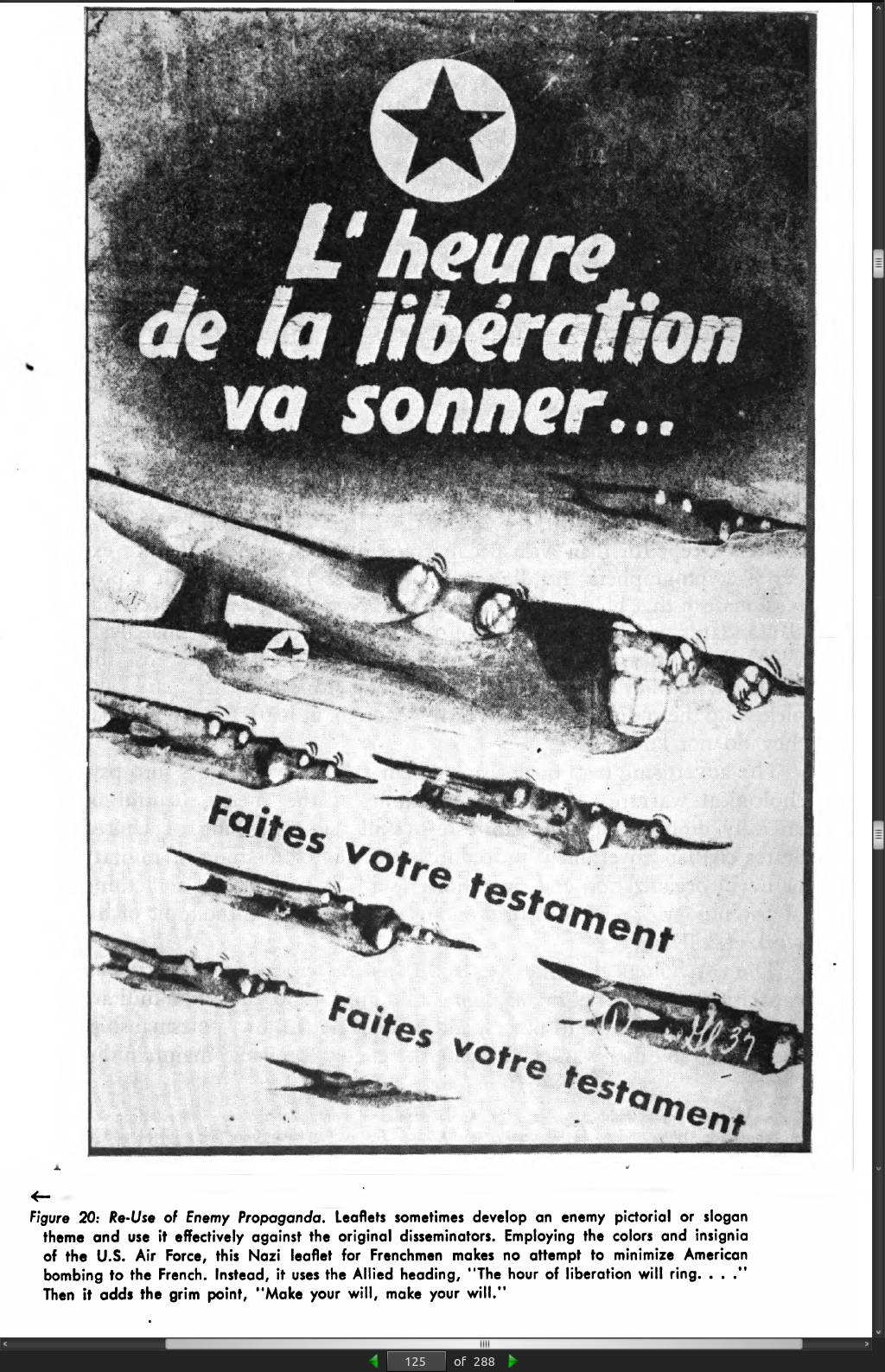
page 126:
-
One operation alone probably repaid the entire cost of OWI through out the war. The Japanese offered to surrender, but with conditions. We responded, rejecting the conditions. The Japanese government pondered its reply, but while it pondered, B-29s carried leaflets to all parts of Japan, giving the text of the Japanese official offer to surrender. This act alone would have made it almost impossibly difficult for the Japanese government to whip its people back into frenzy for suicidal prolongation of war.
-
If this is true, then why the nuclear bombs?
· PART TWO: ANALYSIS, INTELLIGENCE, AND ESTIMATE OF THE SITUATION
· Chapter 7: Propaganda Analysis
page 132:
- Opinion analysis pertains to what people think; propaganda analysis deals with what somebody is trying to make them think.
page 133:
- Propaganda is directed to the subtle niceties of thought by which people maintain their personal orientation in an unstable interpersonal world. Propaganda must use the language of the mother, the school teacher, the lover, the bully, the policeman, the actor, the ecclesiastic, the buddy, the newspaperman, all of them in turn.
page 134:
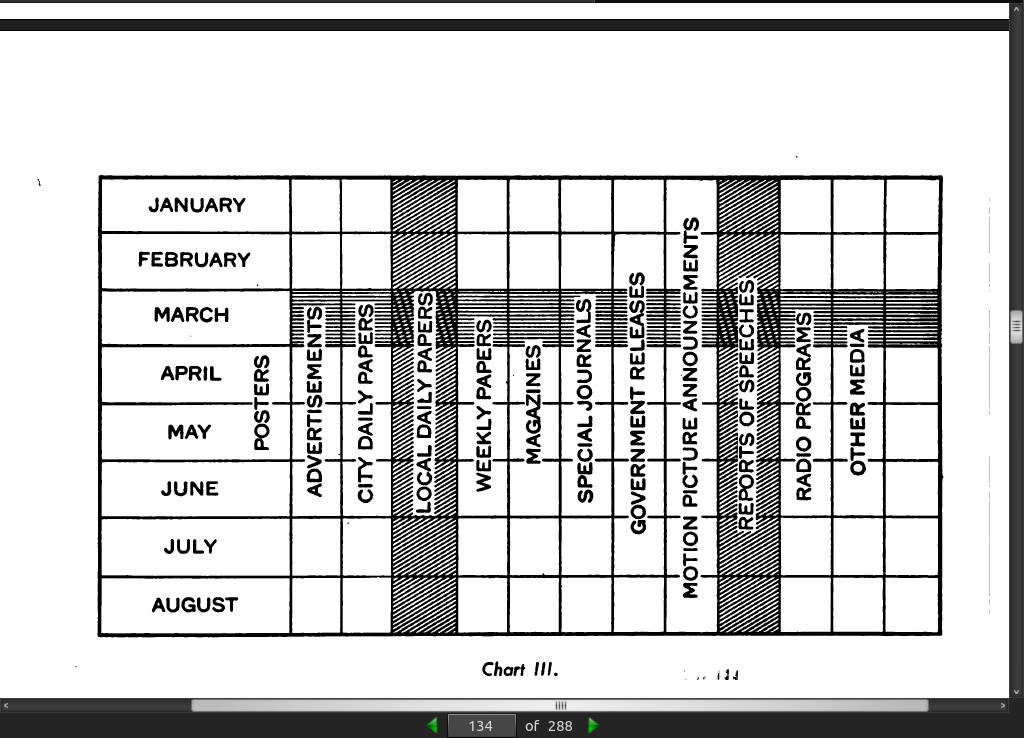
page 139:
- Almost all good propaganda — no matter what kind — is true. It uses truth selectively.
page 140:
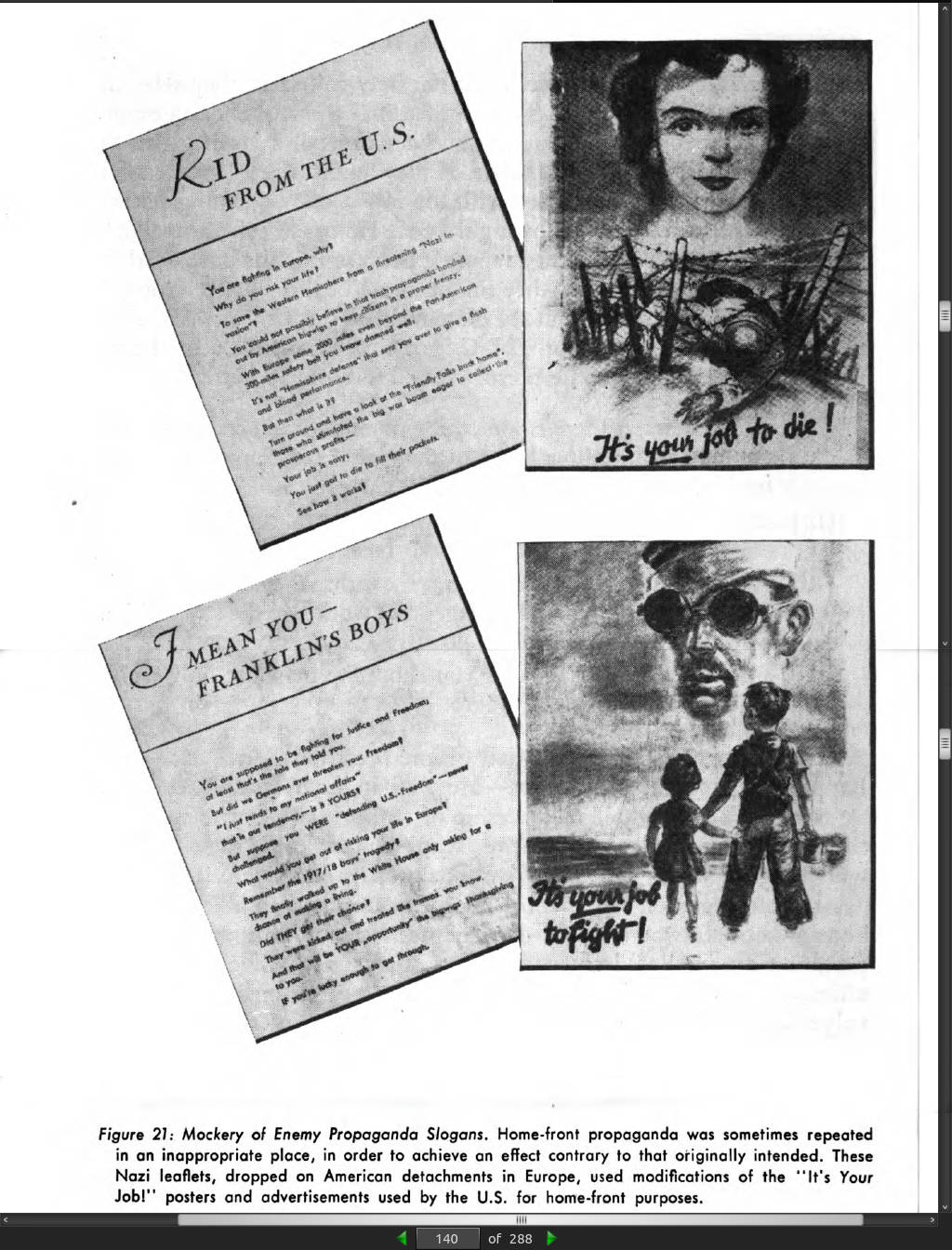
page 141:
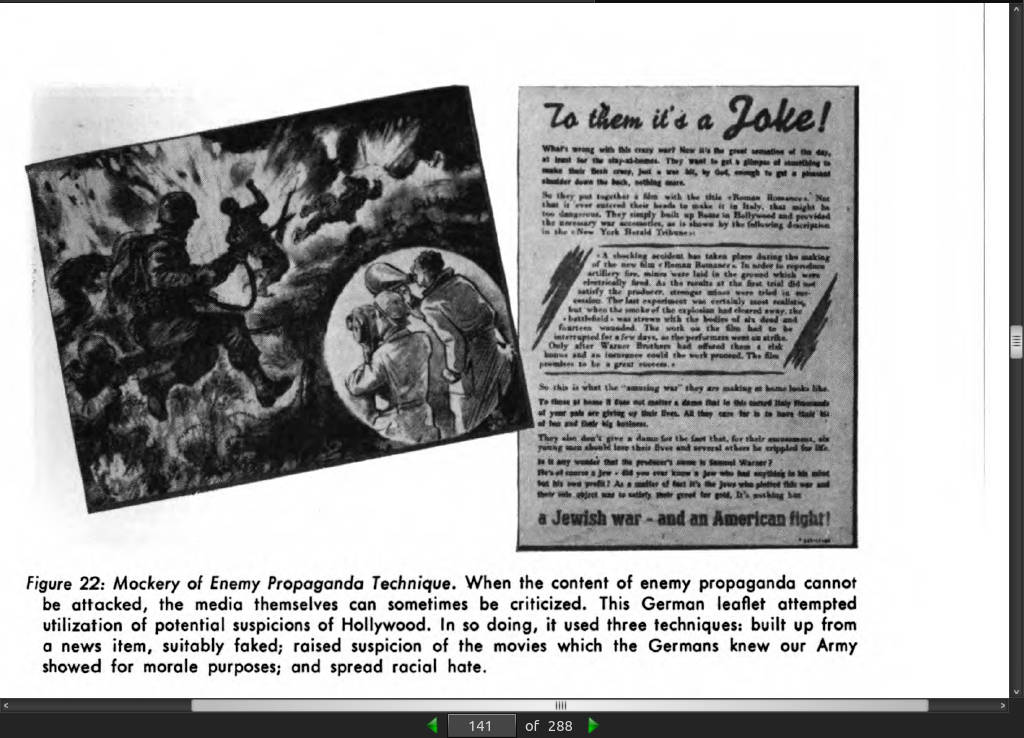
page 142:
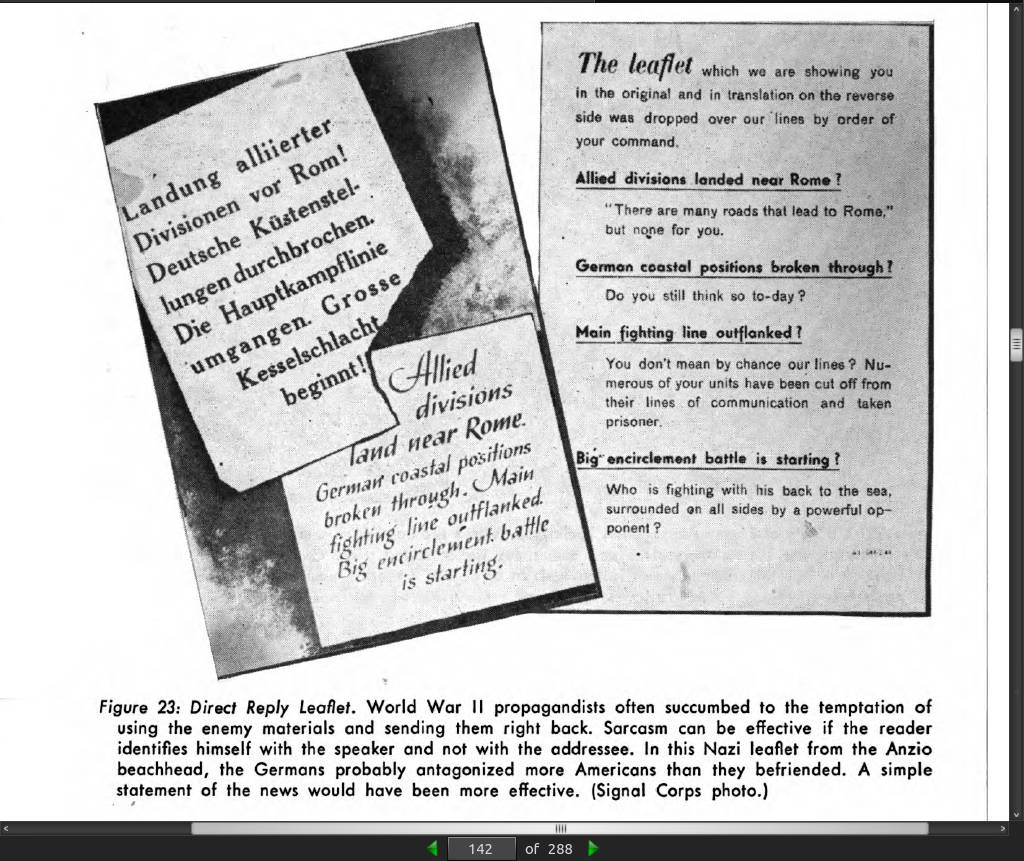
page 143:
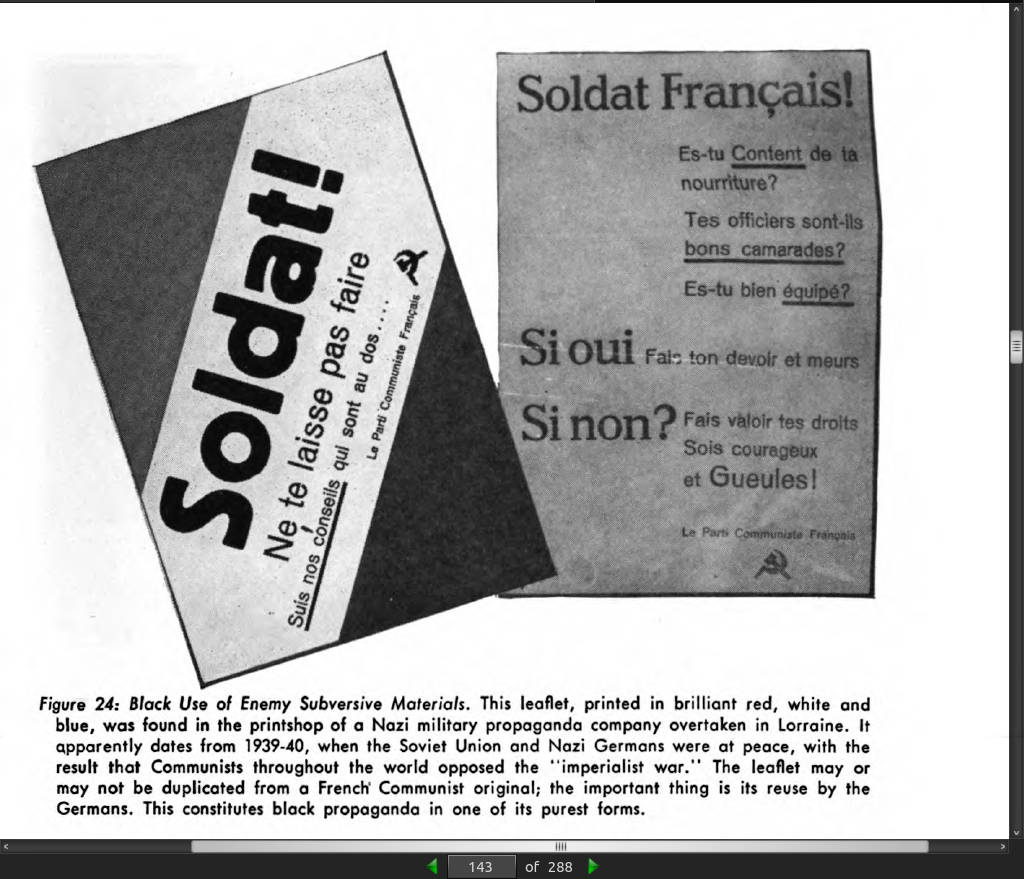
page 144:
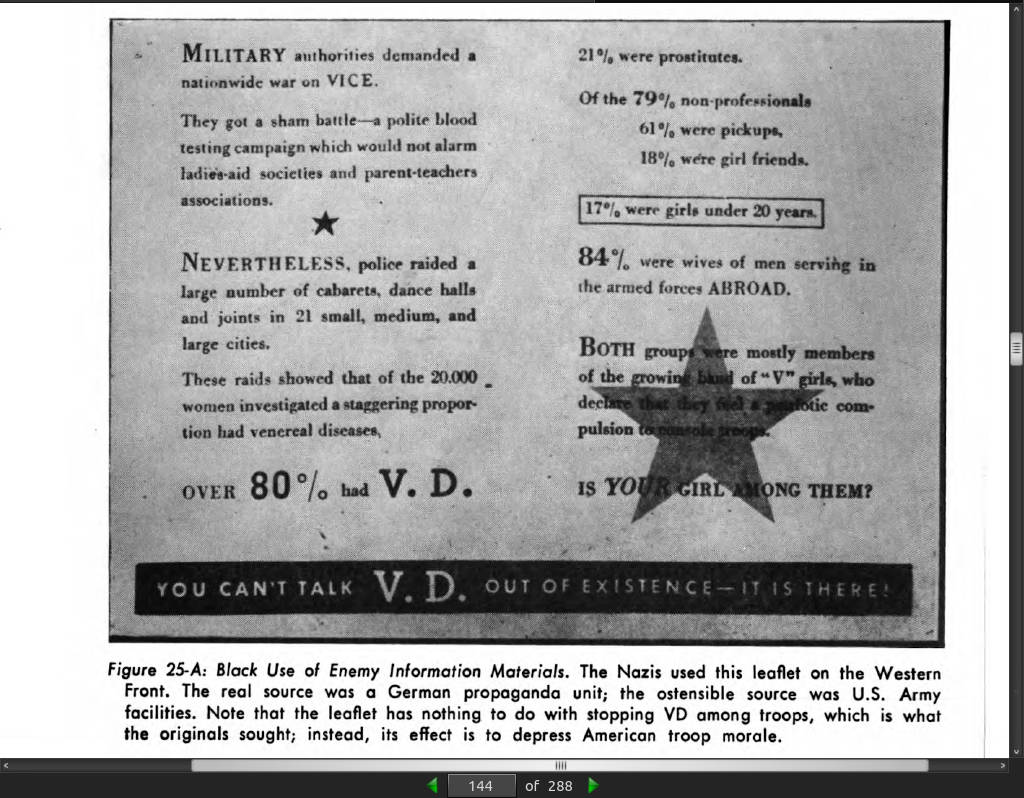
page 145:
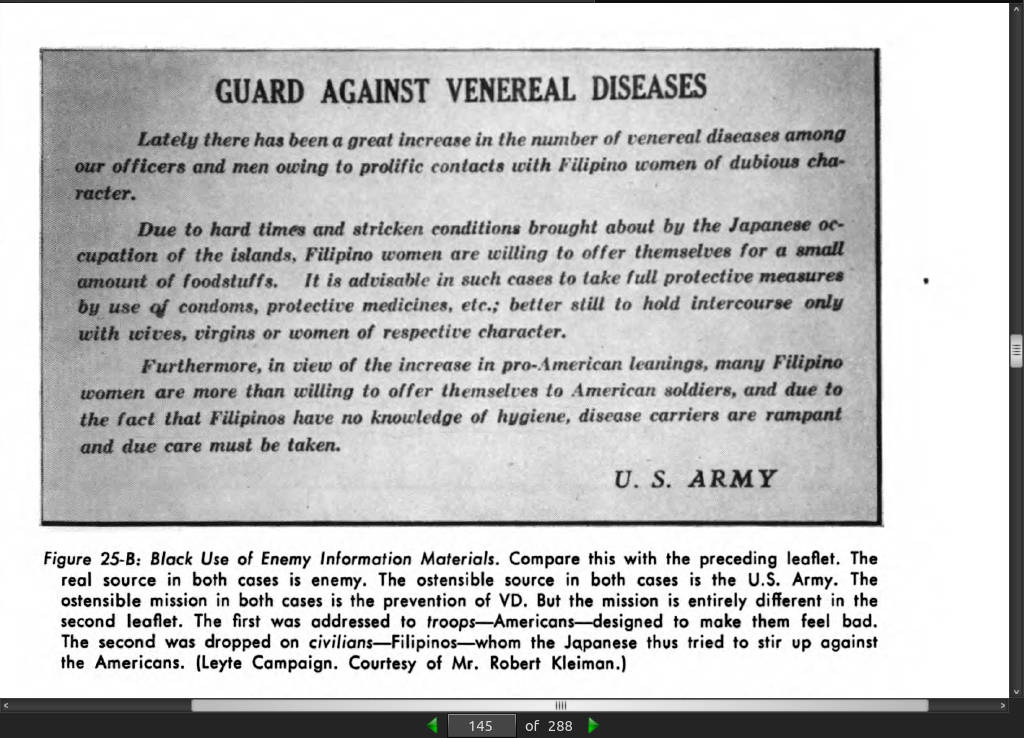
page 146:
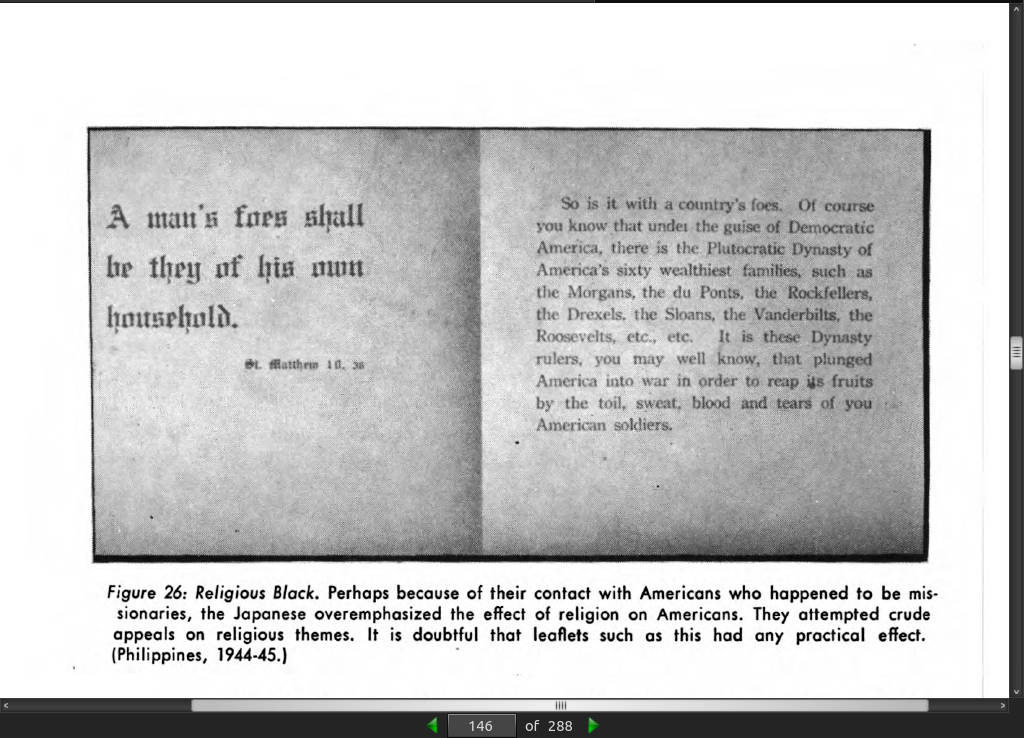
page 147:
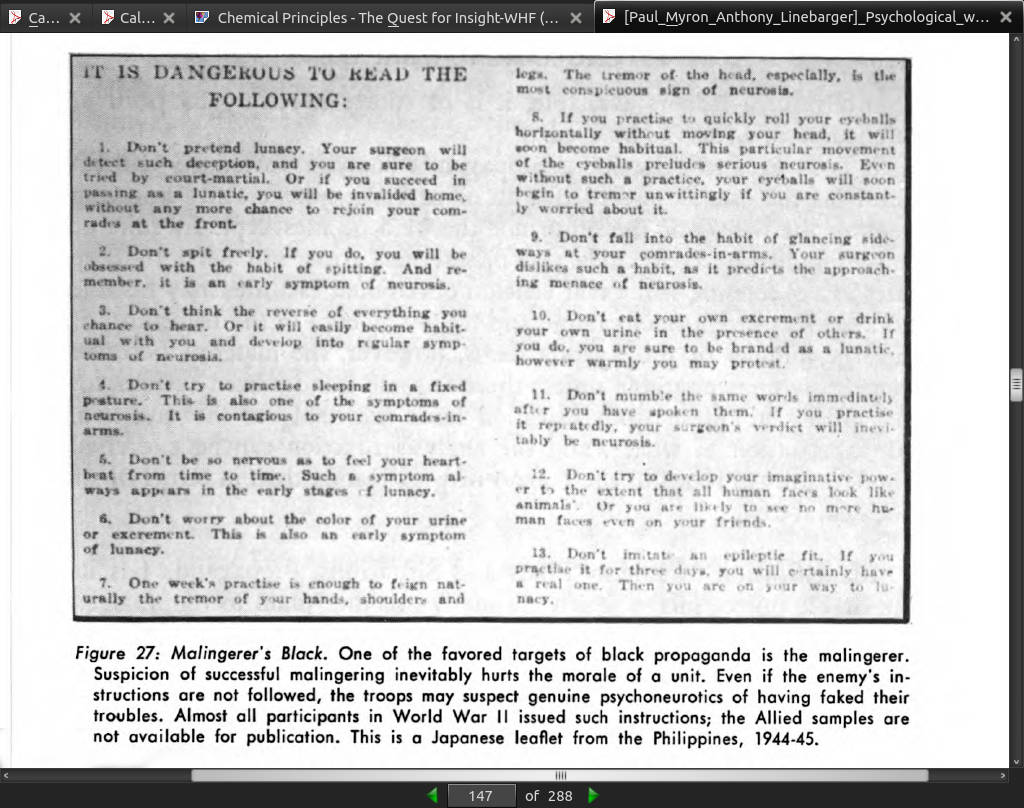
page 148:
- Propaganda has its inevitable mirror image which gradually becomes plain to the analyst. If the analyst is careful, using shrewd judgment in appraising specific missions, he will gradually see forming in his files a record of the immediate and long-range aims of the propaganda originators. This be comes possible only when enough material is available,
page 152:
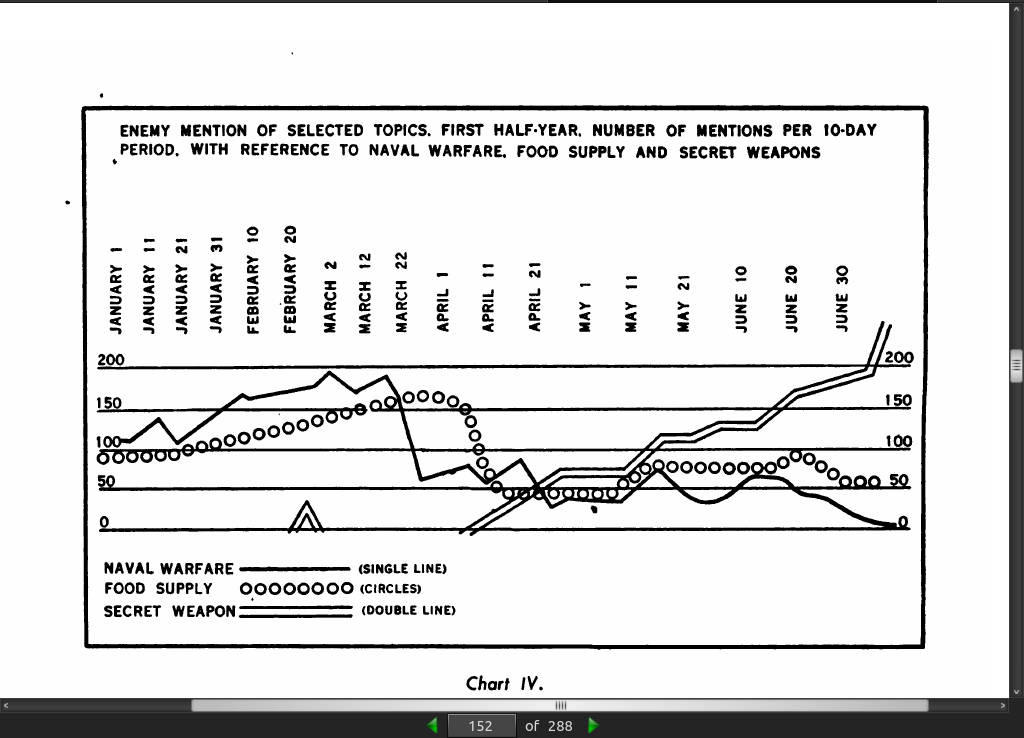
page 155:

page 156:
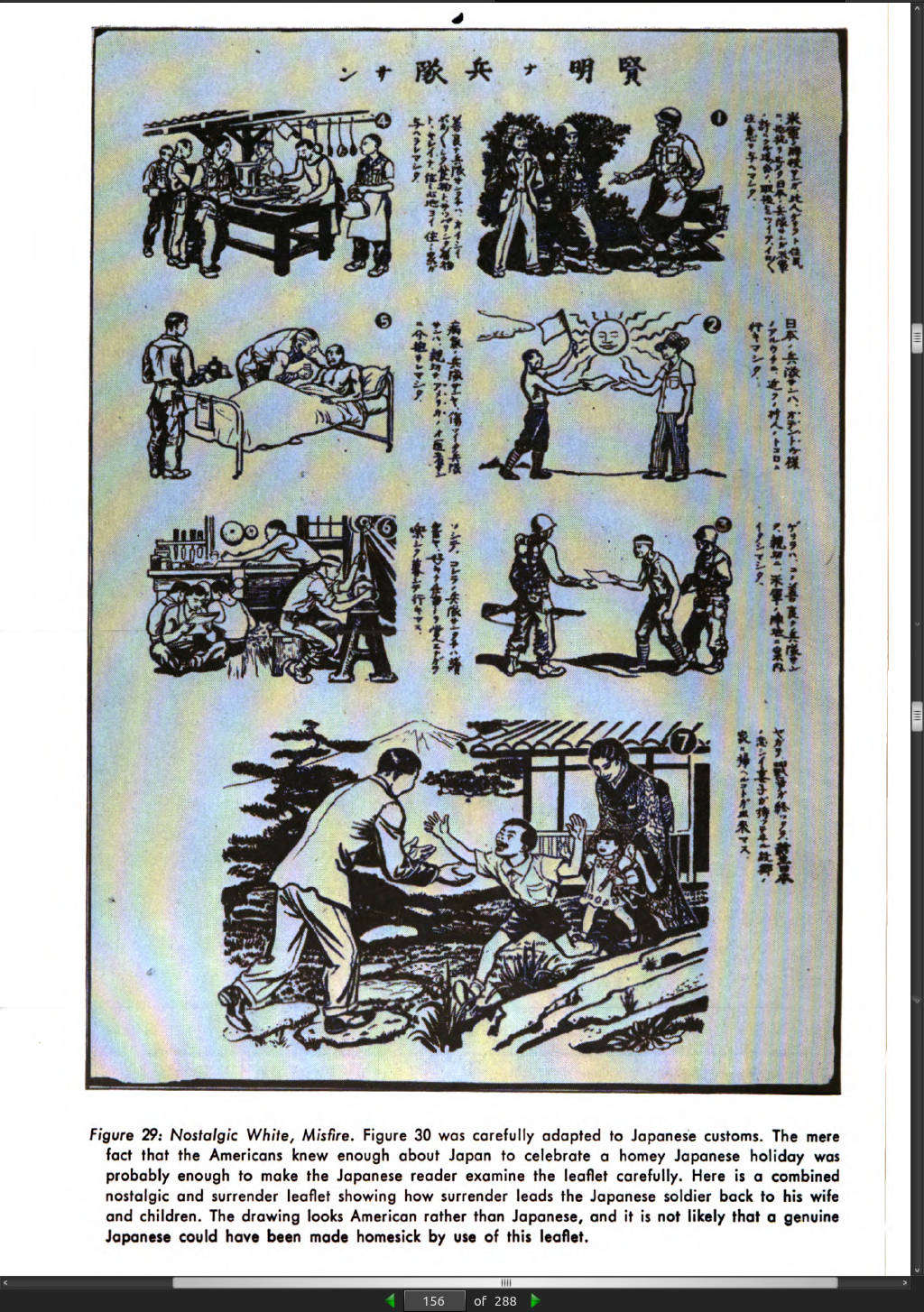
· Chapter 8: Propaganda Intelligence
page 157:
- the first weapon of propaganda, the news.
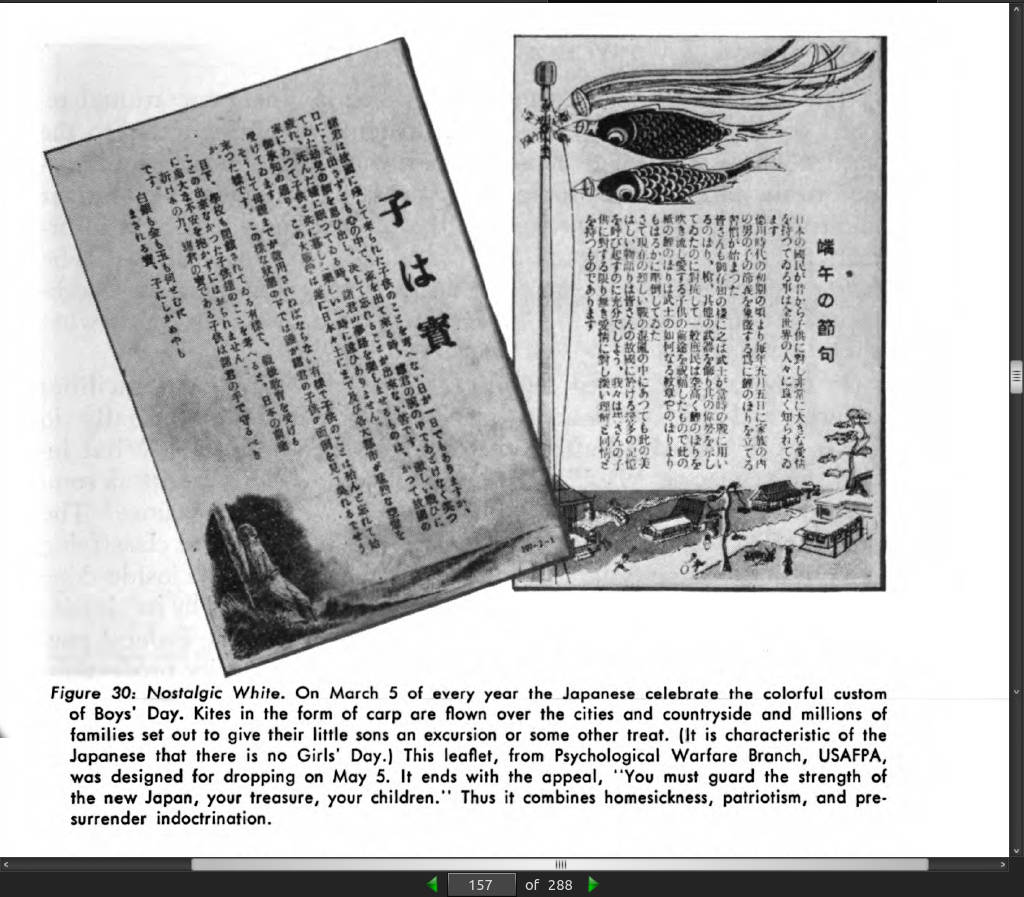
page 158:
- What intelligence agency in Washington could compile a weekly report as comprehensive, well edited and coldly planned as Time magazine?
page 159:
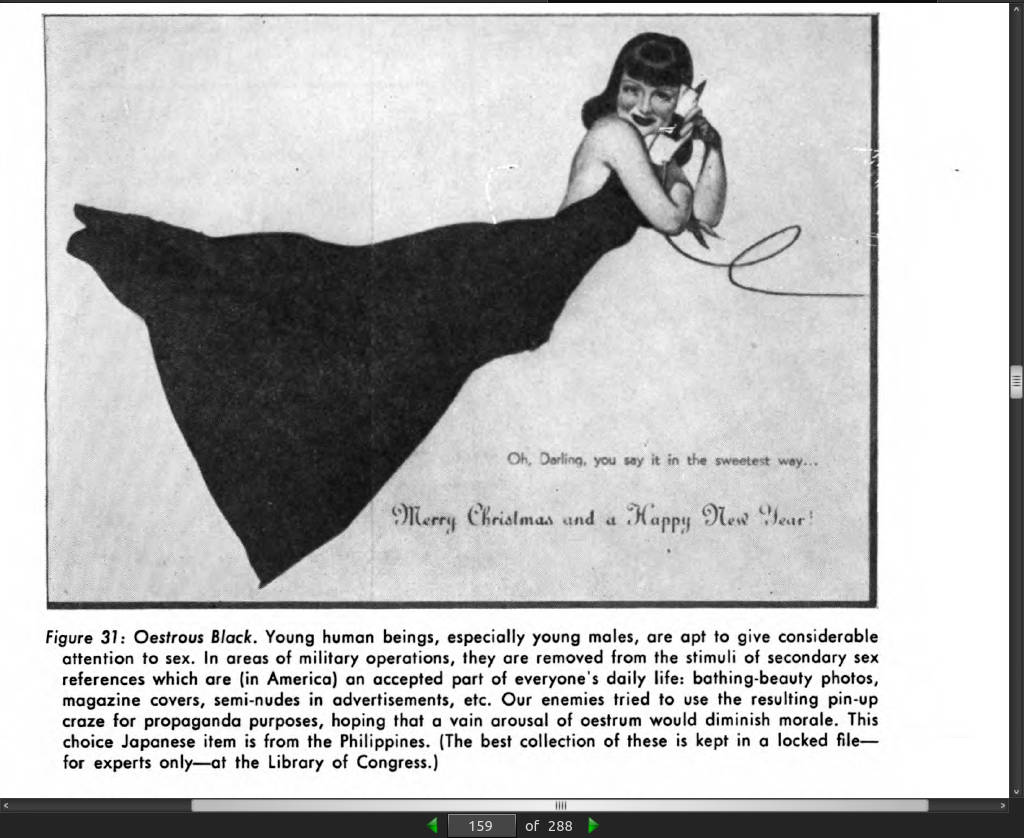
page 160:
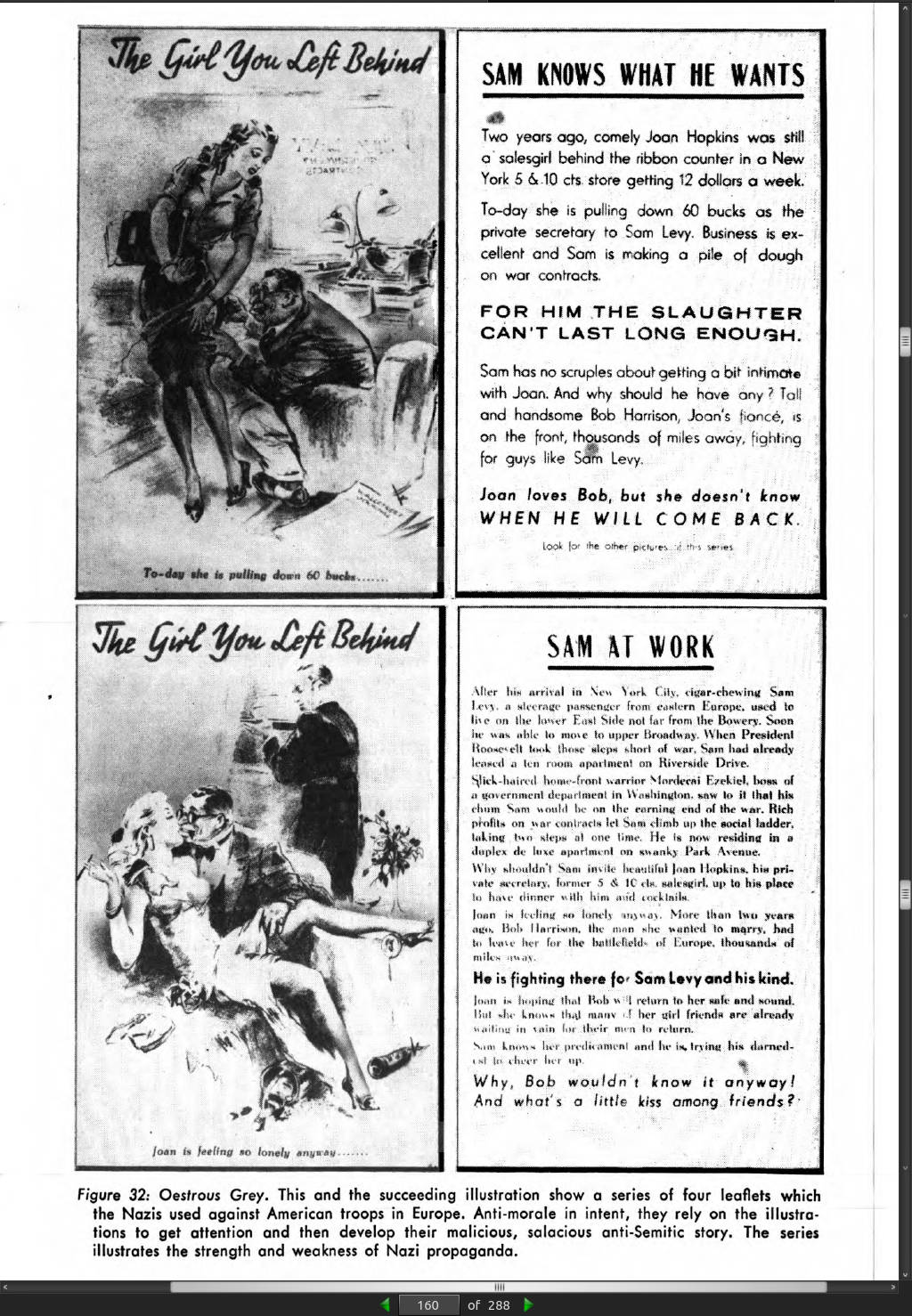
page 161:
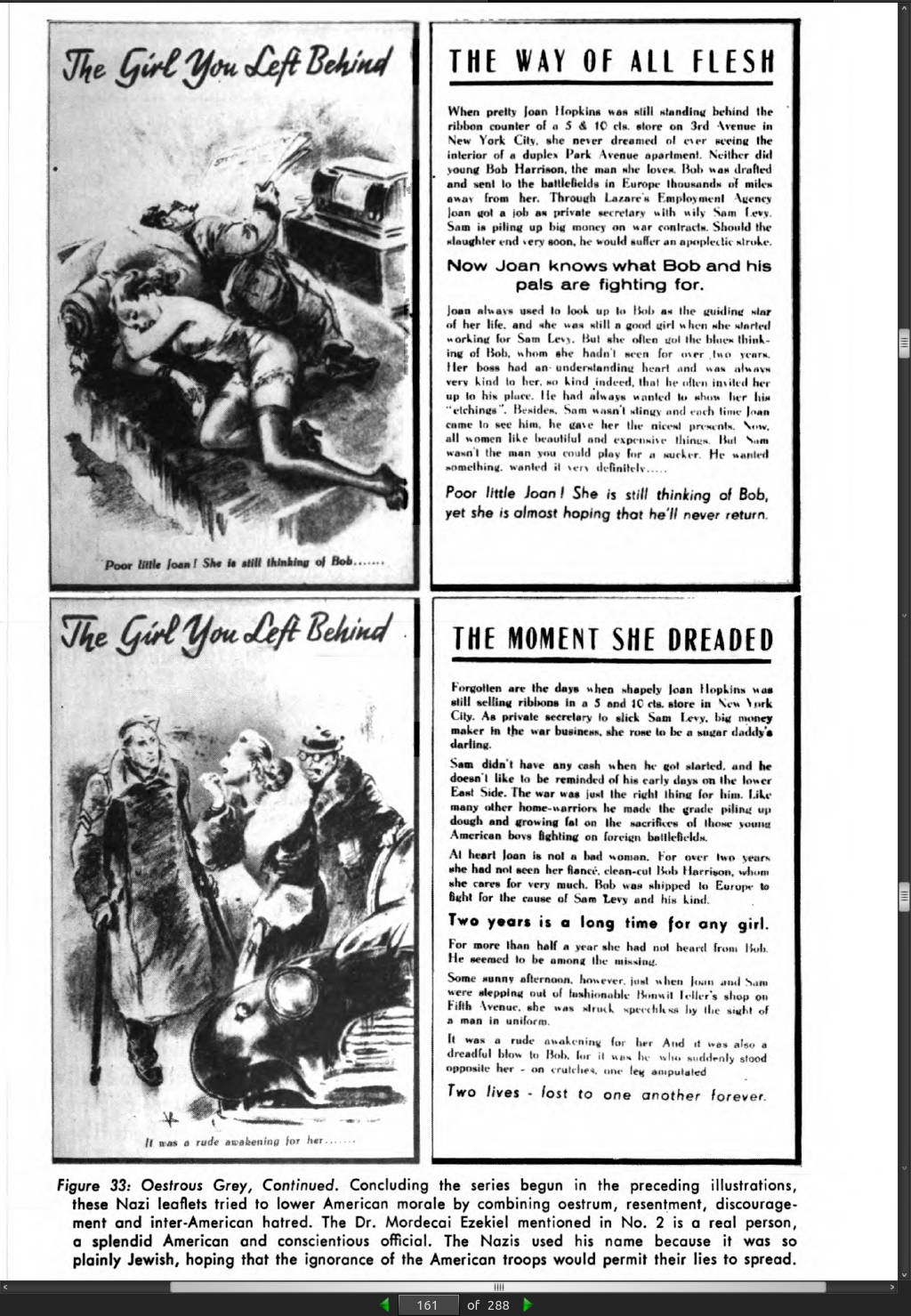
page 163:
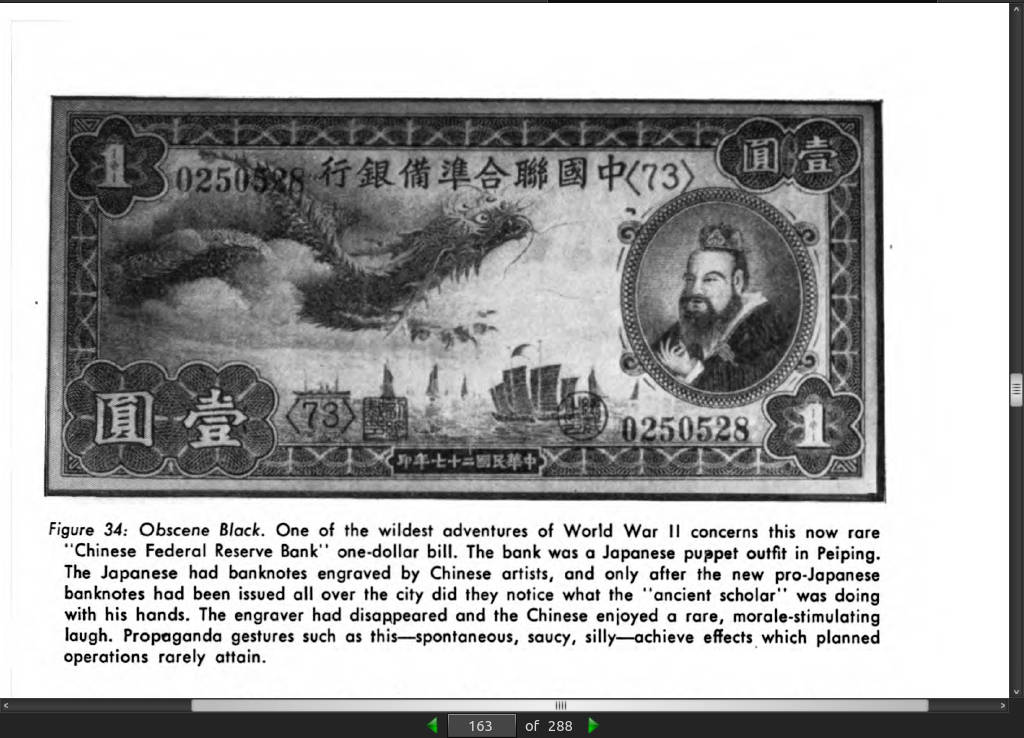
page 164:
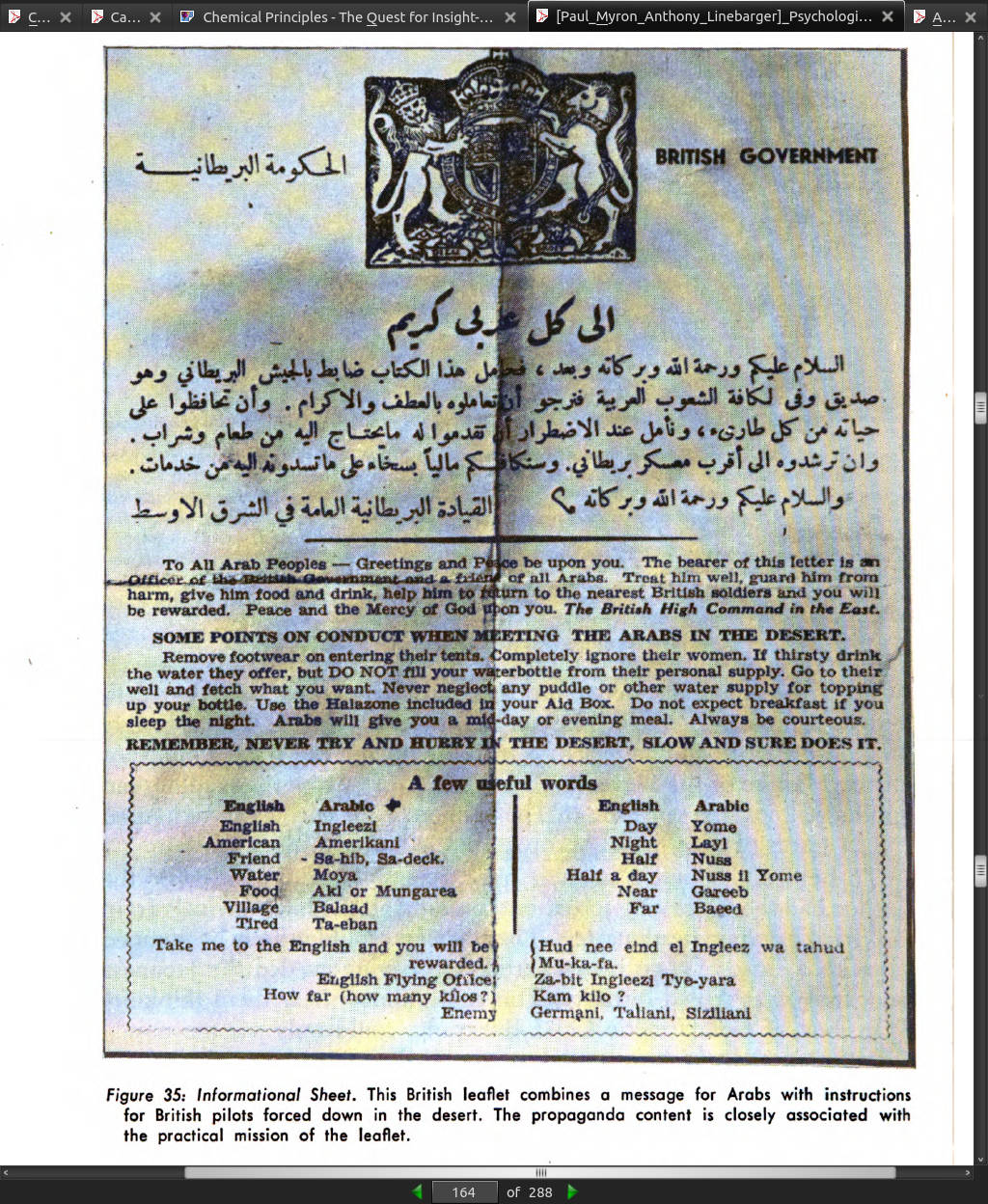
page 165:
- The poor propagandist tries to butt in on every fight, even when there is none.
page 166:
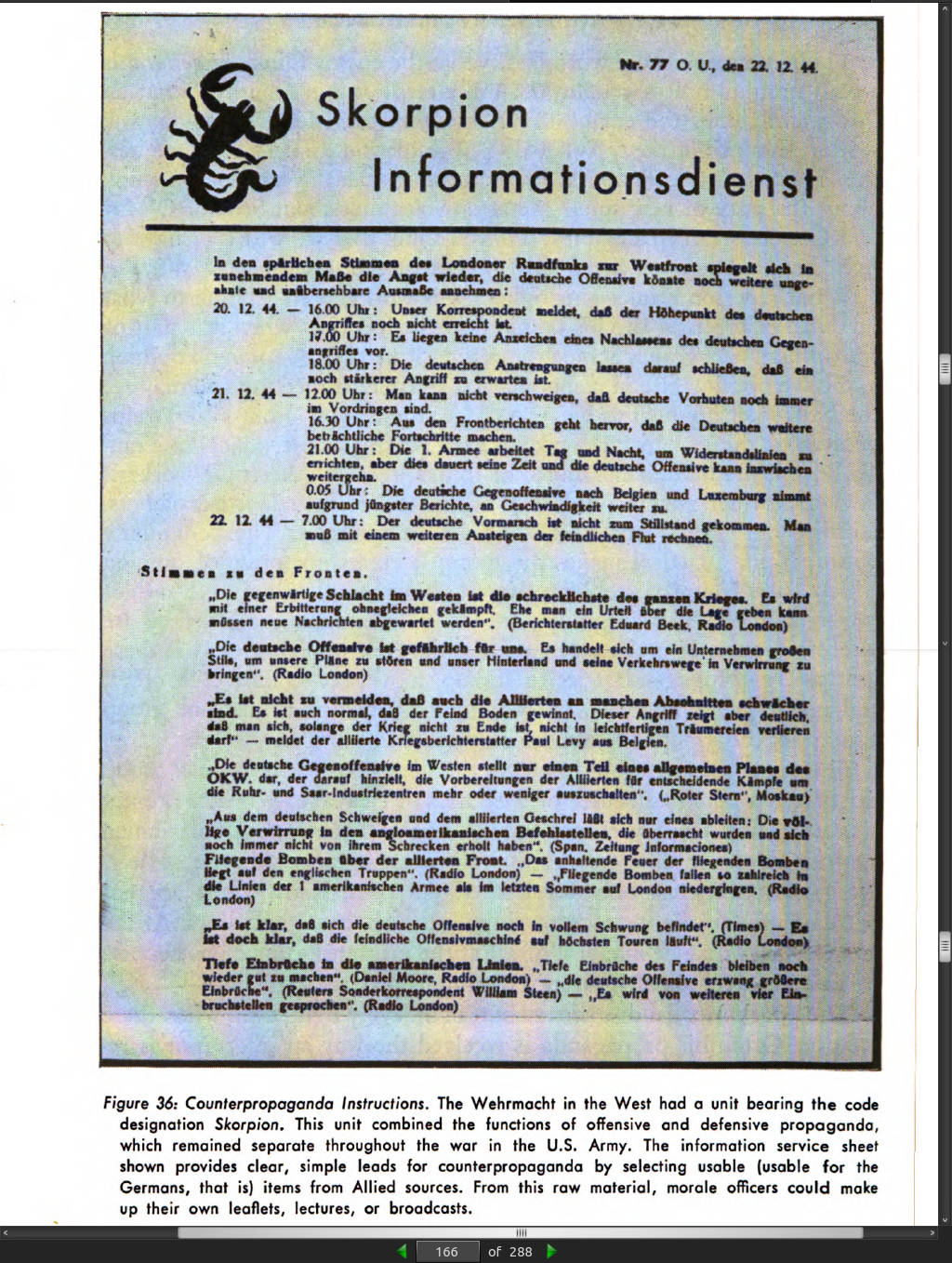
page 168:
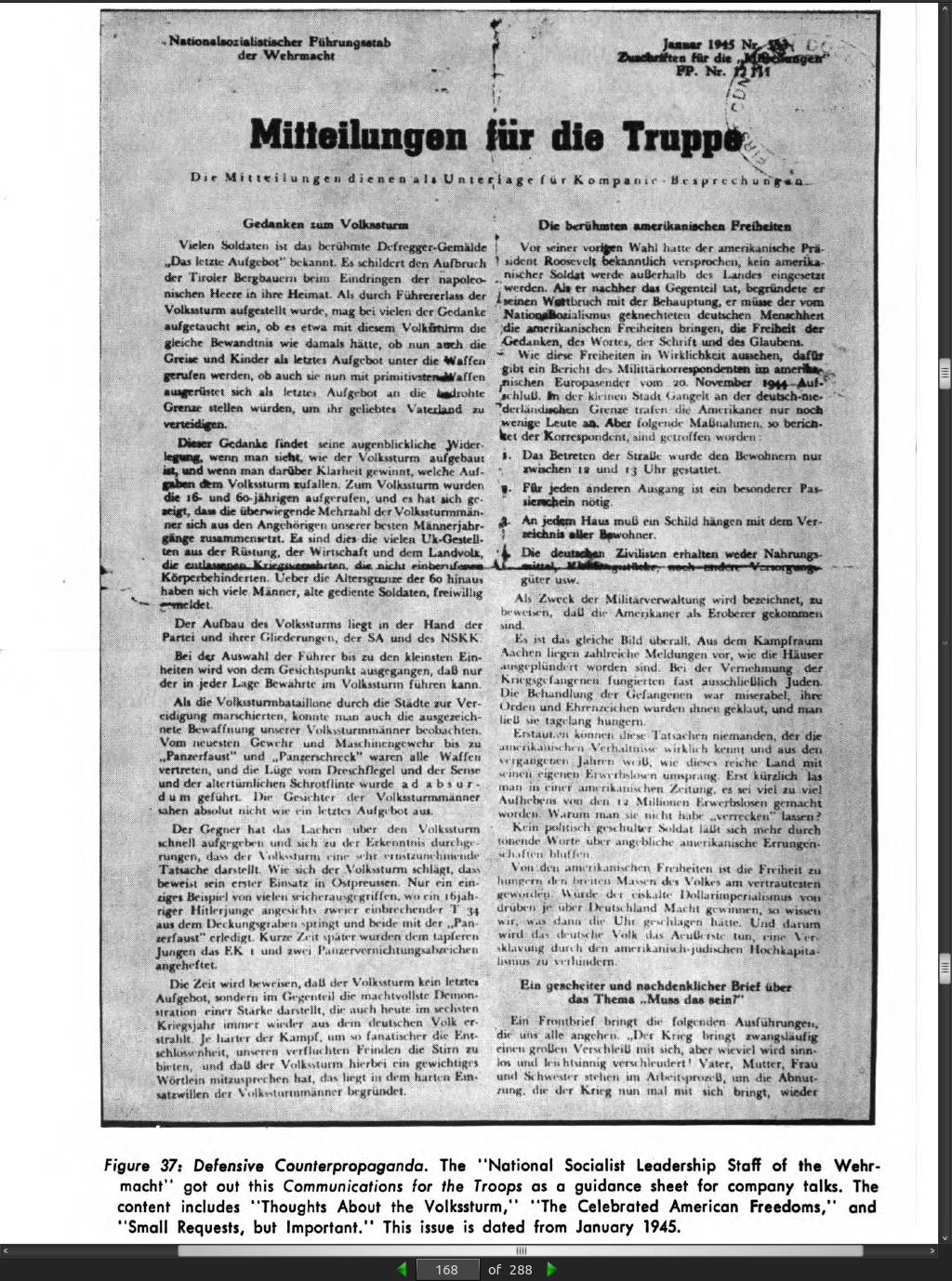
page 170:
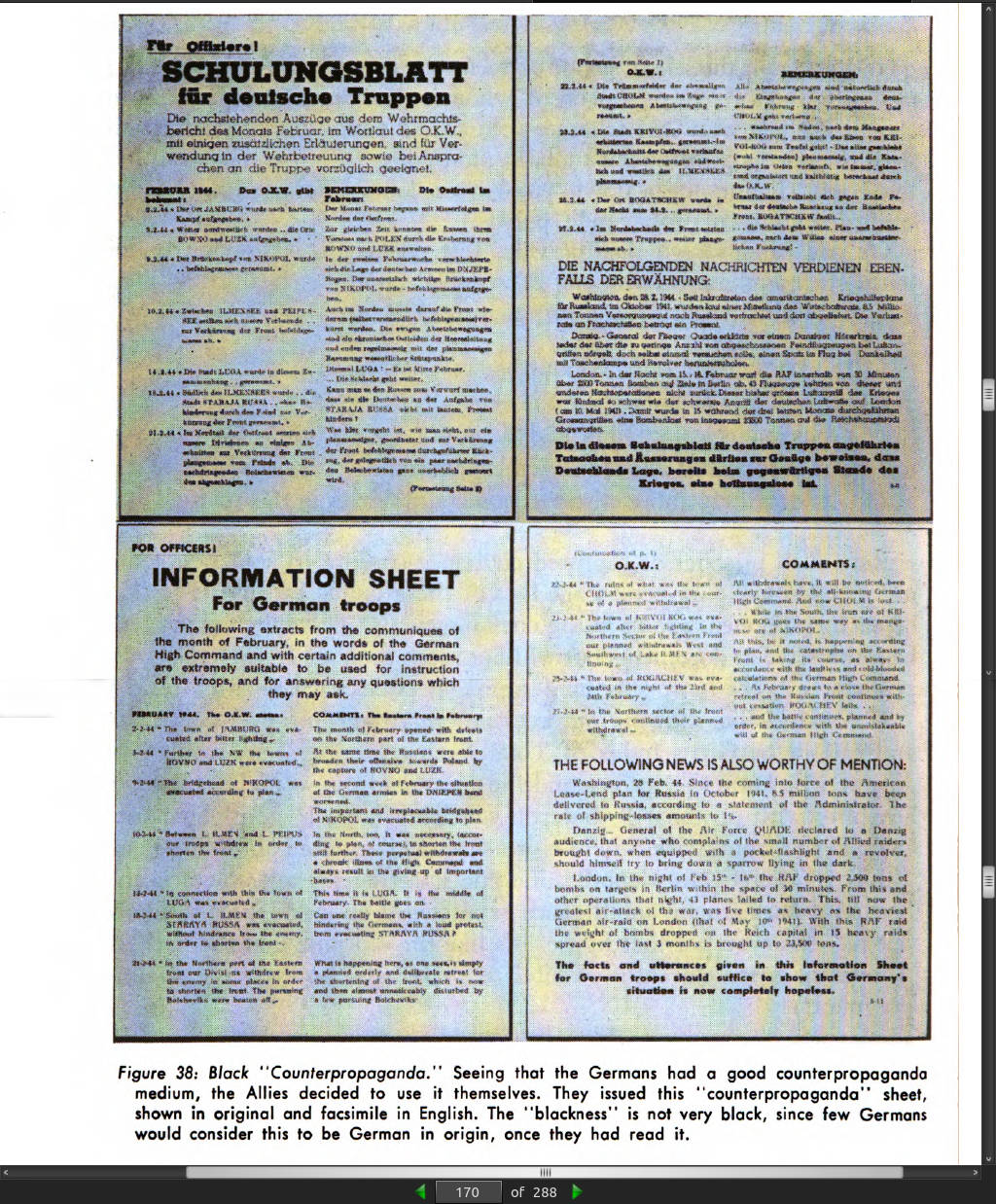
page 182:
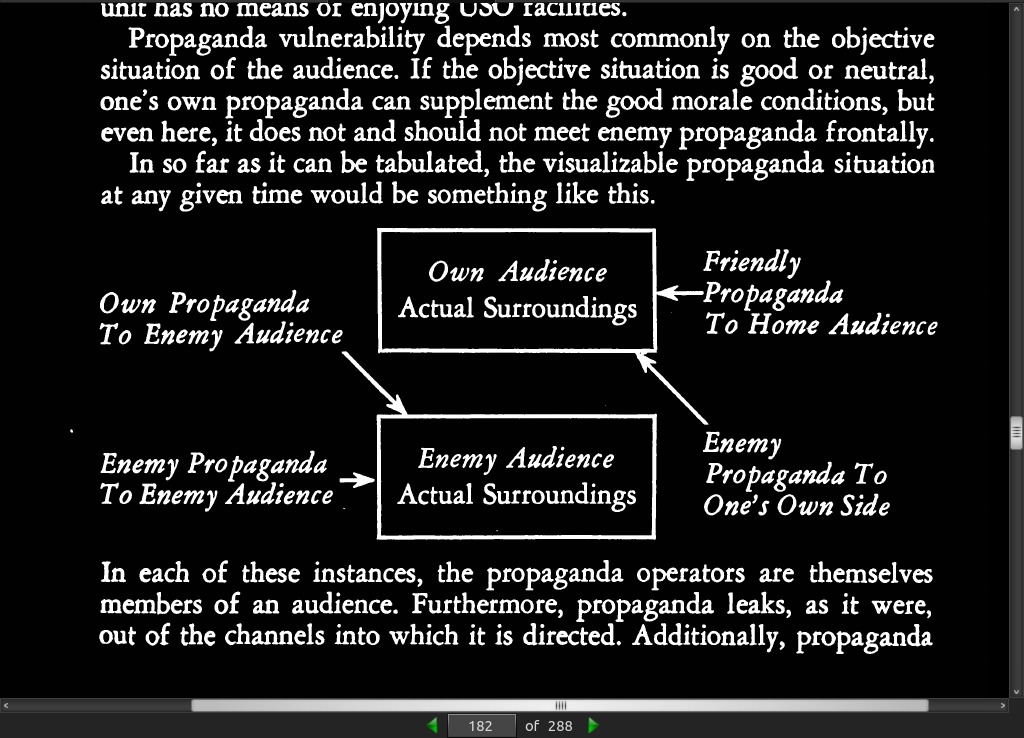
· Chapter 9: Estimate of the Situation
page 184:
c. Correlation of Psychological Warfare with
1. Public relations programming
2. Information and education plans
3. Medical plans and reporting
4. Countersubversive functions
- Propaganda can be used in conjunction with whatever is currently in the media. For example use a movie award show as a jumping off point to introduce Hollywood’s position in shaping culture.
· PART THREE: PLANNING AND OPERATIONS
· Chapter 10: Organization for Psychological Warfare
page 191:
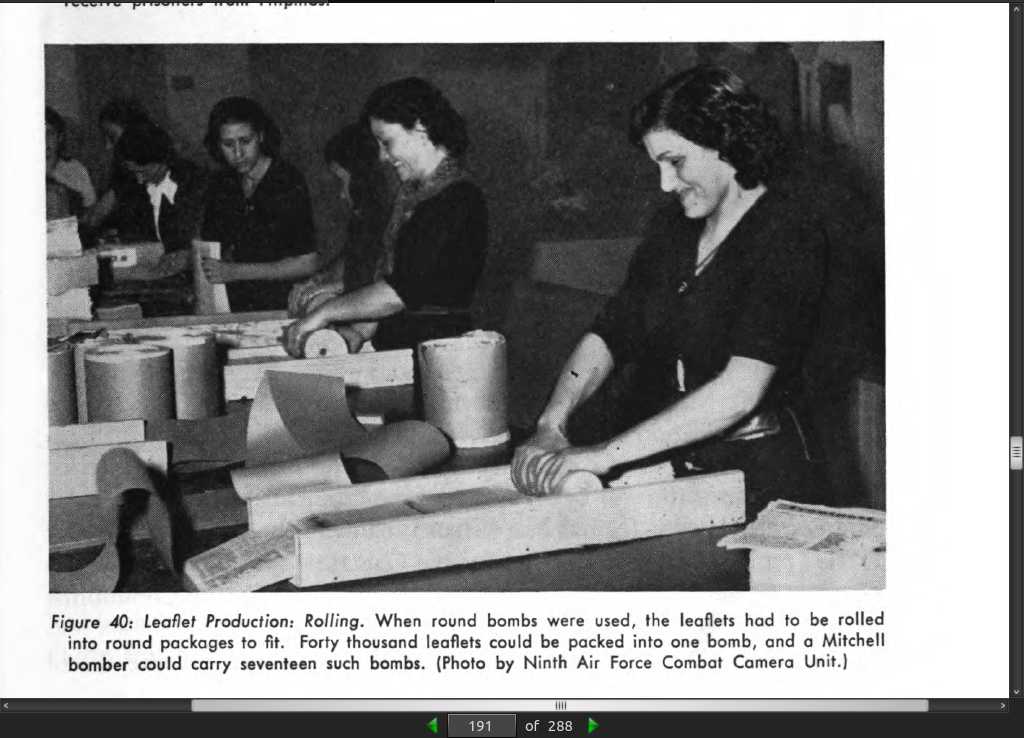
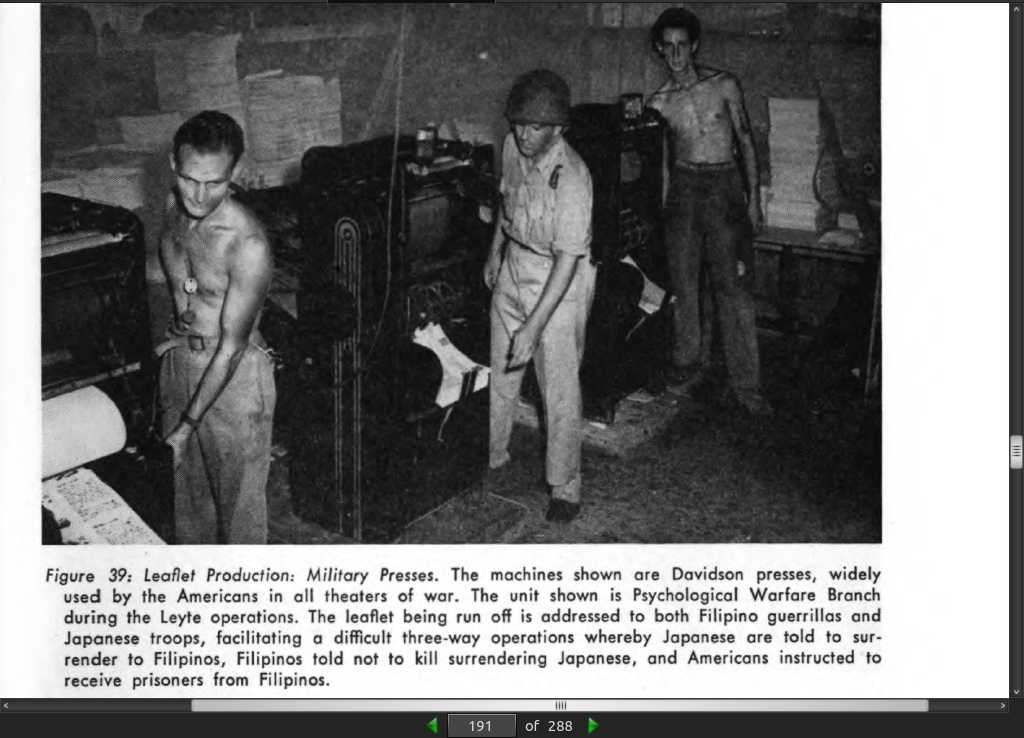
page 192:
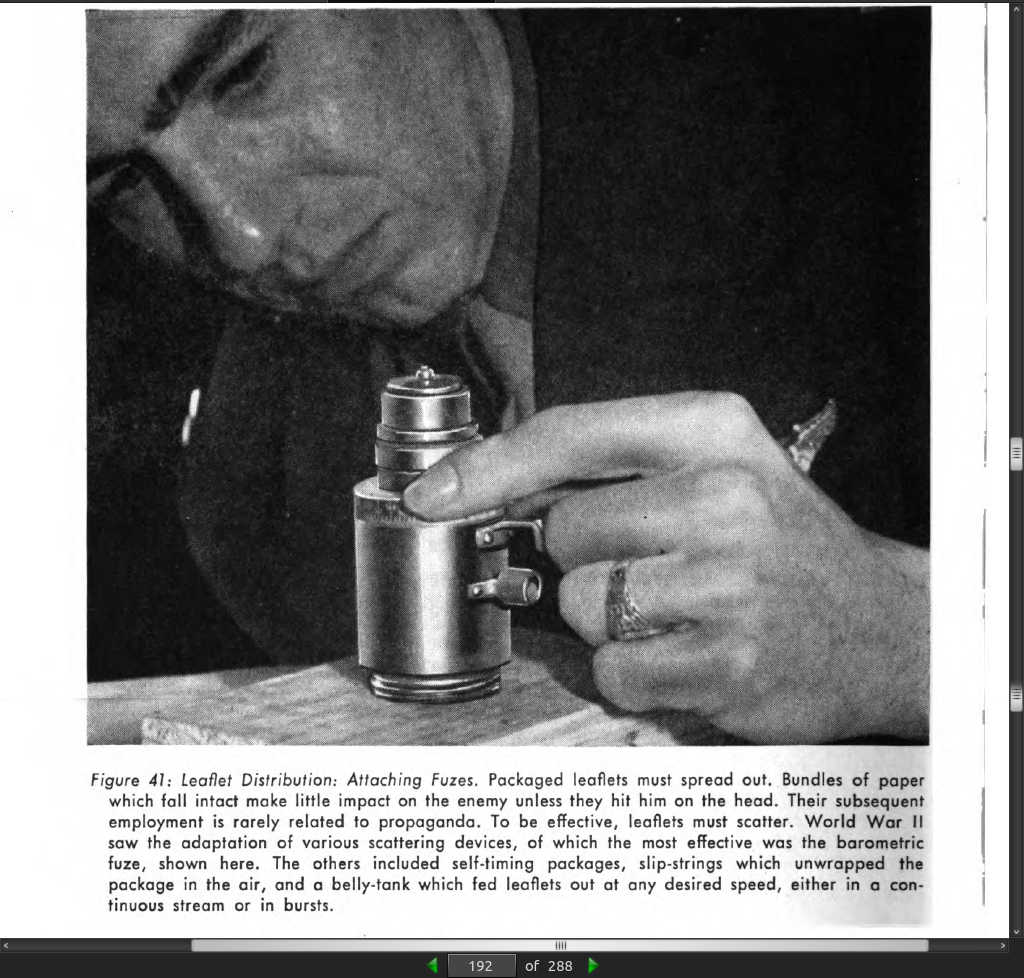
page 193:

page 194:
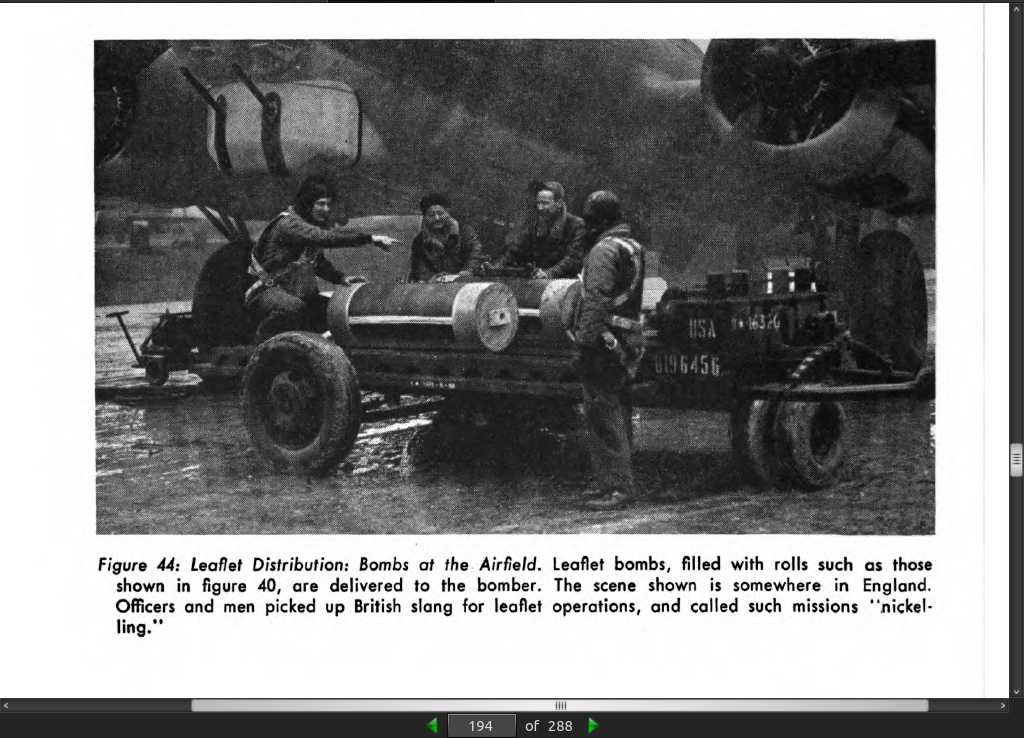
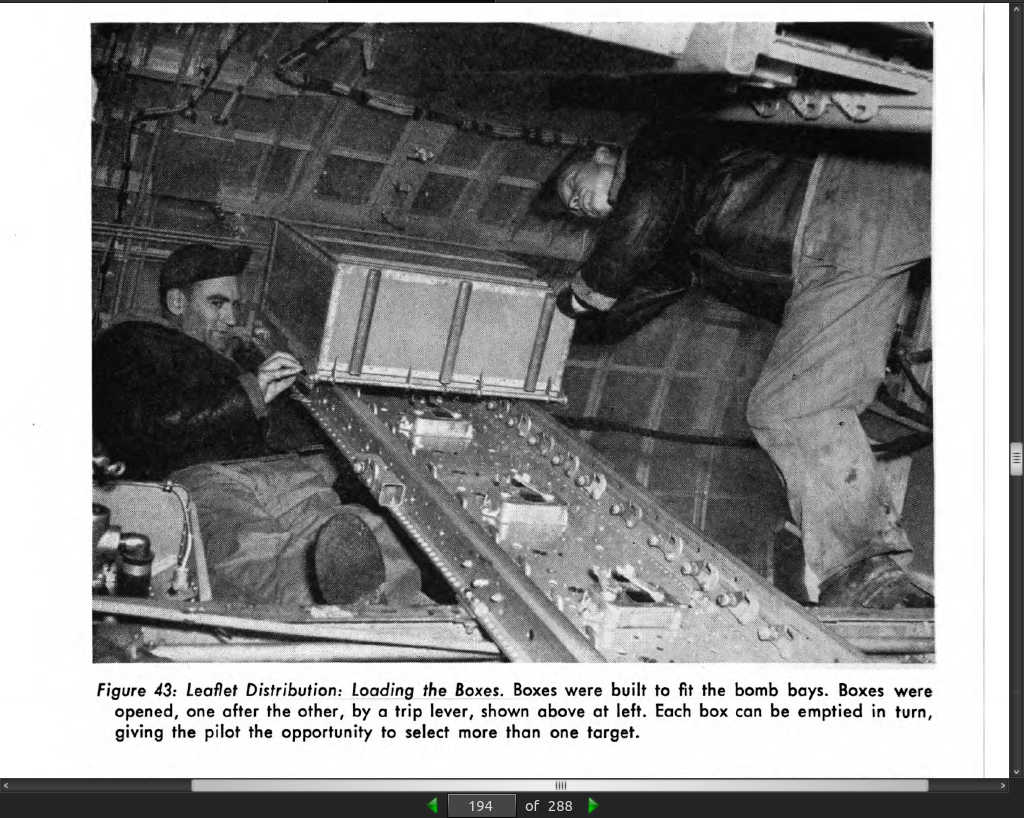
page 195:
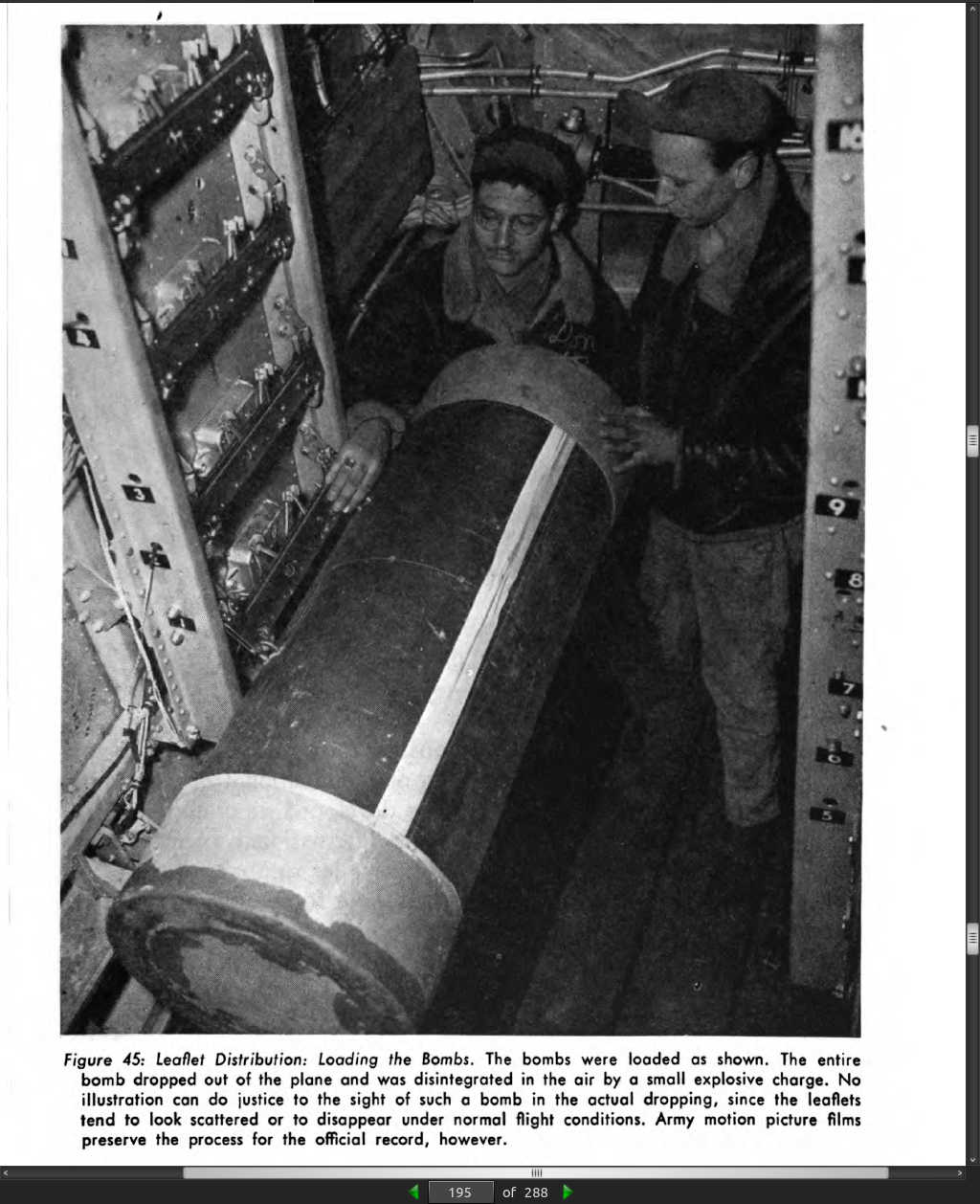
page 196:
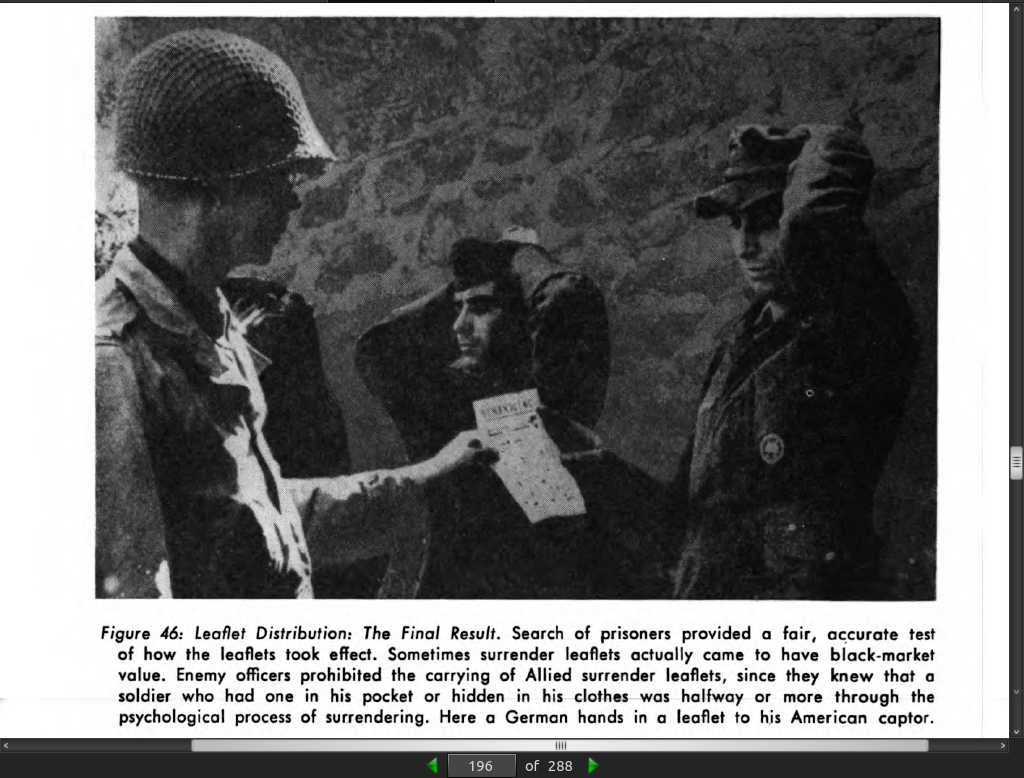
page 197:
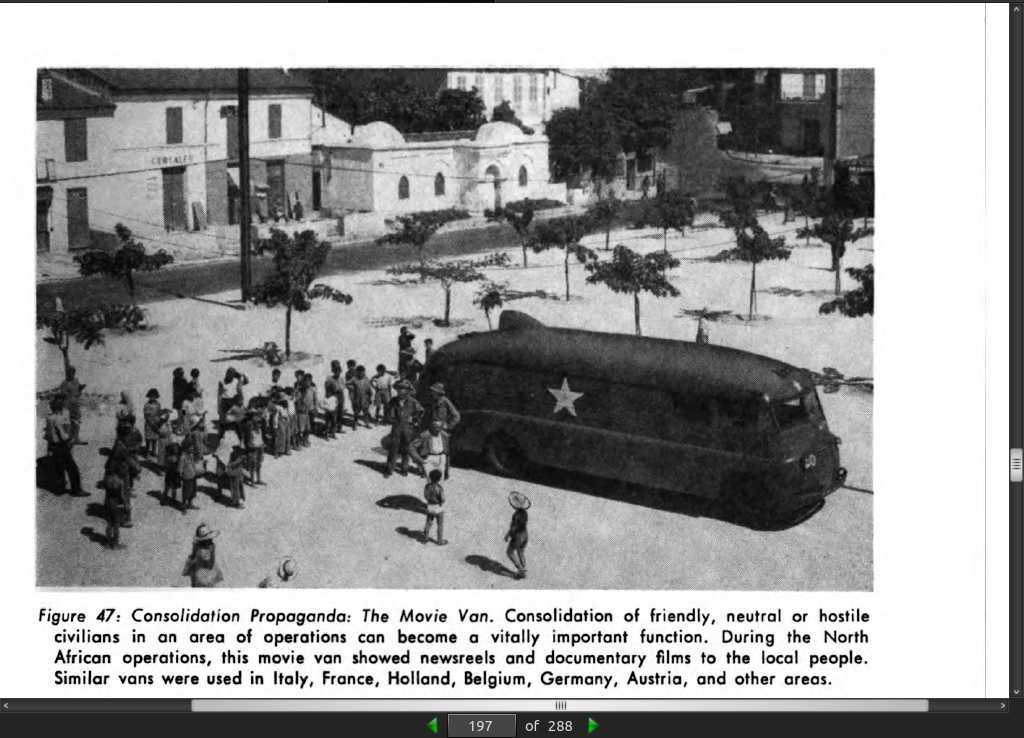
page 198:
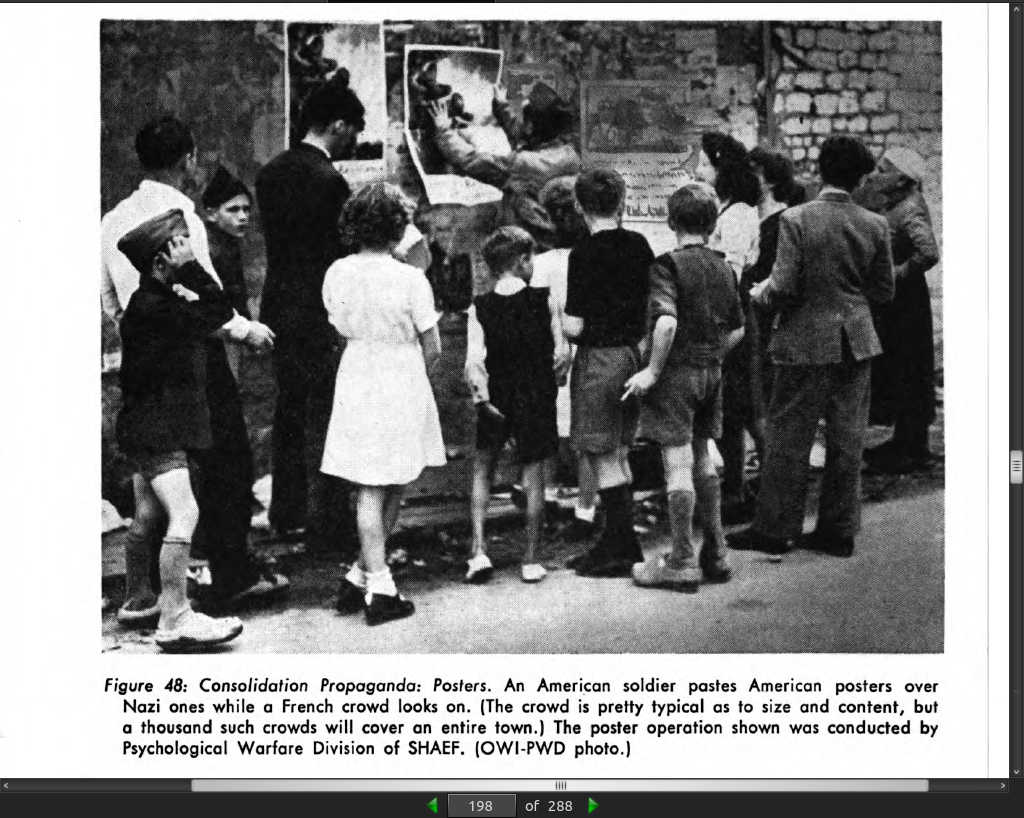
page 199:
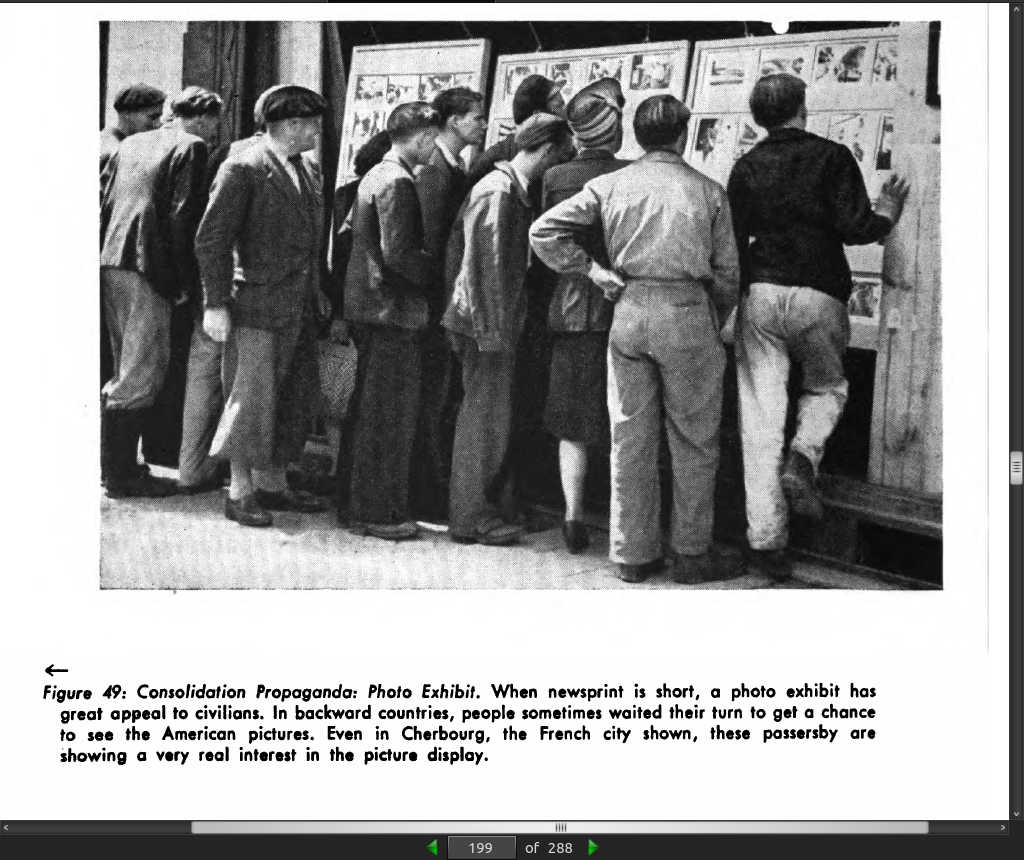
page 202:
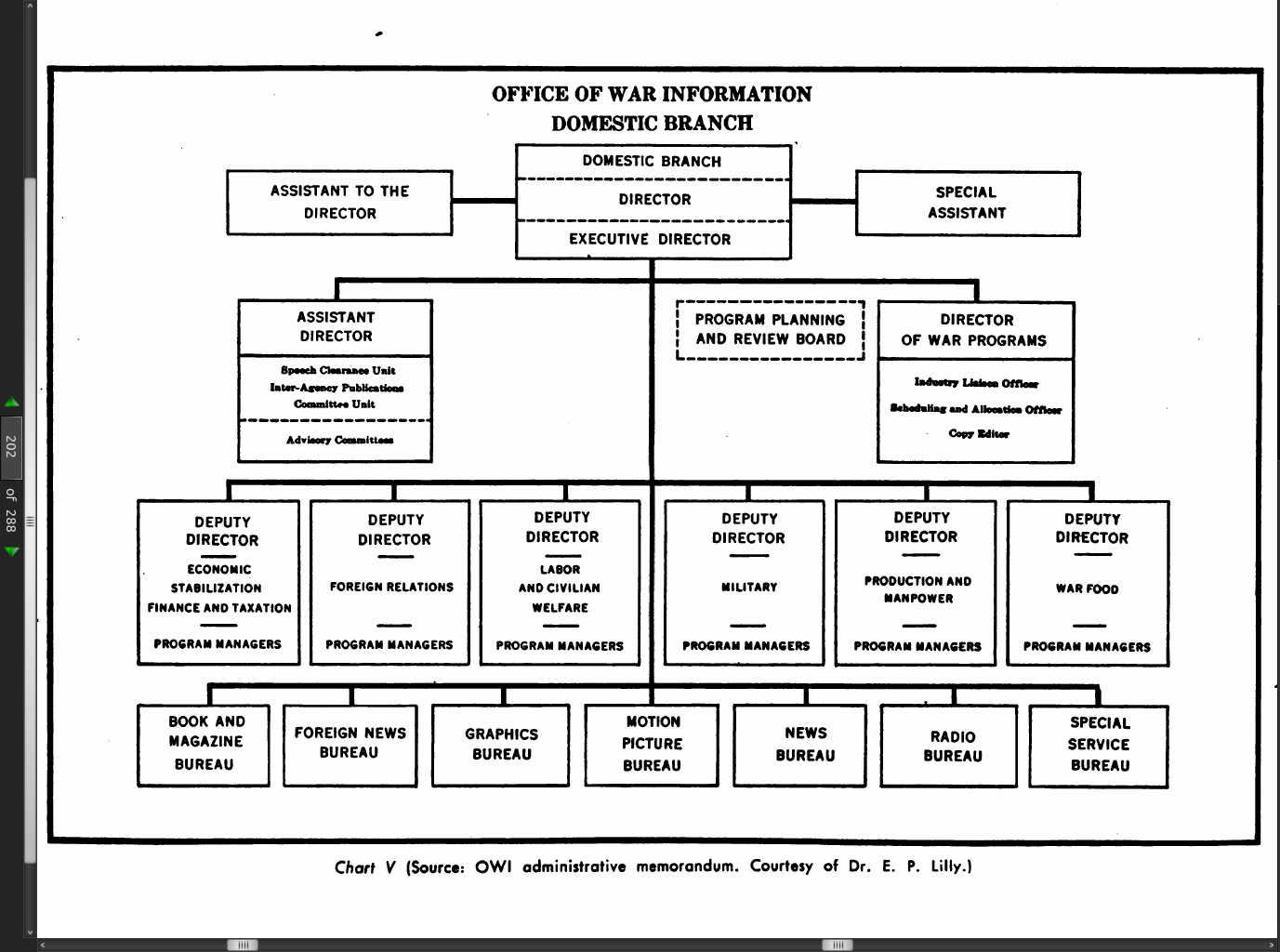
page 203:
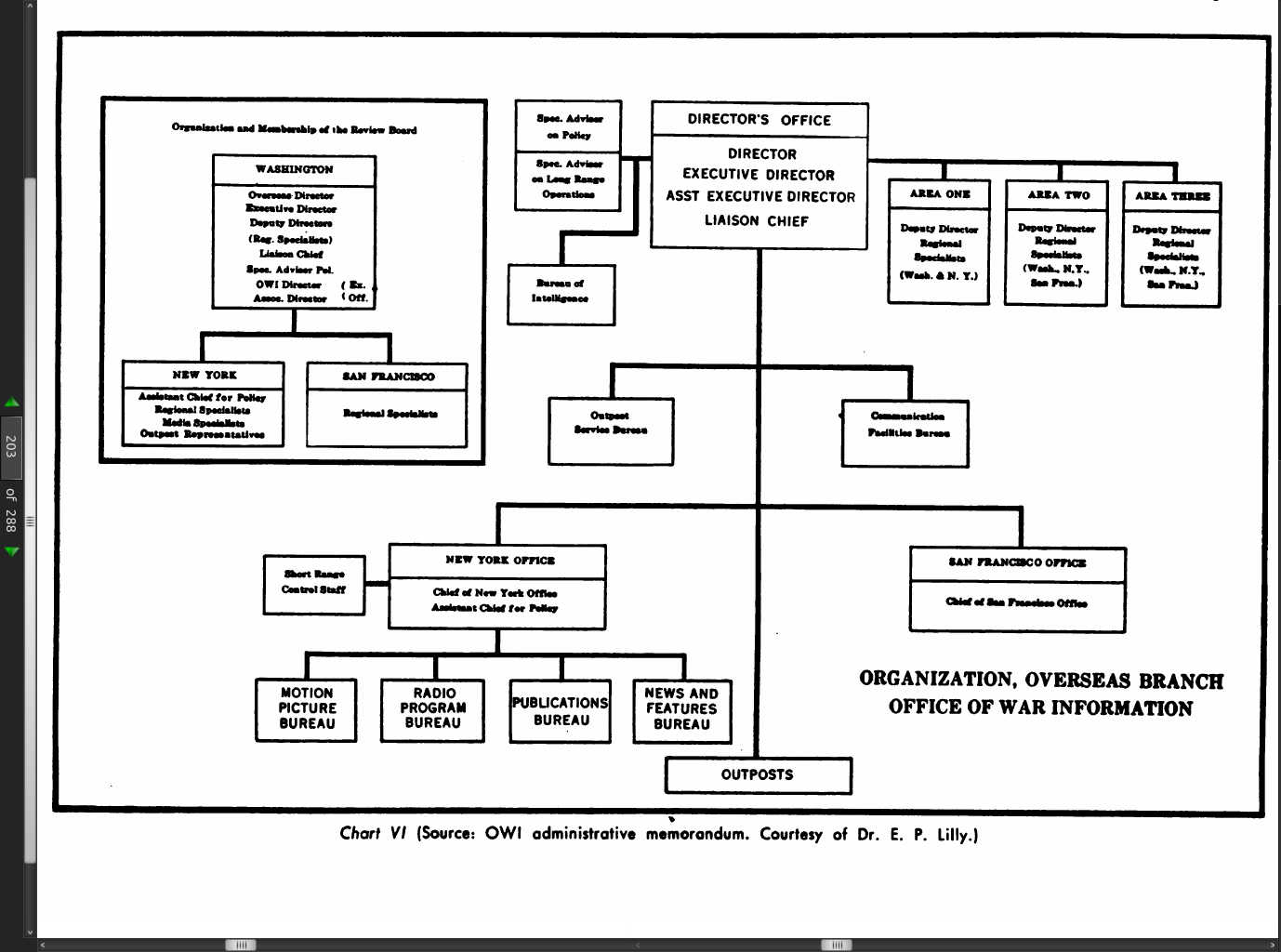
page 205:
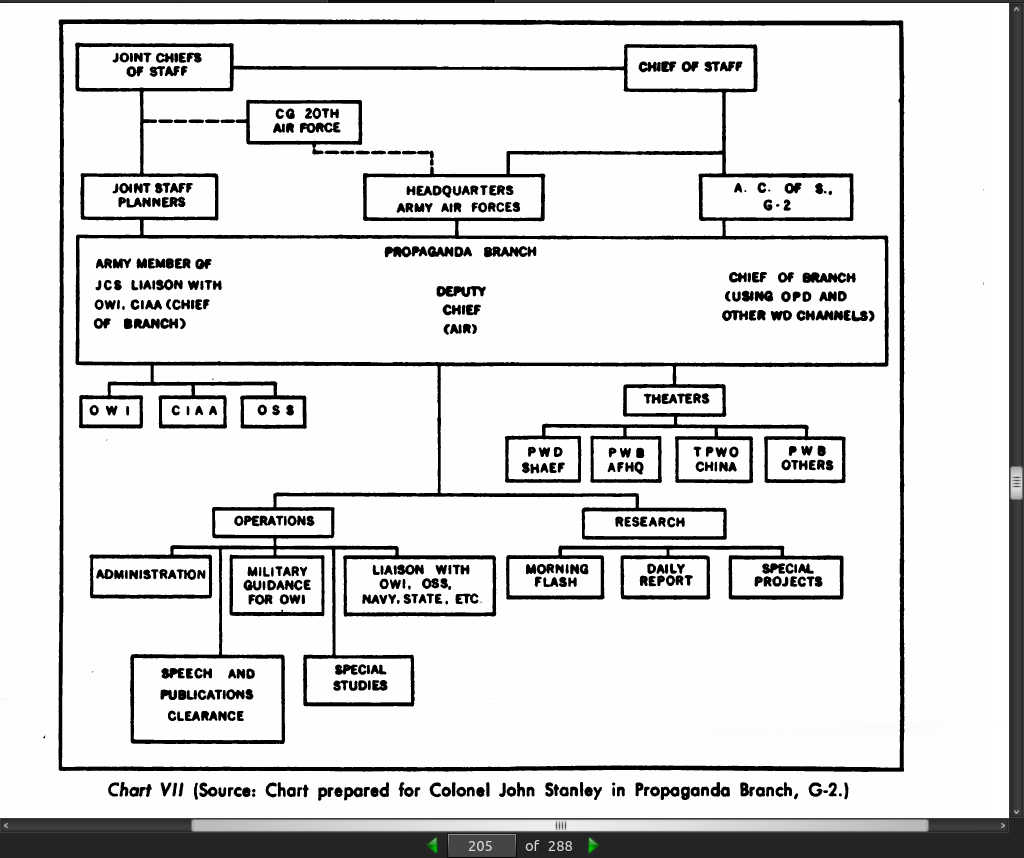
page 207:
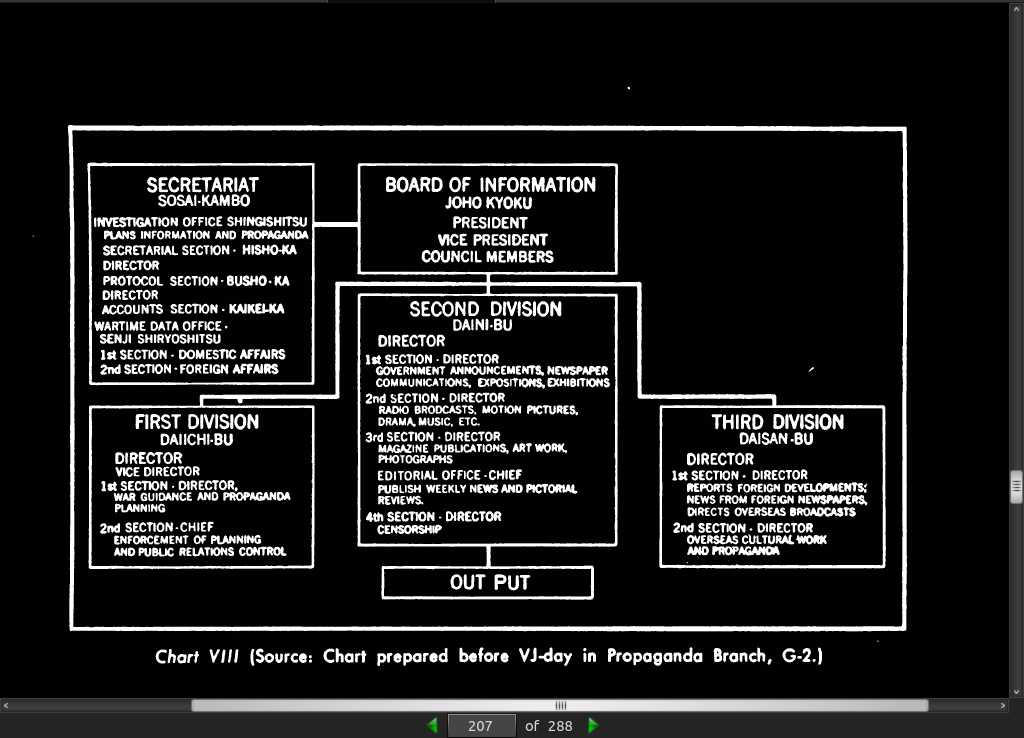
page 211:
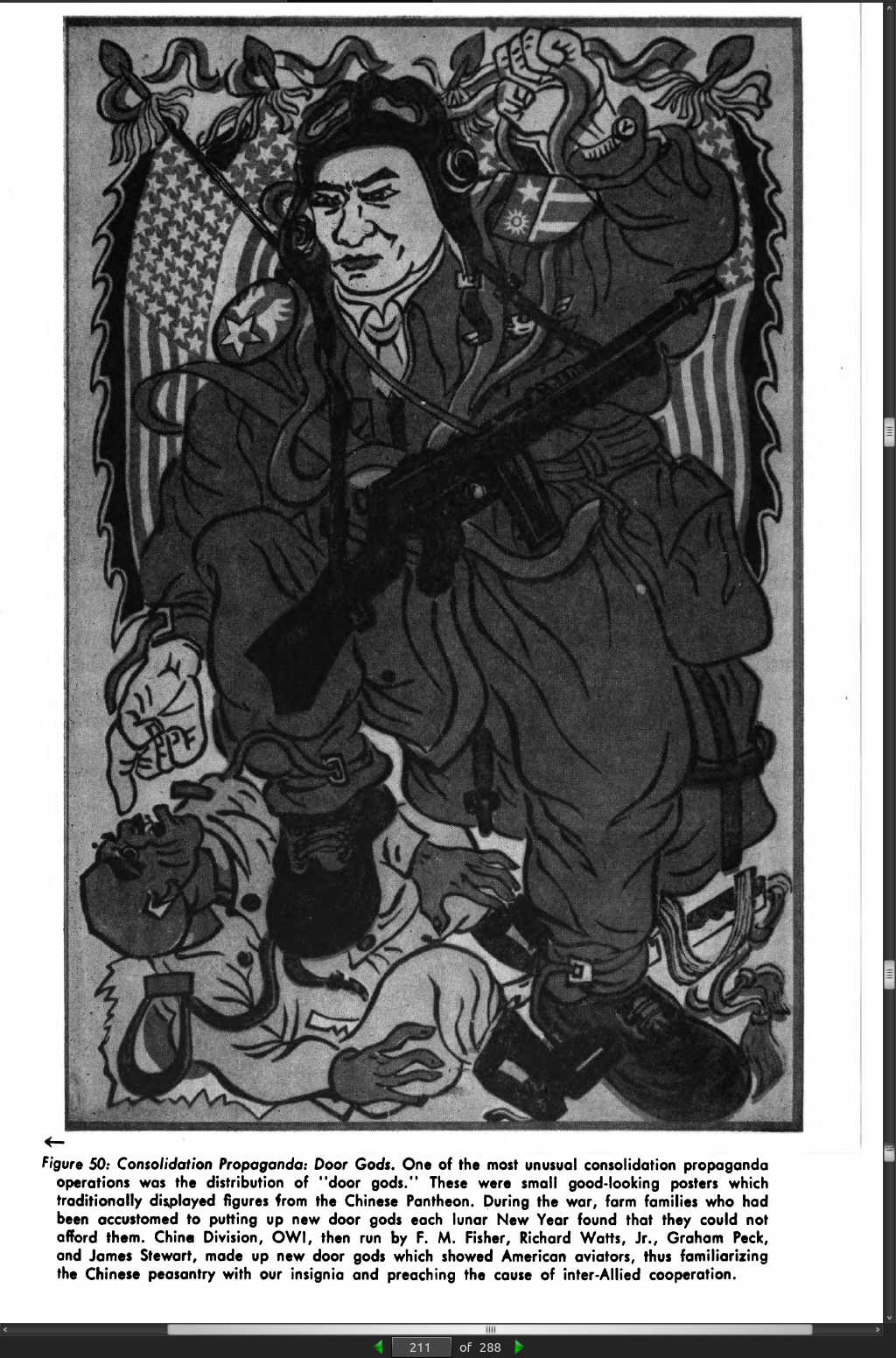
page 212:
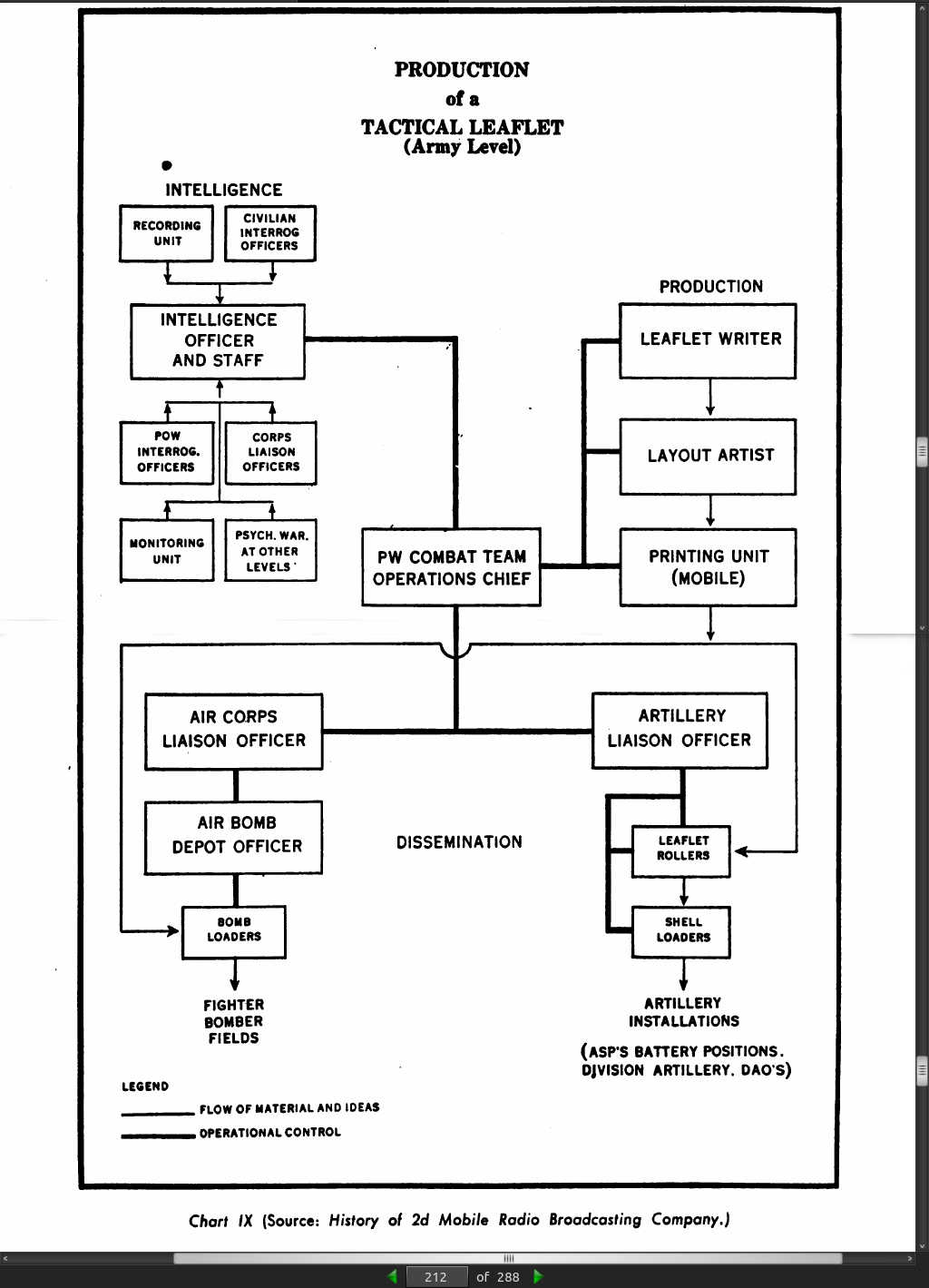
· Chapter 11: Plans and Planning
page 217:
- The person who has to be told day in and day out how to operate is no operator at all.
page 219:
-
Where radio propaganda is in question, the script-writers and broadcasters will read the enemy radio propaganda if they do not get enough fresh non-propaganda material concerning their audience. Sooner or later this will degenerate into alternate soliloquies of the radio men on each side, each watching the other to see if he got a rise out of him last time. OWI people frequently expressed idiot glee at having made Radio Tokyo frantic. The OWI men were the first to admit that their glee was pointless, since it was the Japanese broadcaster and not the Japanese audience who responded.
-
Being attacked by trolls online shows only that they are riled by your words and not that the audience has well received the message.
page 221:
- [Propaganda planning] states the maximum goals
which psychological warfare can, with honest realism, be counted on to
accomplish if all goes well.
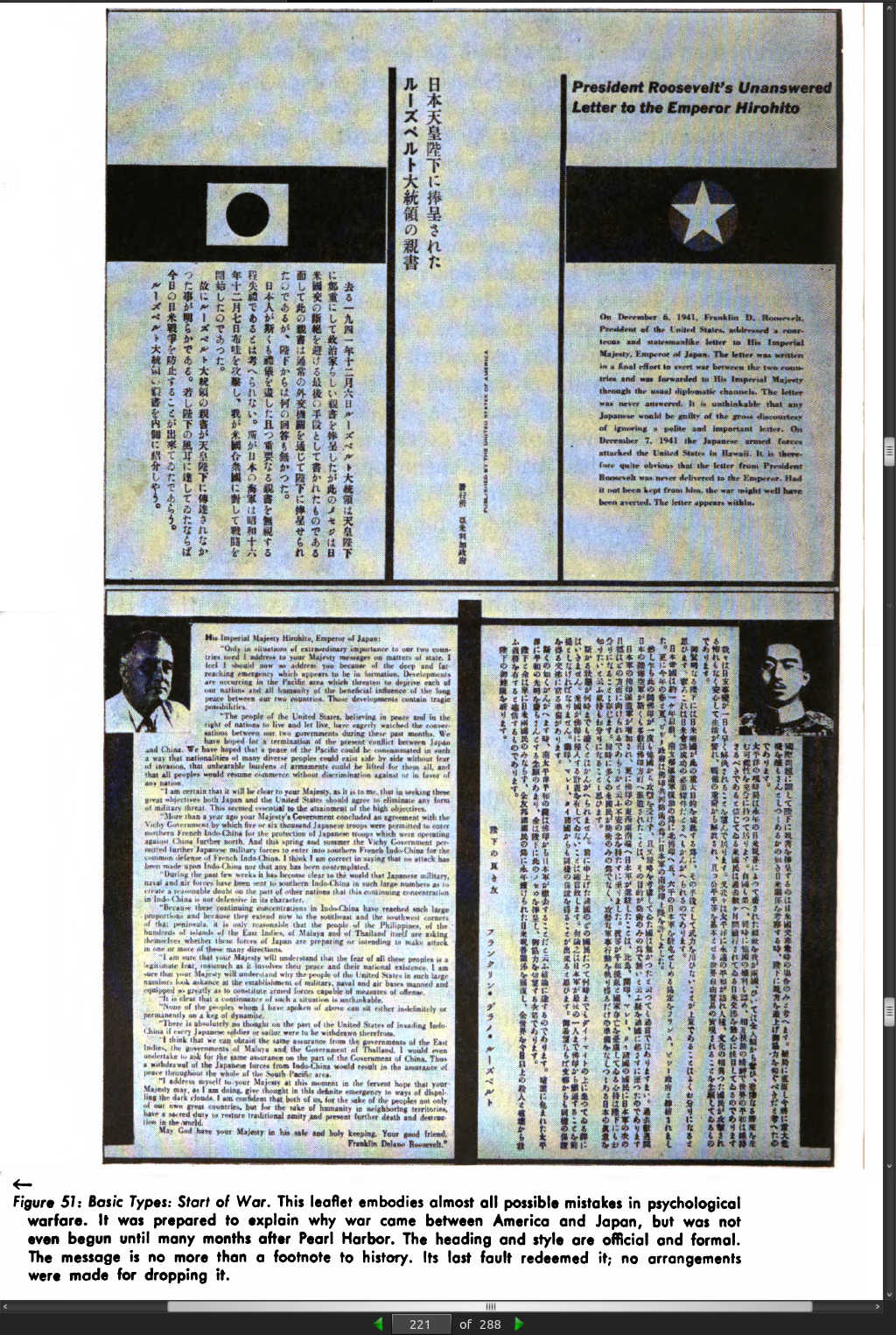
· Chapter 12: Operations for Civilians
page 225:
- psychological warfare operates against civilians with as much effect as it does against troops. Indeed, under the rather high standards set for modern warfare by The Hague and Geneva conventions, psycho logical warfare is left as one of the few completely legitimate weapons which can on occasion be directed against an exclusively civilian and noncombatant target.
page 227:
- [News] should be factual but selectively factual. Repetition of basic themes is much more important than the constant invention of new ones.
page 228:
-
Repetition broadens the audience. Most will not here all, or even most, of the propaganda.
-
What is deadly monotonous to the propagandist himself may, on the thousandth repetition, merely have become pleasantly familiar to the Propaganda Man on the other end.
page 229:
-
On leaflets:
-
Novelty materials appealing to children, who are apt to be among the most industrious collectors of leaflets, disseminating them far and wide with less danger of reprisal from the occupying power or the police than adults might face. (Good adult leaflets are as interesting to children as are leaflets especially designed for them. The use of color printing, vivid illustrations, pictures of air battles, how-it-works diagrams of weapons, and so forth, may reach the teen-age audience best if it gives no indication of being aimed at them.)
-
Appeals to women. (Women, statistically, are around 50% of the population of any country. With the diversion of men to fighting operations the percentage of women in the home population rises and in wartime it may become 60% or 70%.
page 231:
- The dropping of a few hundred tons of well counterfeited currency would tend to foul up any fiscal system. Peacetime counterfeiters operate with poor materials, secretly, and in small shops. When instructed, a government agency can do an astoundingly good job of counterfeiting.
page 232:
-
motion pictures for civilians can be employed as a major propaganda instrument. The combination of visual and auditory appeal ensures a concentration of attention not commanded by other media.
-
Perhaps television may in course of time combine attention-holding with transmissibility.
· Chapter 13: Operations Against Troops
page 233:
-
Propaganda aimed at troops should be timely and demonstrate an understanding of the troops actual conditions. It should also paint a picture that willing capture, when surrounded, should be the course of action. Do not try to appeal directly to surrender.
-
“true loyalty requires survival and therefore surrender”.
page 234:
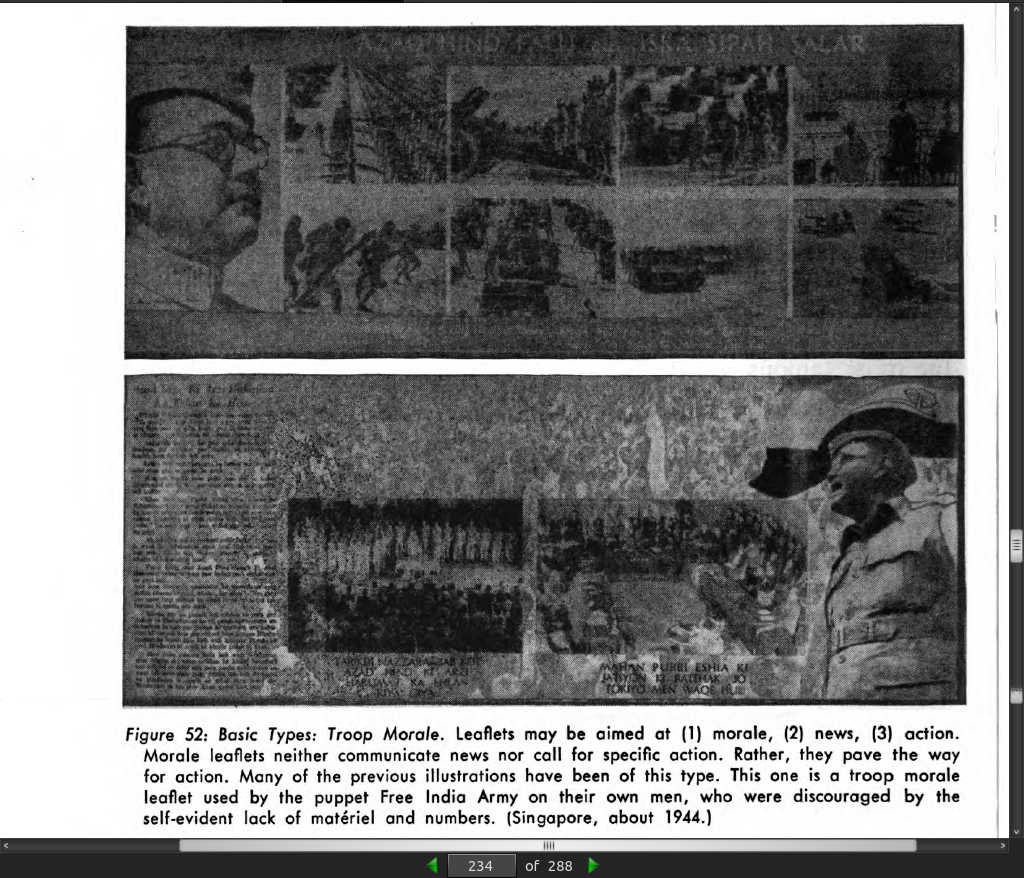
page 235:
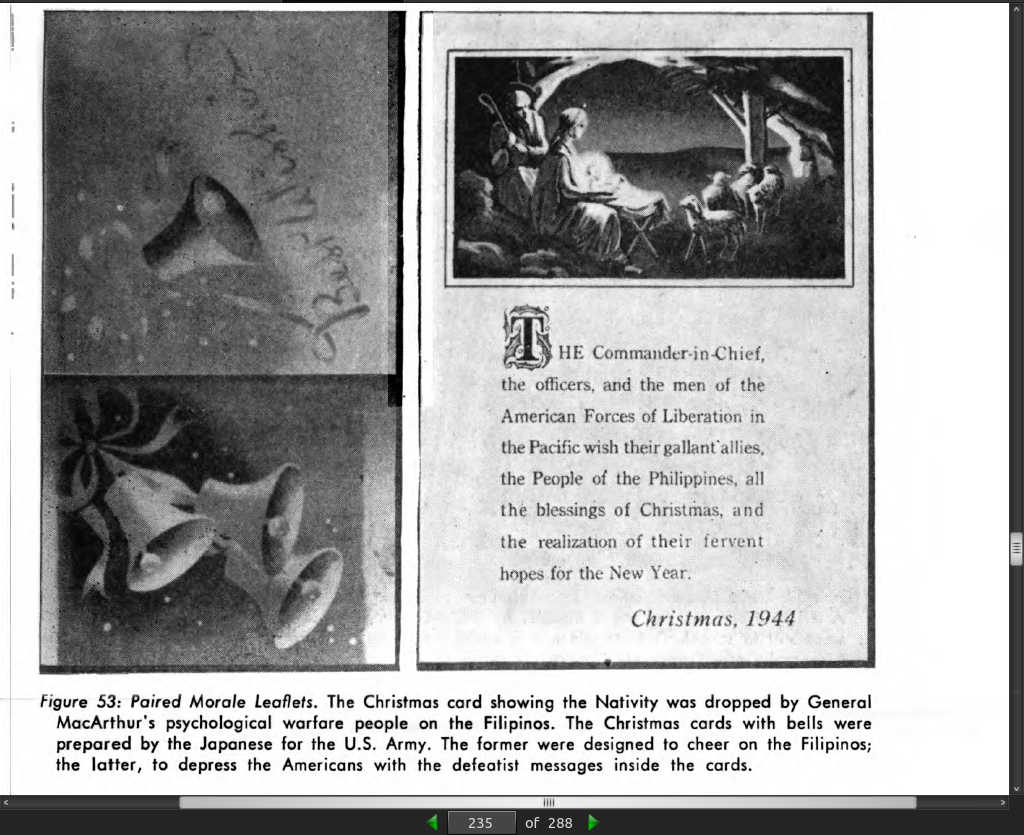
page 236:
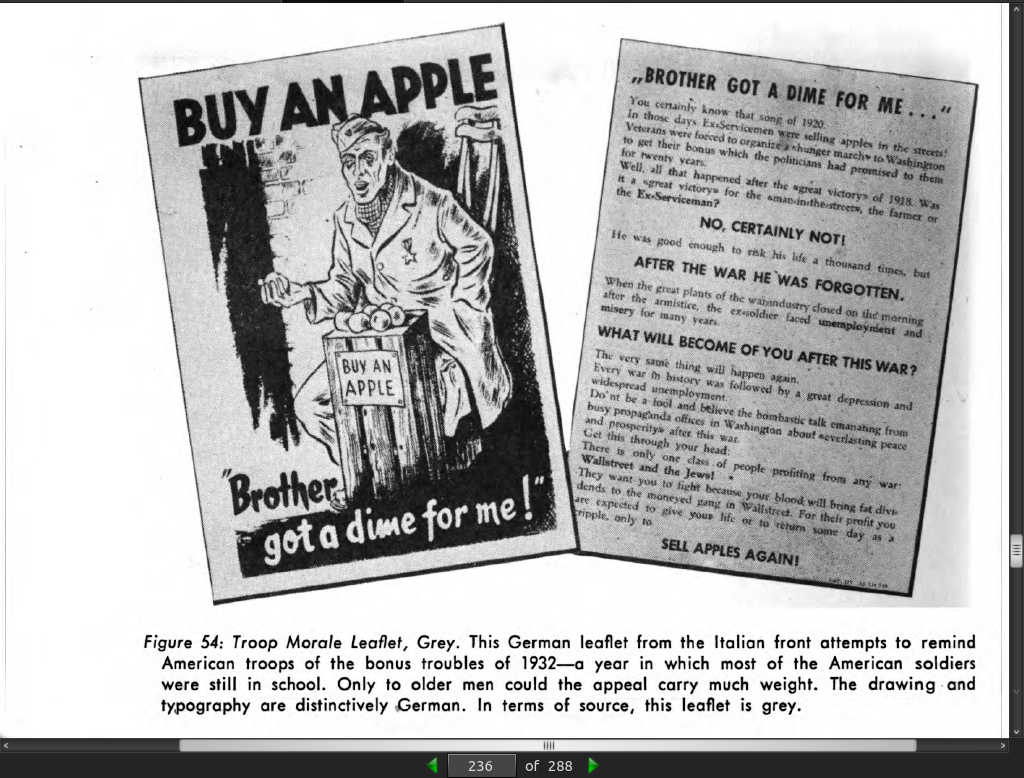
page 237:
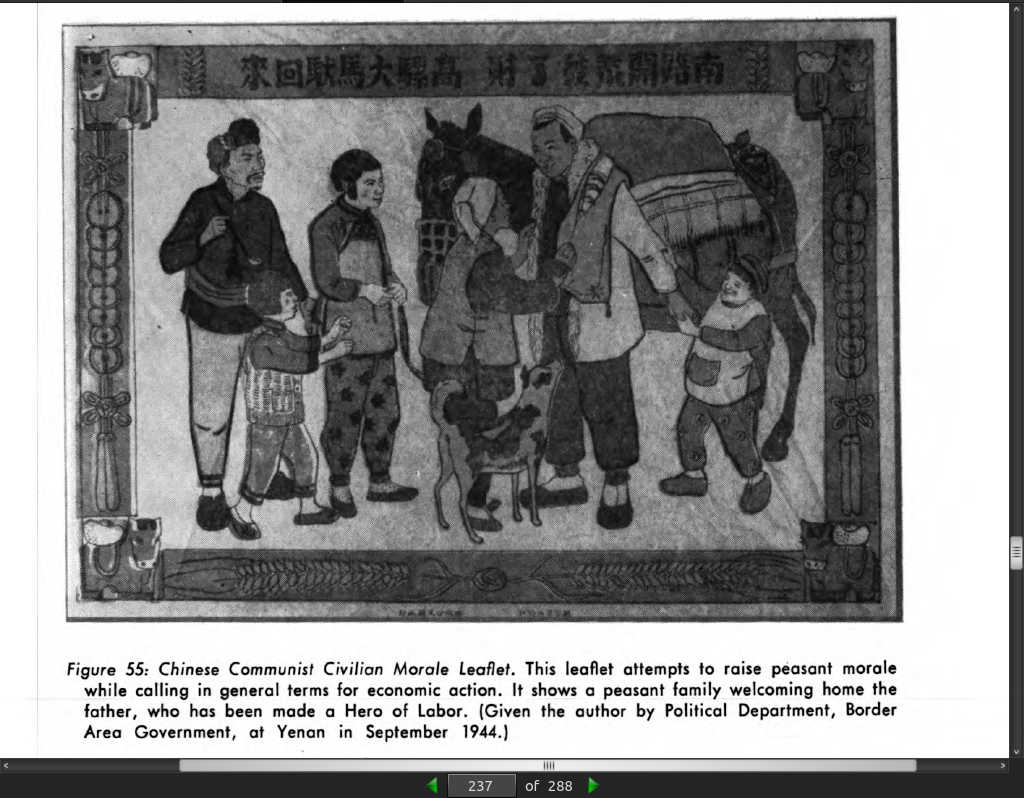
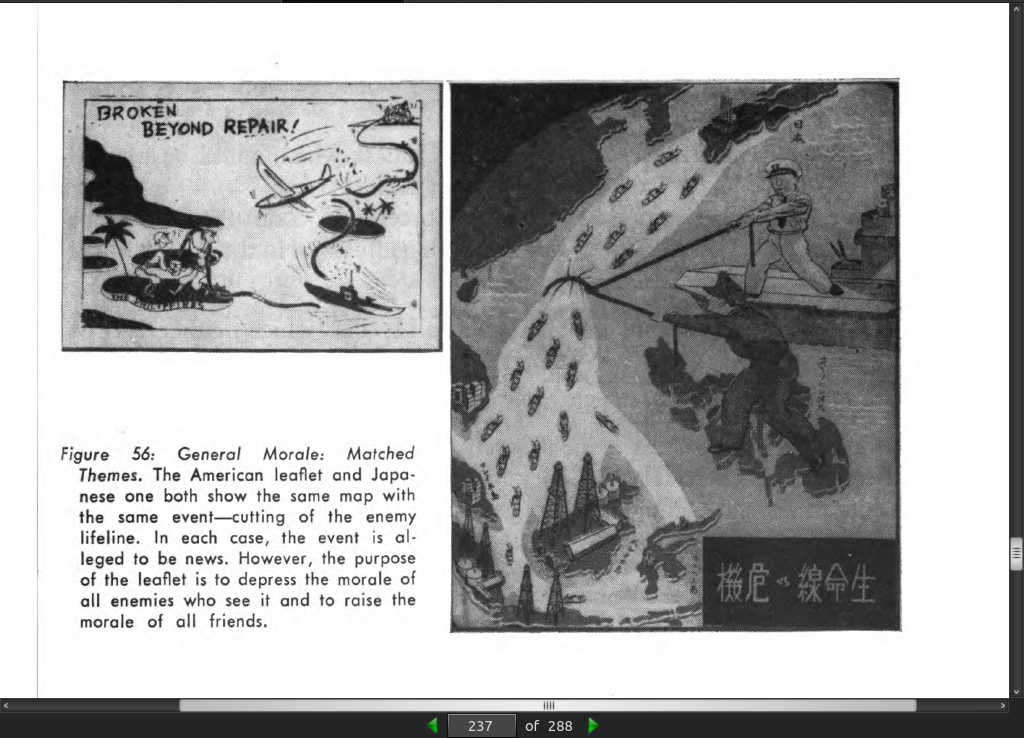
page 238:
- Congratulating imaginary agents in ostensible code over the voice radio for the excellent work they have allegedly done in the enemy home country (all theaters).
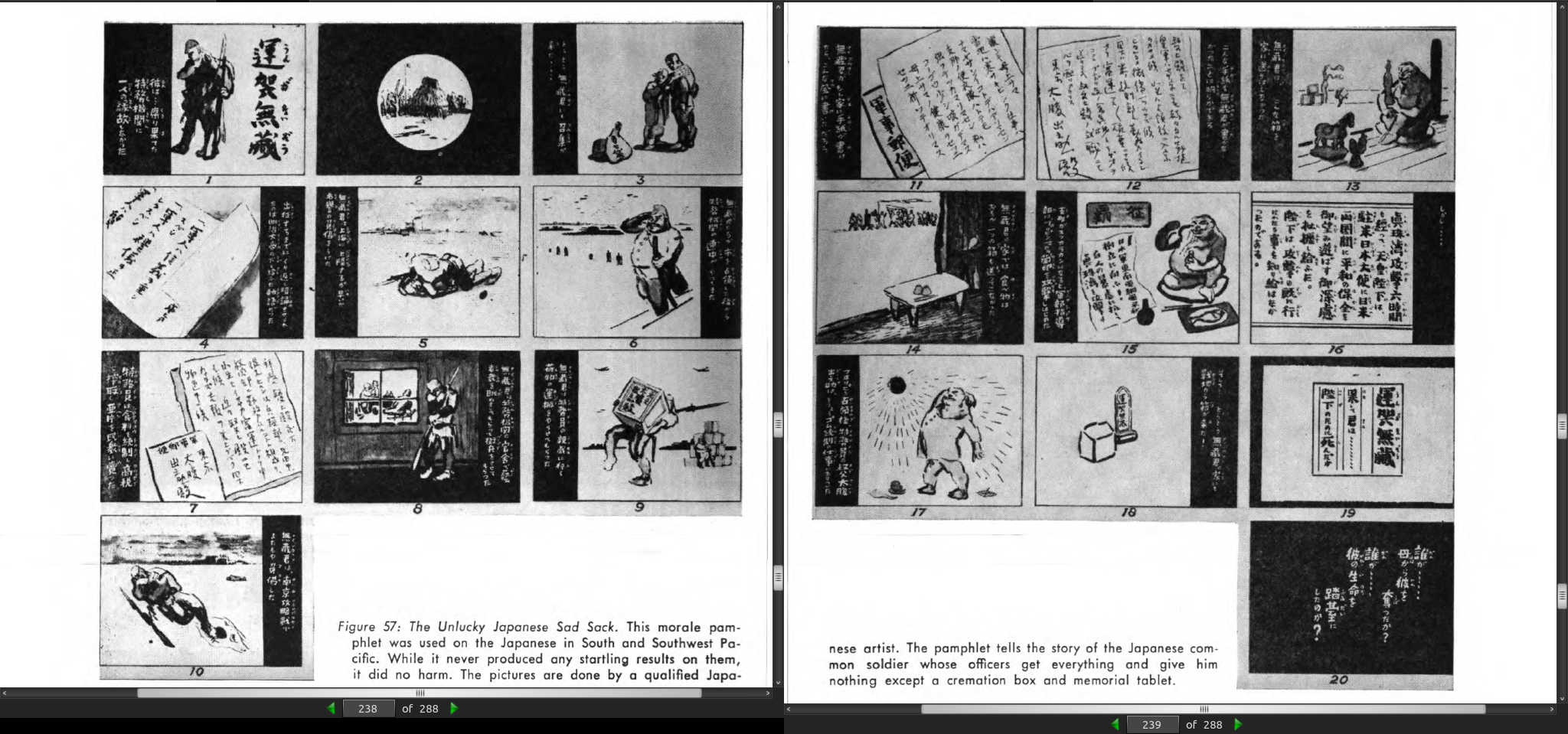
page 241:
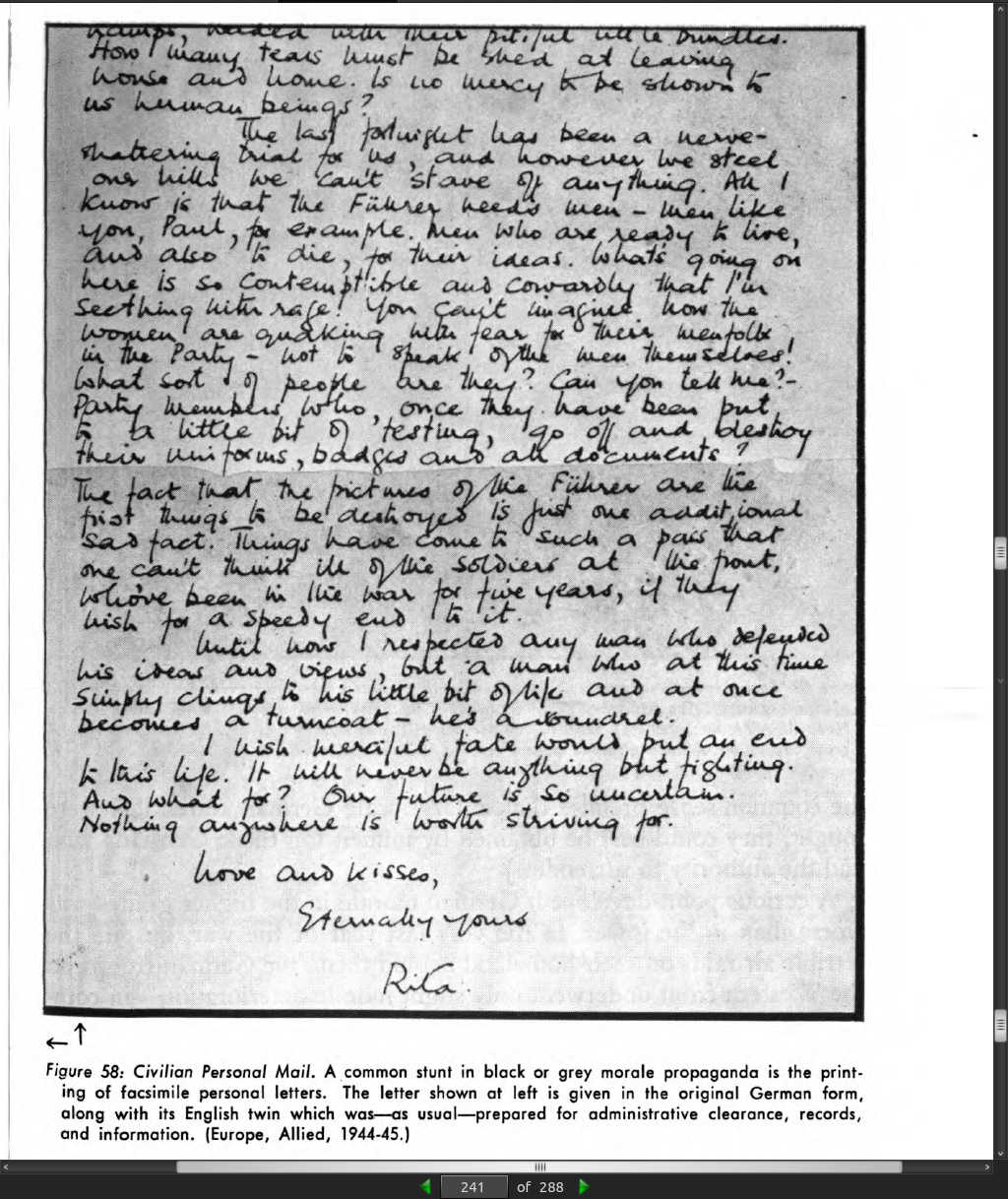
page 242:
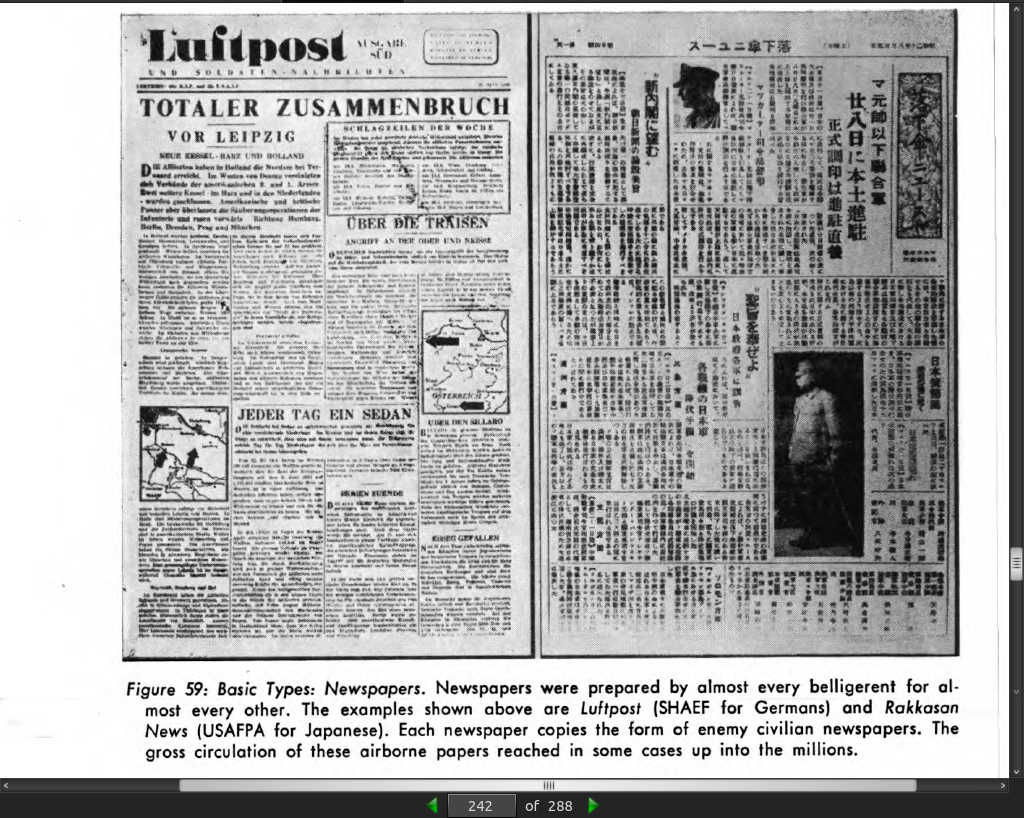
page 243:
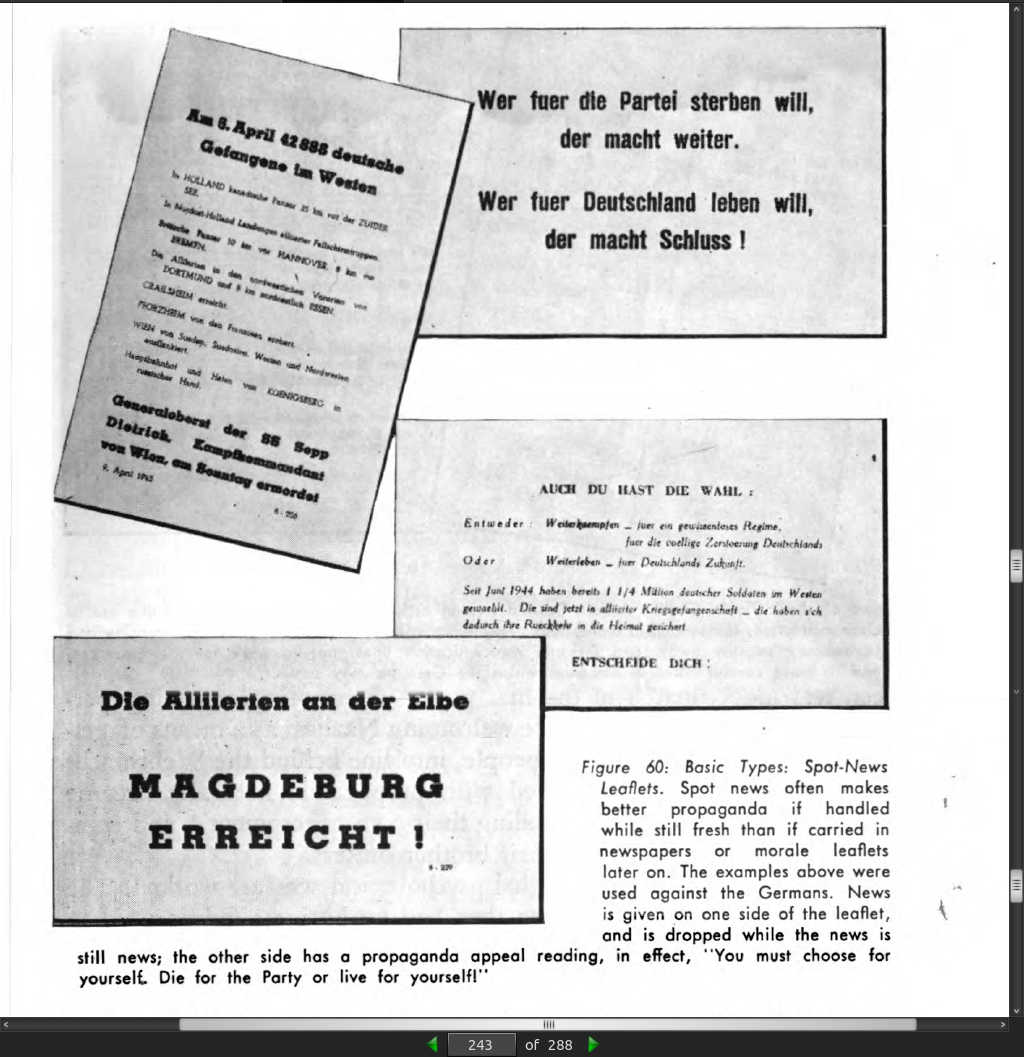
page 244:
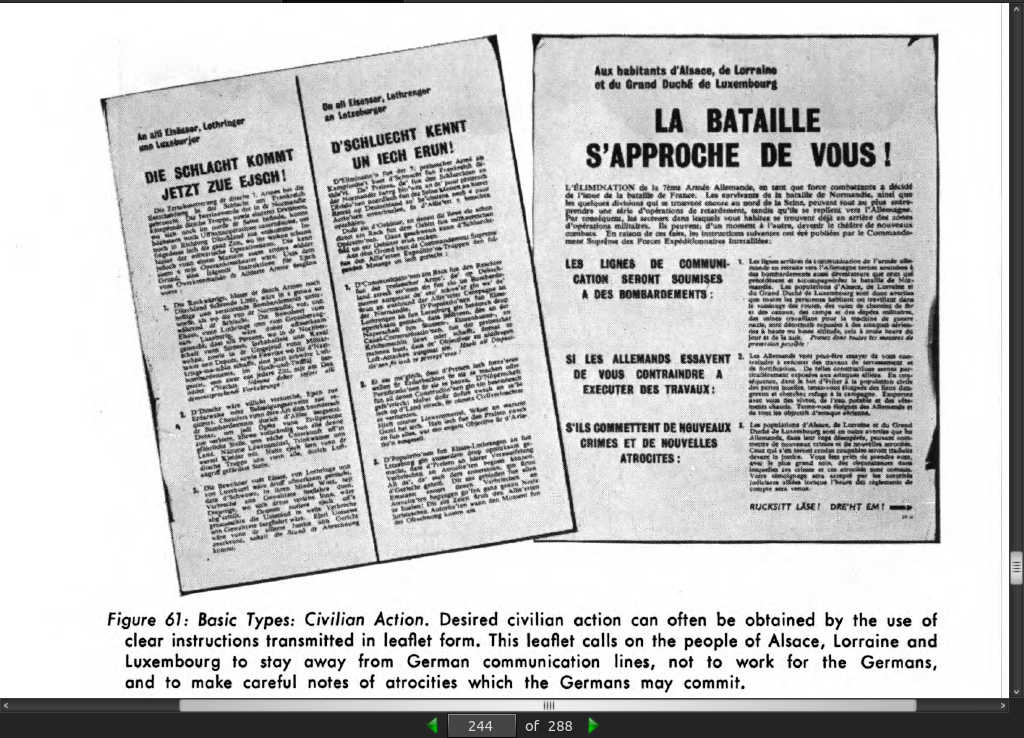
page 246:
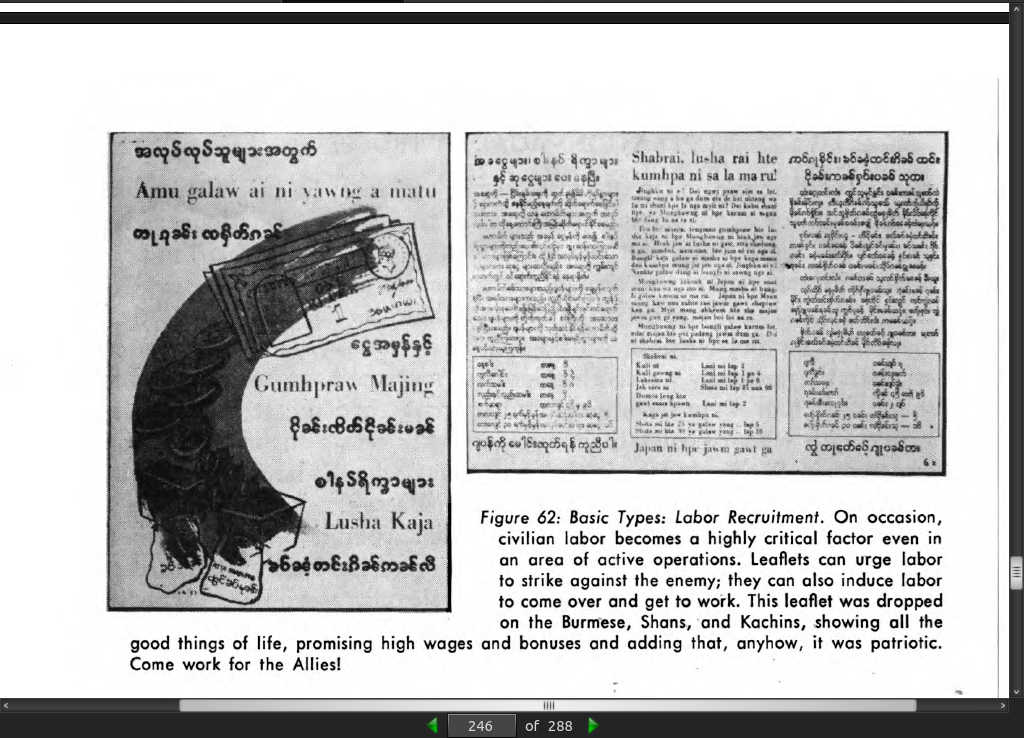
page 247:
- [Psychological warfare] is directed at the mind of the target audience, at creating attitudes of belief or doubt which lead to the desired action.
page 253:

page 254:
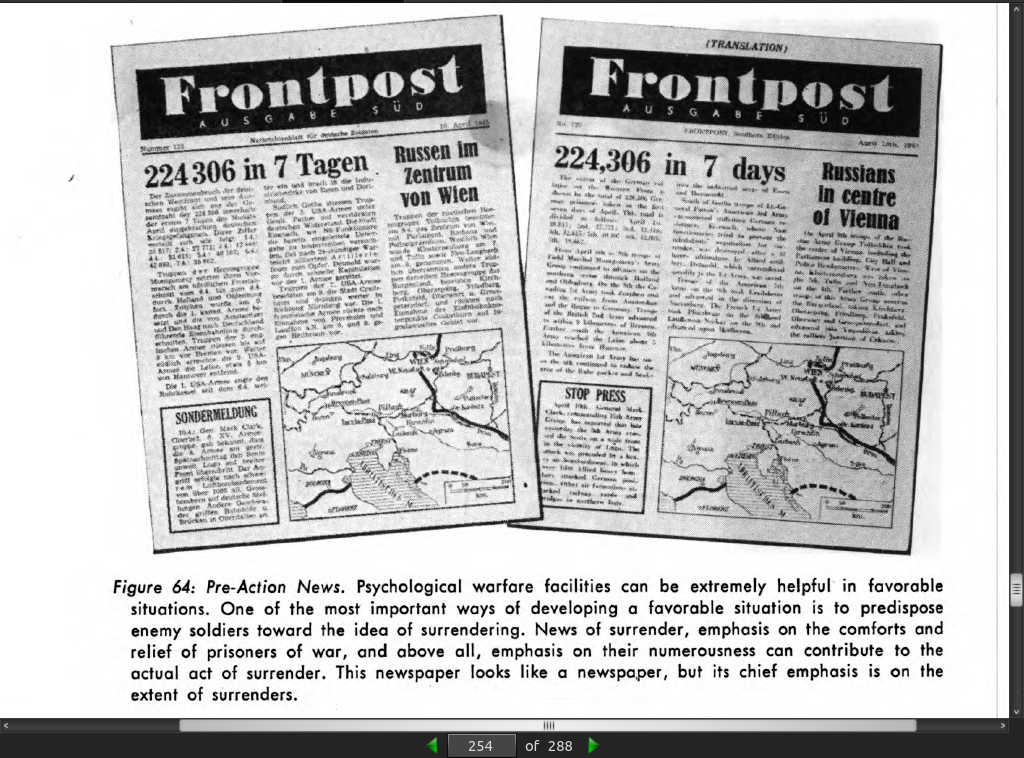
page 255:
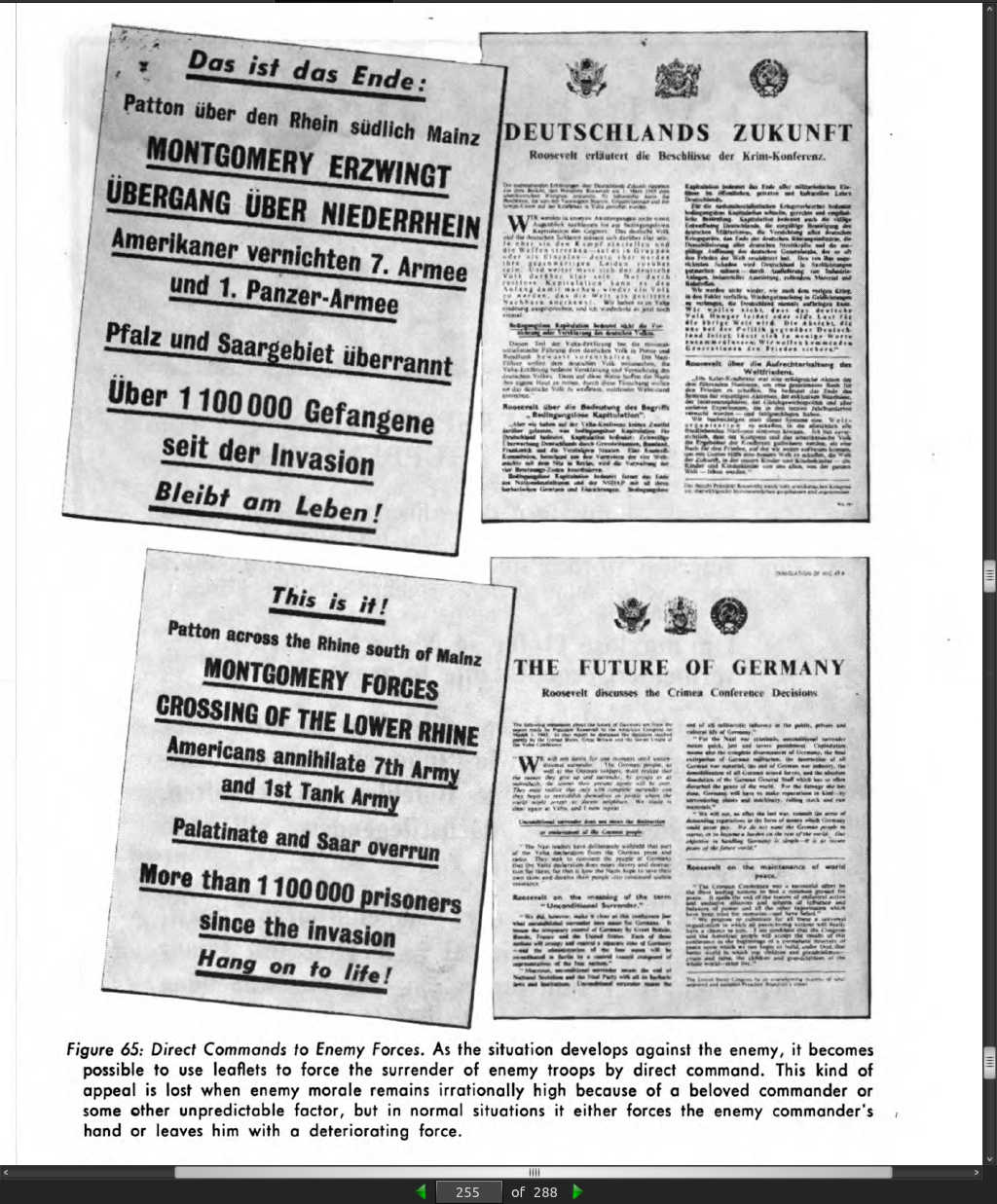
page 256:
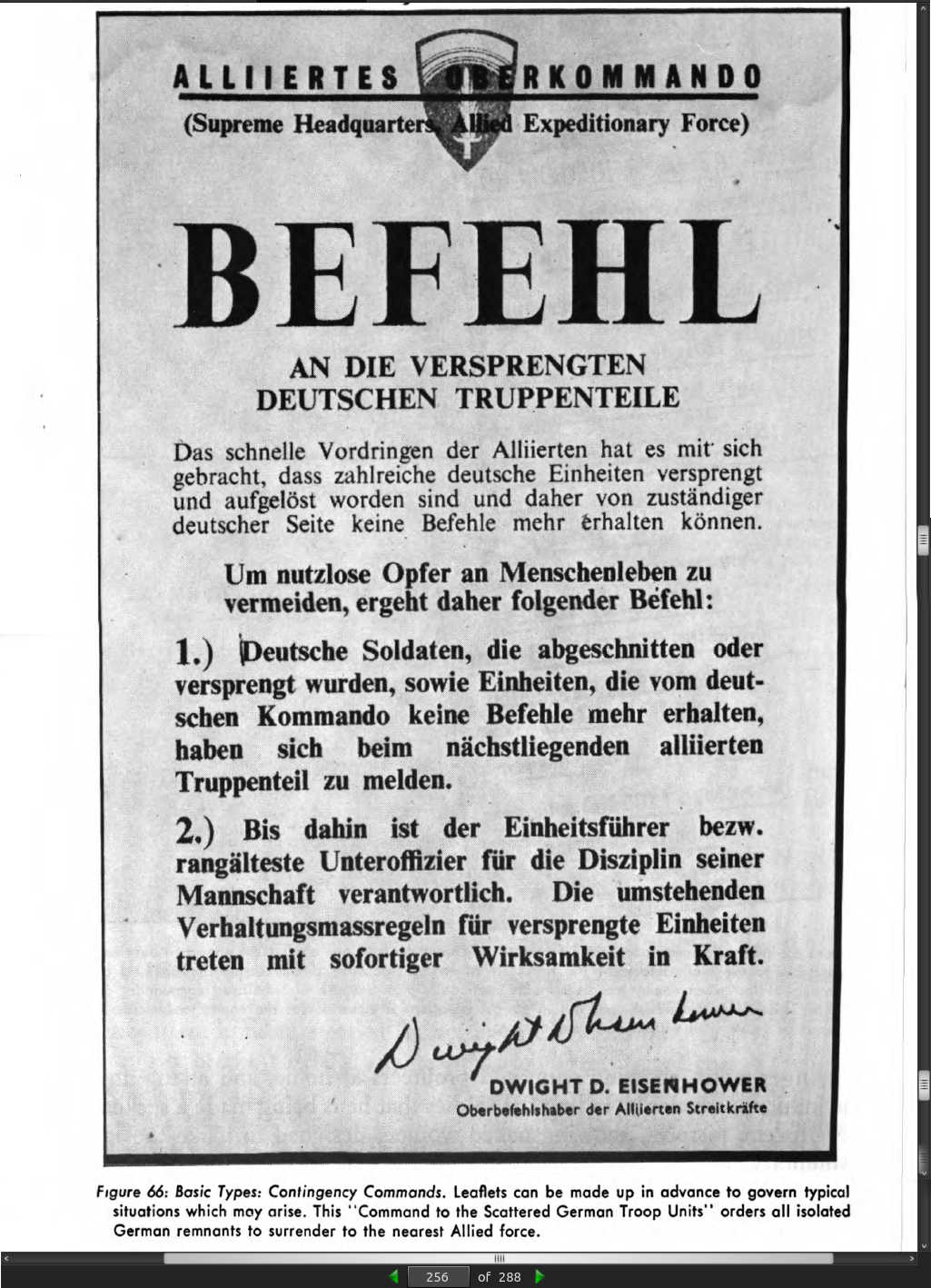
page 257:
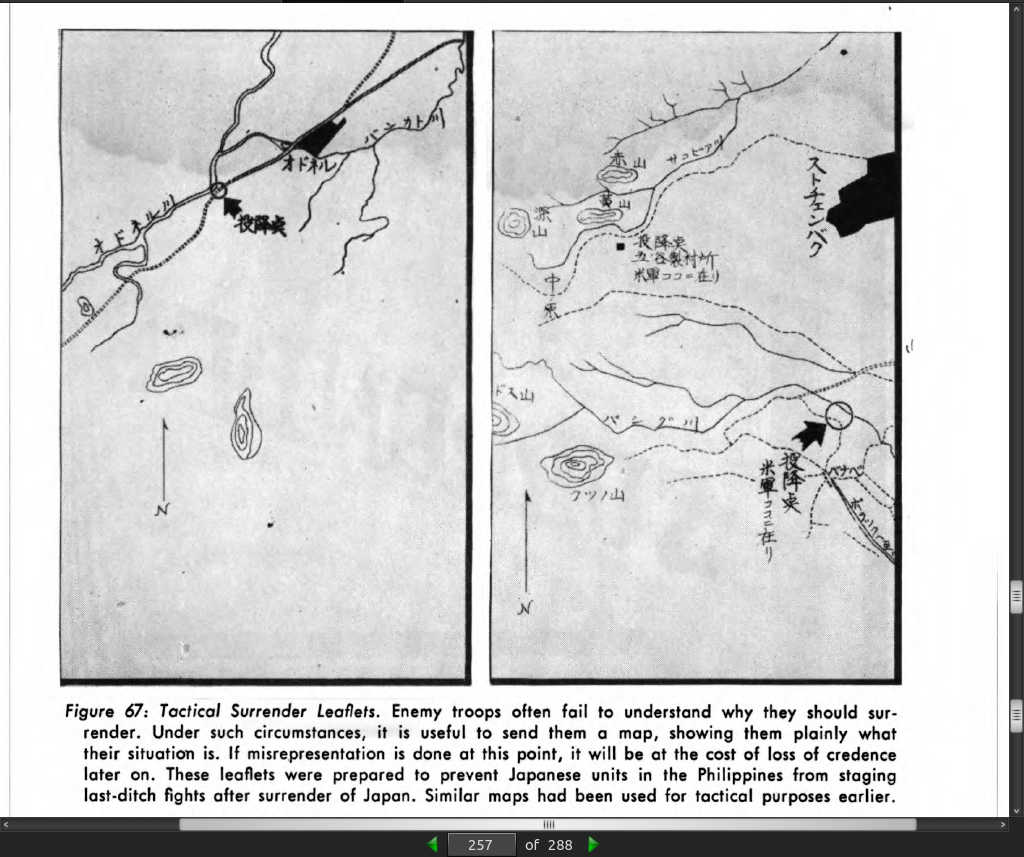
page 259:
- A bluff normally fails, and moreover discredits later operations of the same
kind, whereas a successful and fulfilled threat builds up cumulative
credibility among the enemy audience.
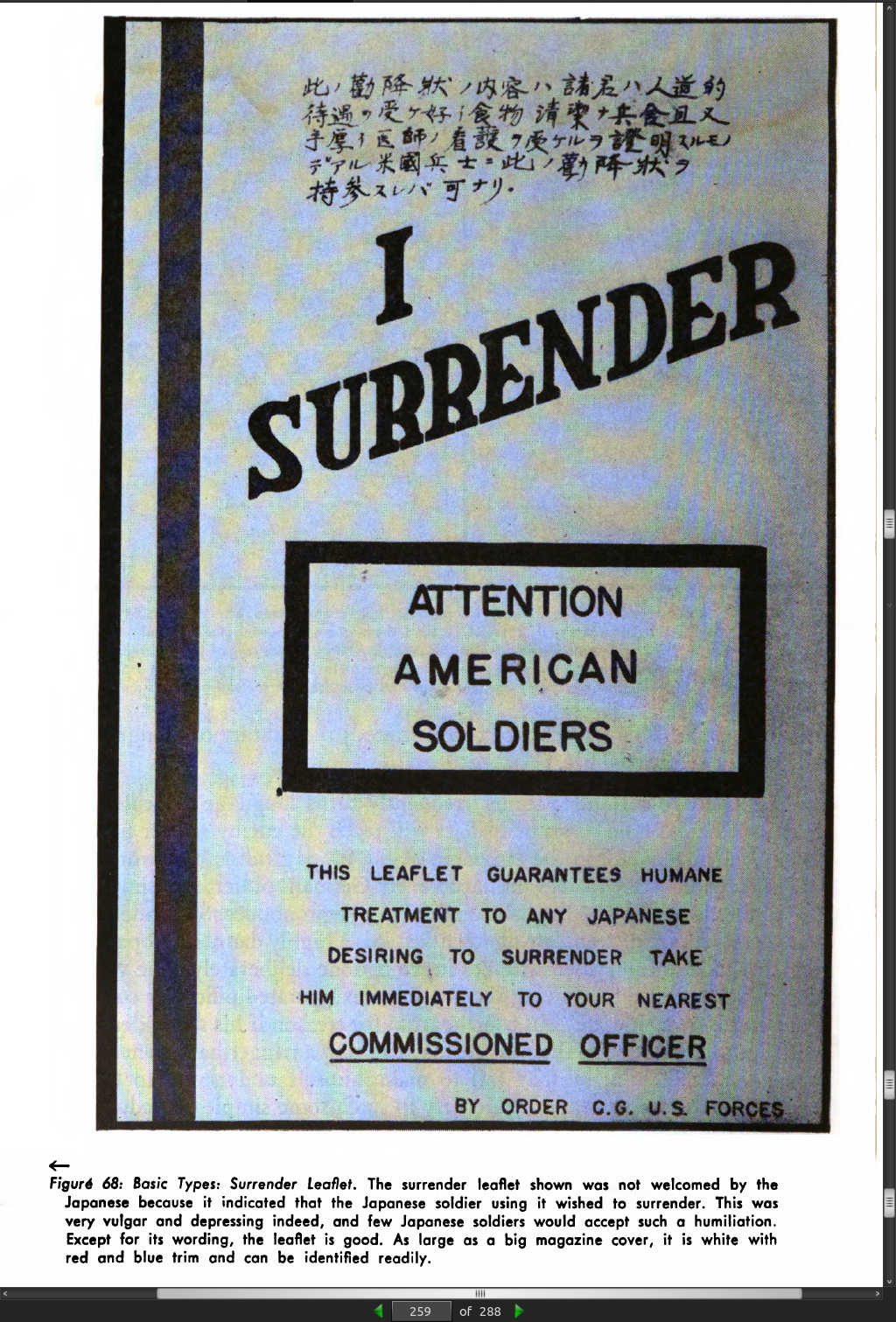
page 261:
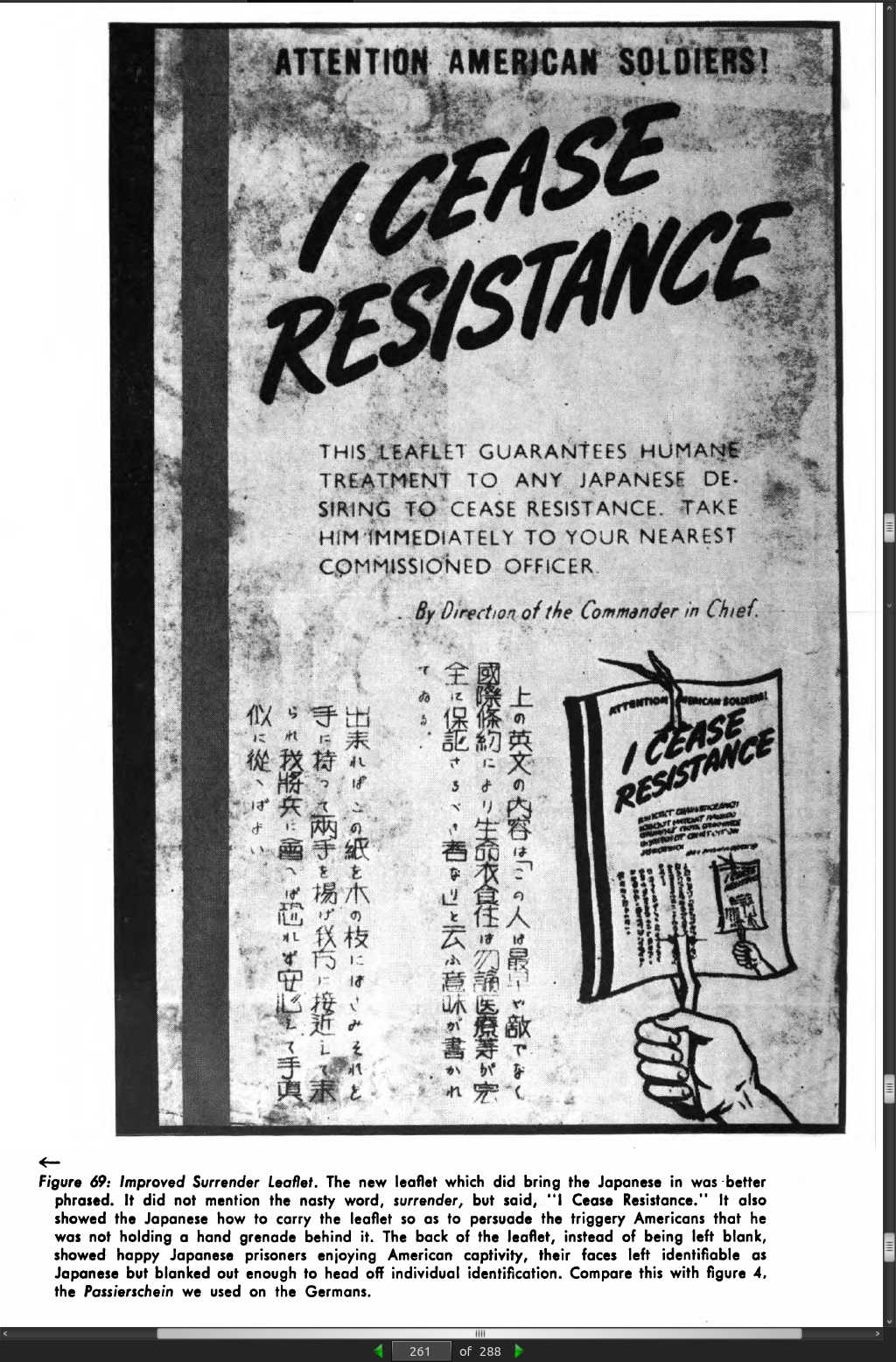
· Chapter 14: Psychological Readiness and Disarmament
page 264:
- In the hands of the wrong persons, systematic psychological warfare is capable of being converted into a drastic instrument of domestic confusion; certain techniques of it could even be used for crime. On the broader, international scale, “warfare psychologically waged” by a total state against a free one can be an instrument both vile and effective, achieving its victories by exploiting the peacefulness, indecision, and disunity of its victims. It is a shameful thing to see a proud and brave people reduced to such a state of humiliation that they can be easily enslaved. “Warfare psychologically waged” with a long, sickening, uncertain pre-belligerent stage of intimidation and appeasement could suck the vitality even out of America before the next aggressor got ready to release real weapons against us.
page 265:
-
The most powerful countermeasure to hostile pre-belligerent at tack is high national morale, and morale in turn depends on the mental, emotional, and physical health of a people. (If it were not impious, in so secular a book, one might say it depends on their spiritual grace.) If the people themselves are well behaved; if they live without strain; if they think hatred is silly and fury a waste of time; if they trust one another’s good will ; if capital does not expect a Red purge from labor, nor labor a Fascist massacre from capital; if the high officers of state and army use moderate language for everyday business, so that when true crisis comes they can cry “Wolf!” and be believed — if such conditions are fulfilled in part, the people will withstand psychological attack.
-
It cannot be expected that the next enemy will oblige us by making a blunder like Pearl Harbor, electrifying our people with fury and unity. A more artful aggressor will know how to force us into untenable positions without taking responsibility for the showdown himself or he may win by making his first blow so deadly that it can safely be his last.
page 267:
- our overt propaganda should prepare to violate foreign municipal law.
page 268:
- Anybody can convert children to anything by removing the parents.
page 269:
- The important thing about psychological disarmament is the persistence of the effort, the sustaining of pressures that really make for peace.
page 270:
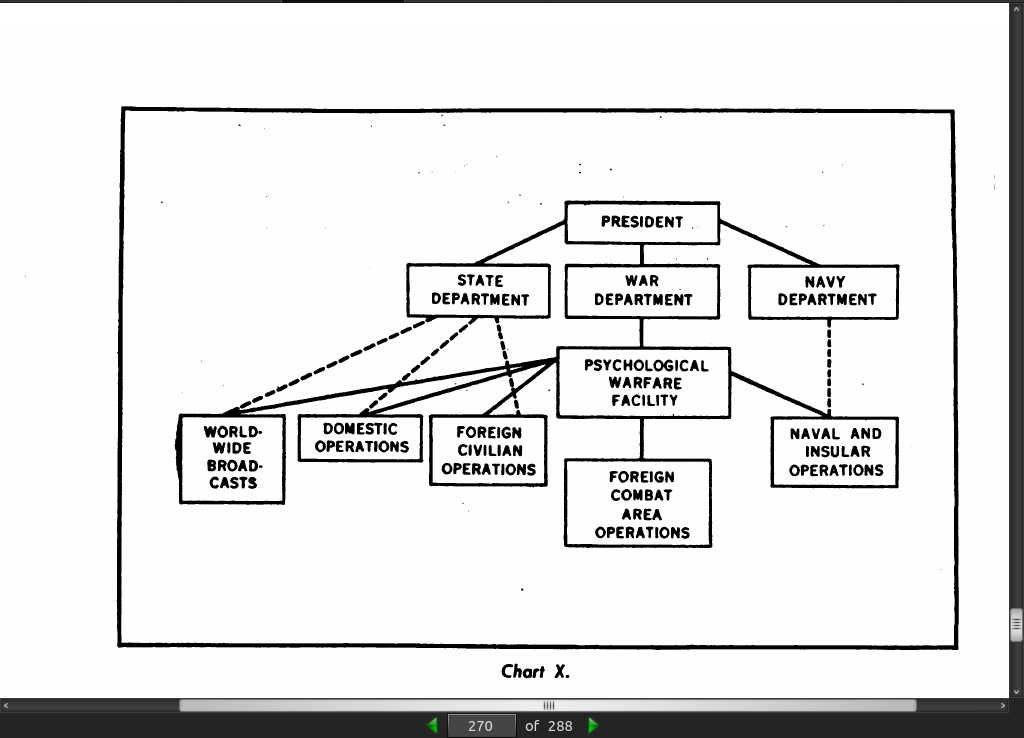
page 272:
- 3 The wartime chief of the Psychological Branch of the Dutch War Ministry warned, in a letter published in the New York Times on June 8, 1947, that the presence of ultra-destructive weapons provided the impetus for an inadvertent war of nerves which was already undoing us. In the first place, we might find that continued stress shocked us into passivity ; secondly, it might rouse aggression as an escape from suspense; third, it might stir up an unconscious craving for doomsday which — though consciously rejected — would have the effect of driving us more and more toward war. The letter is worth study in its entirety The author, whose name is given as A. M, Meerloo, does not appear to have published these comments elsewhere.
